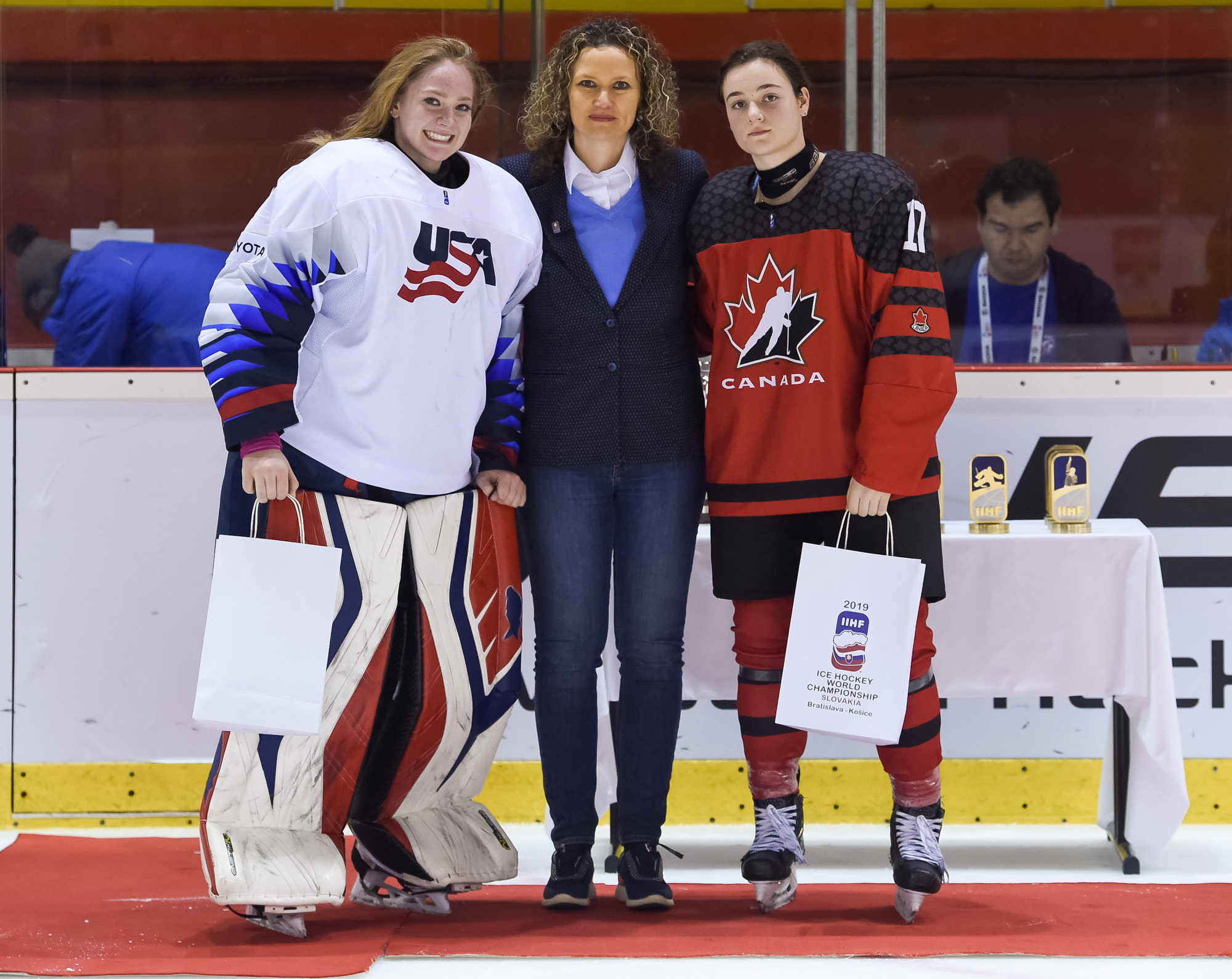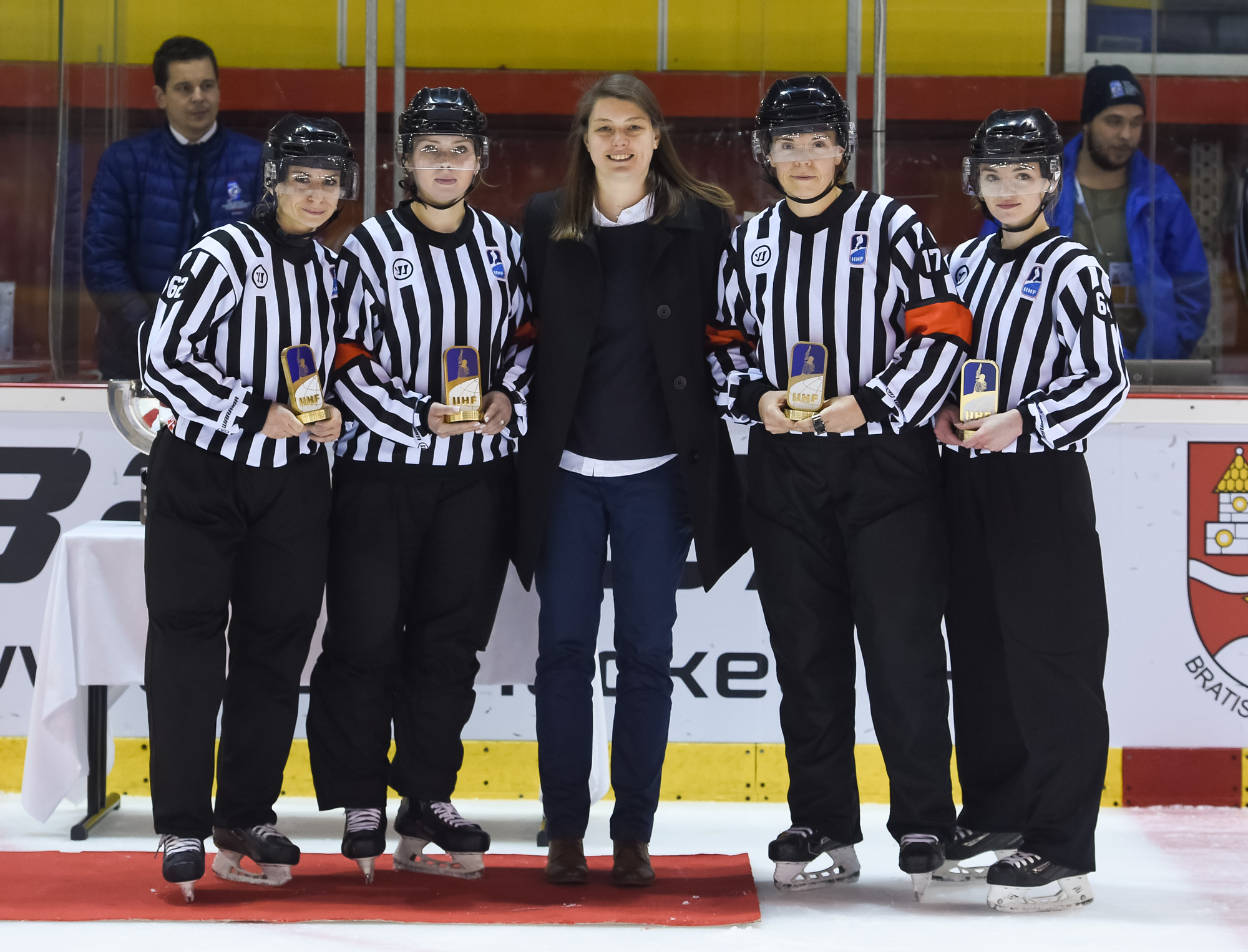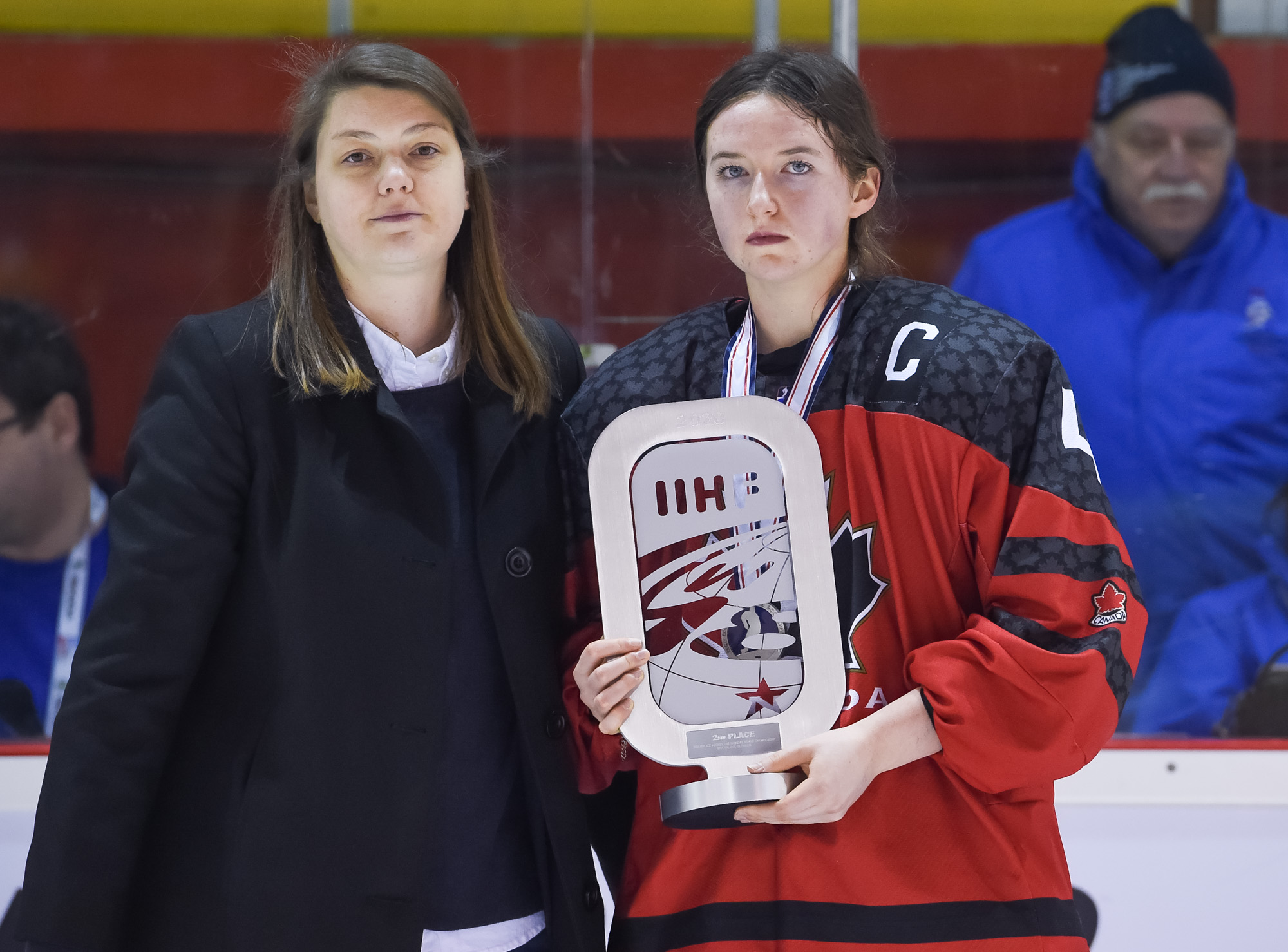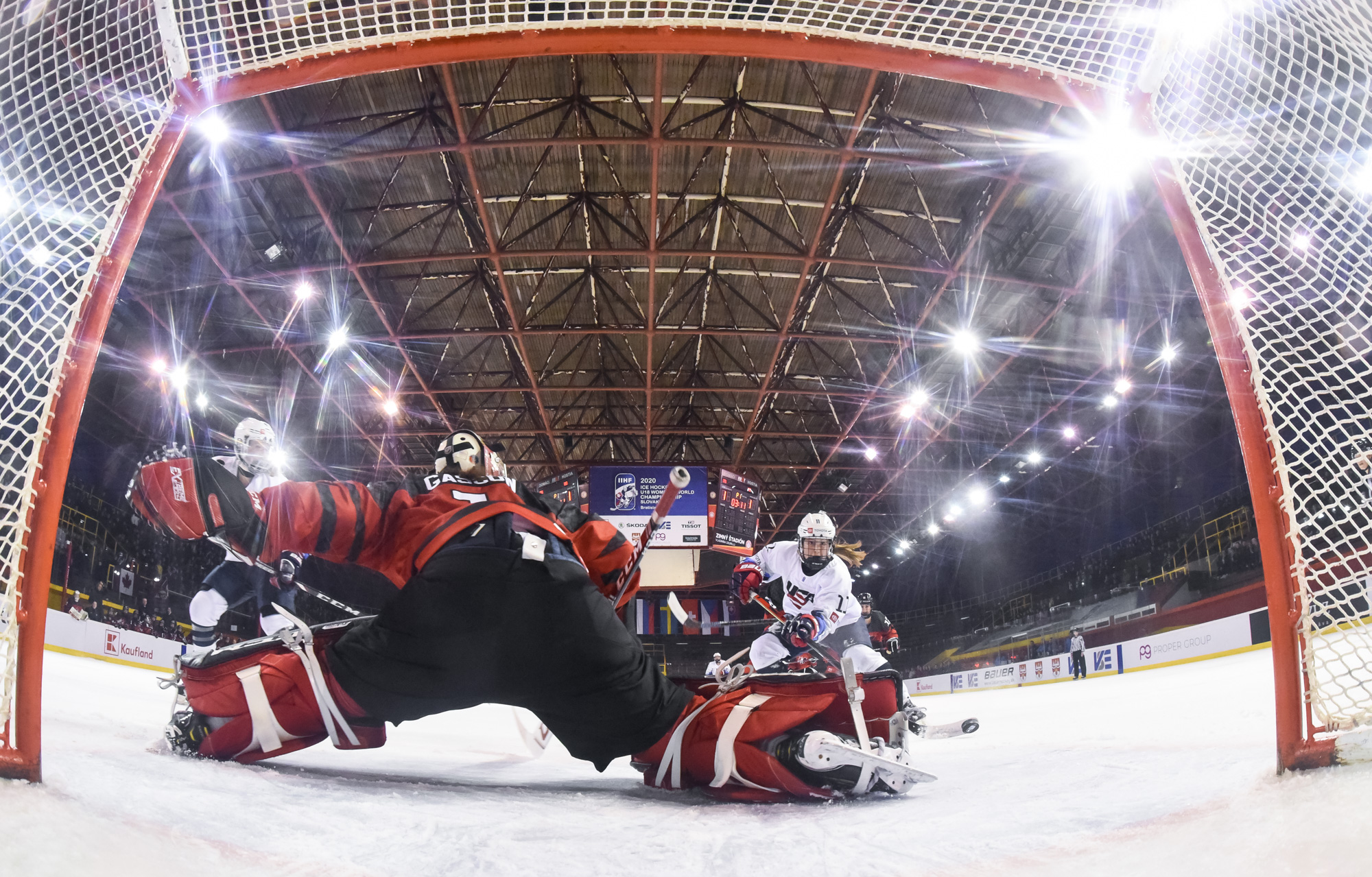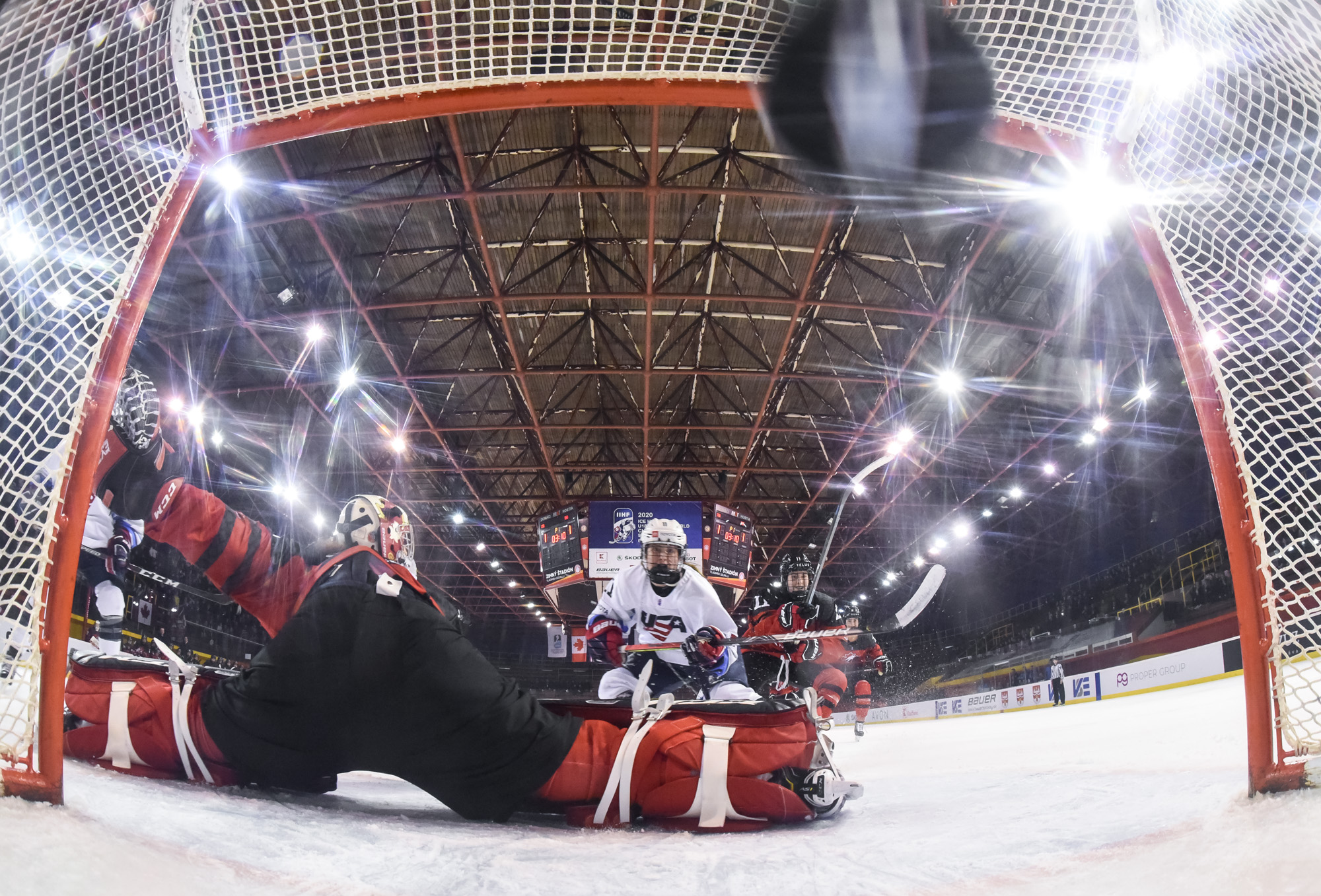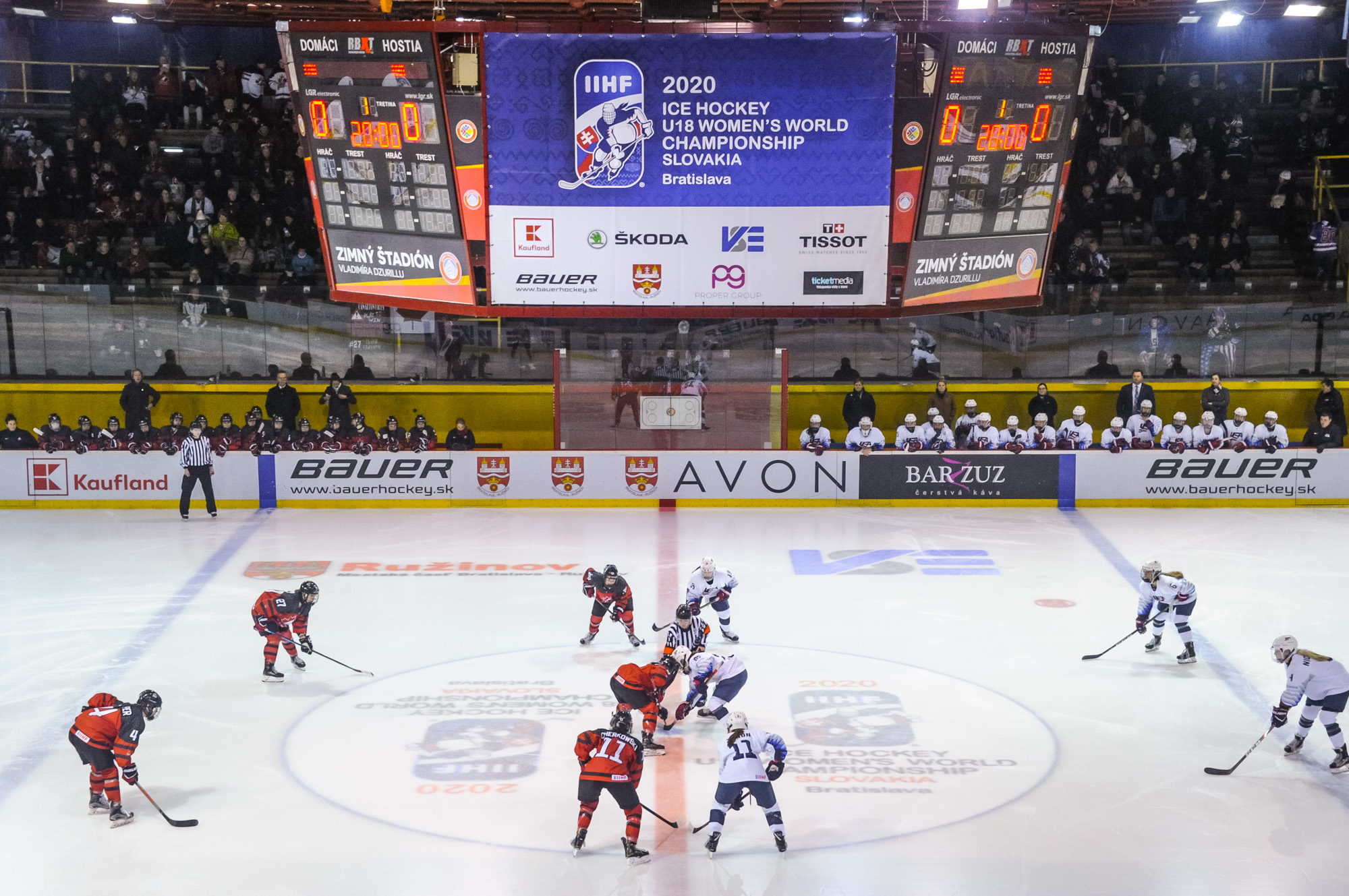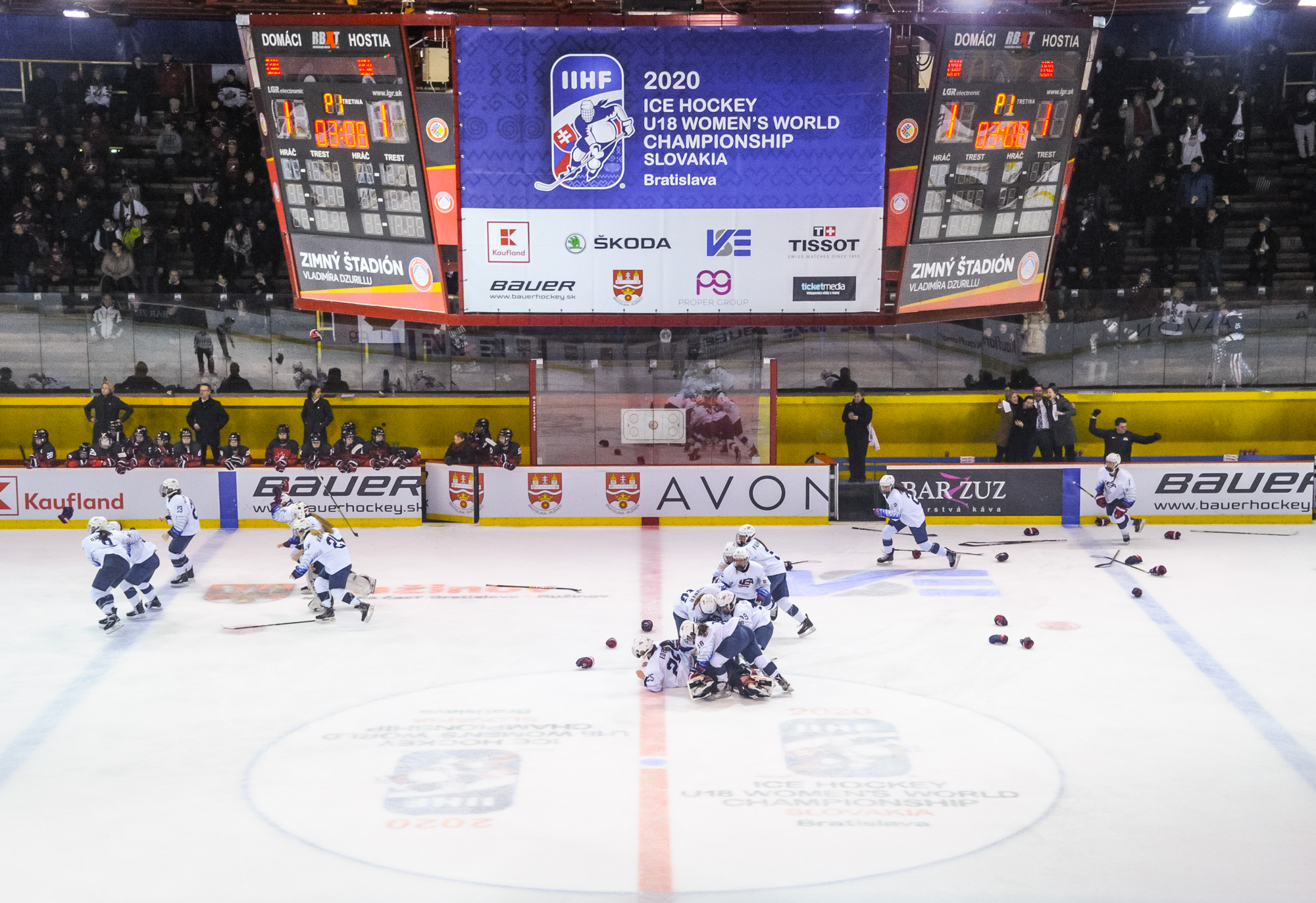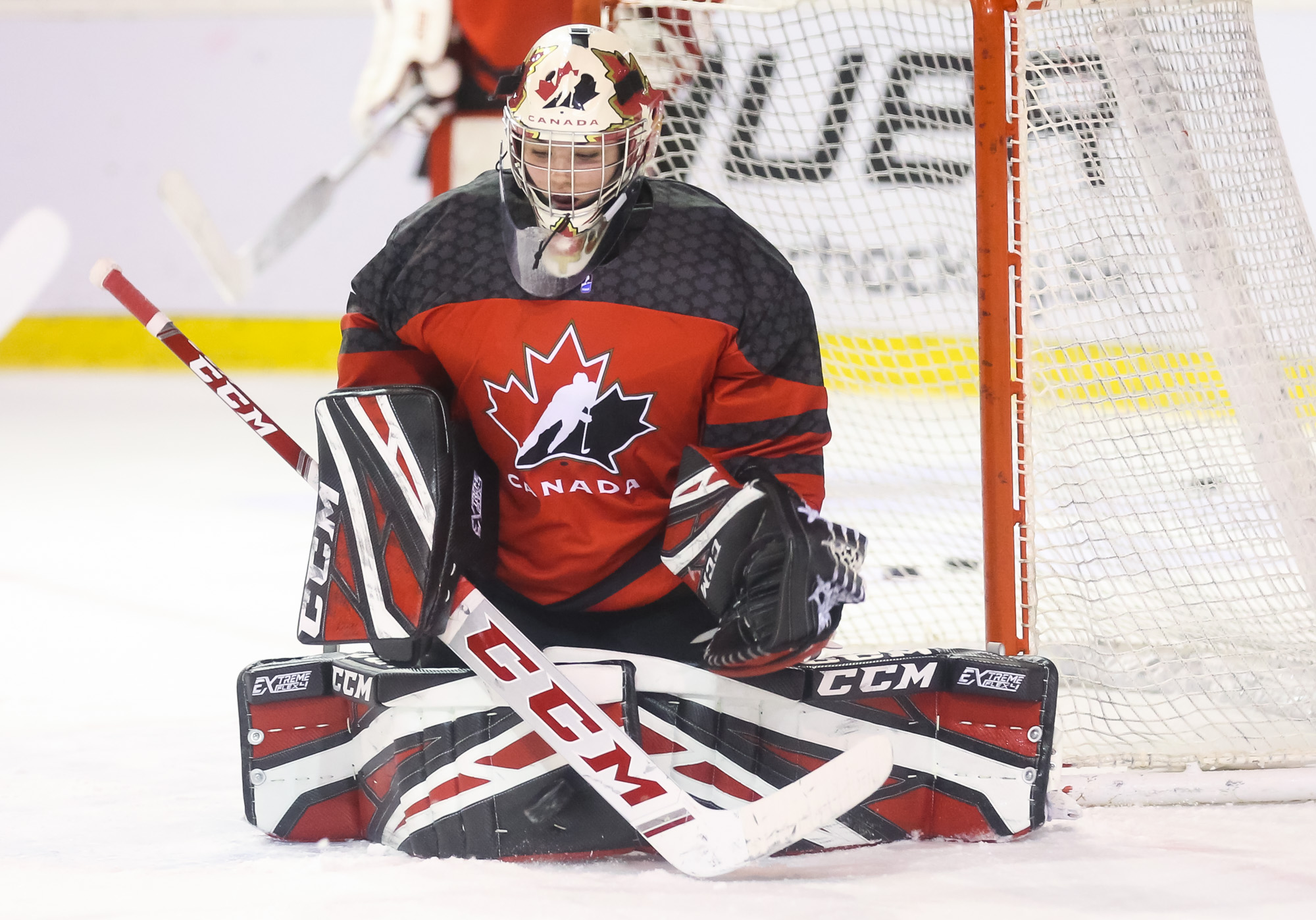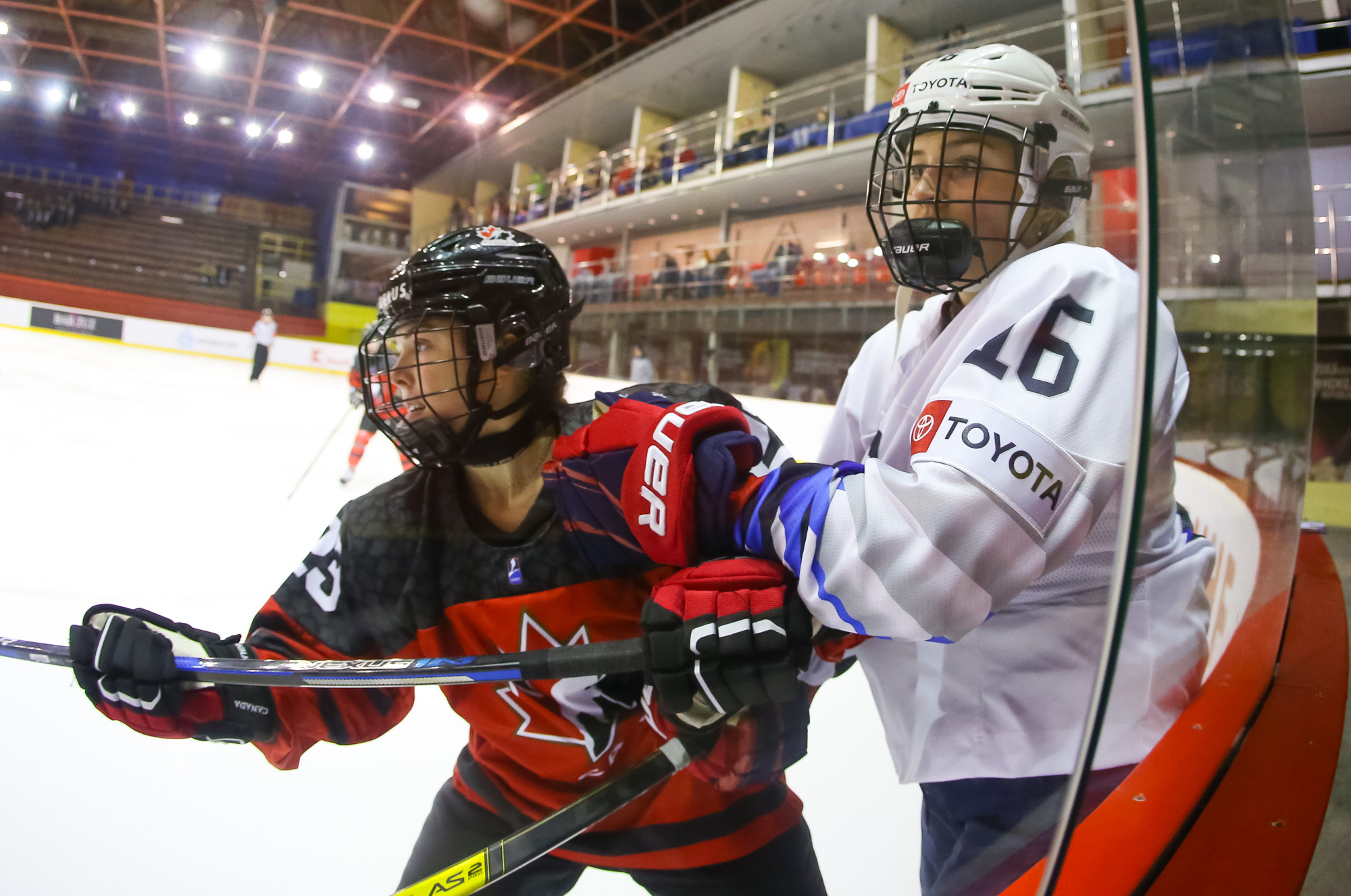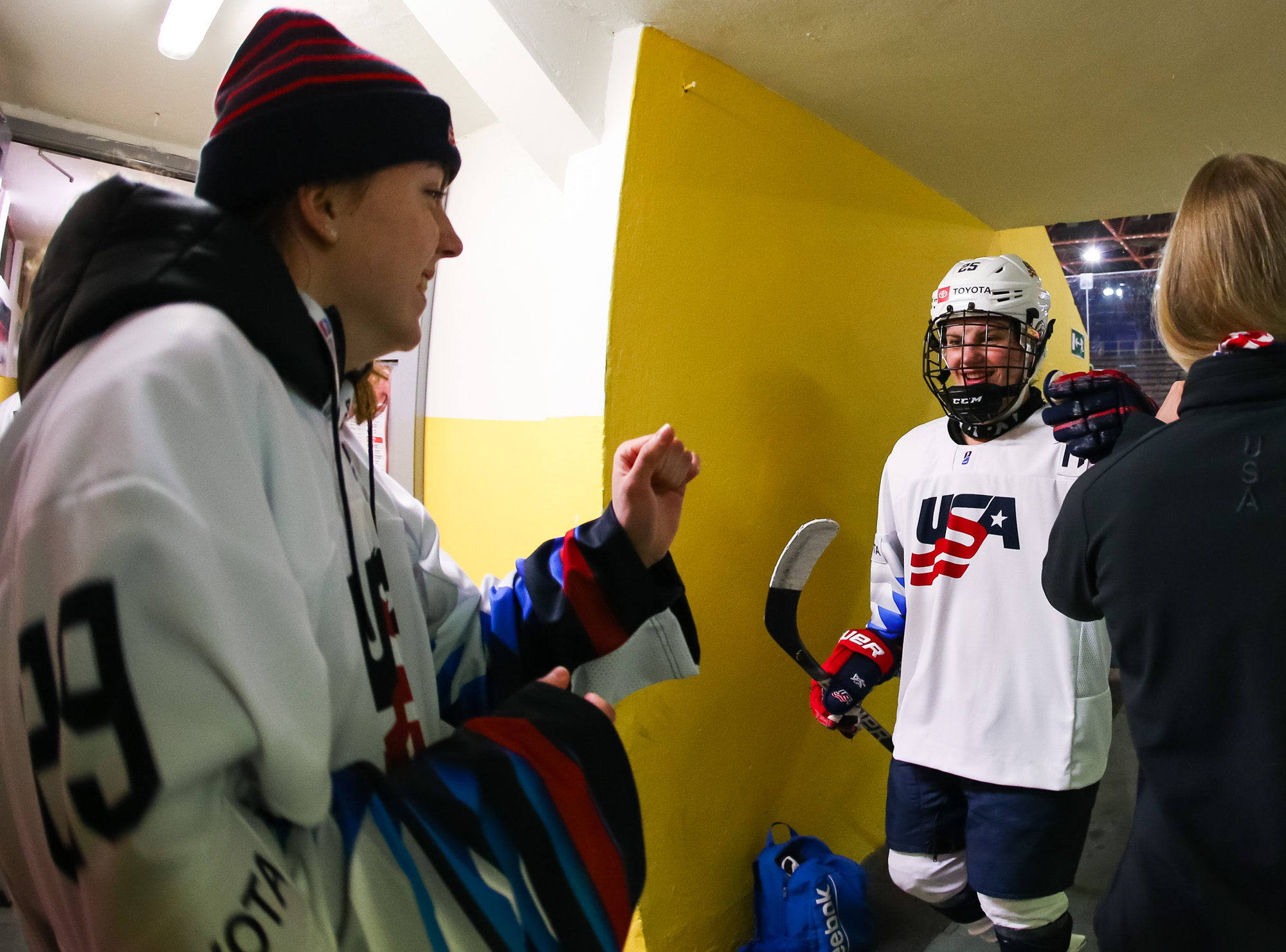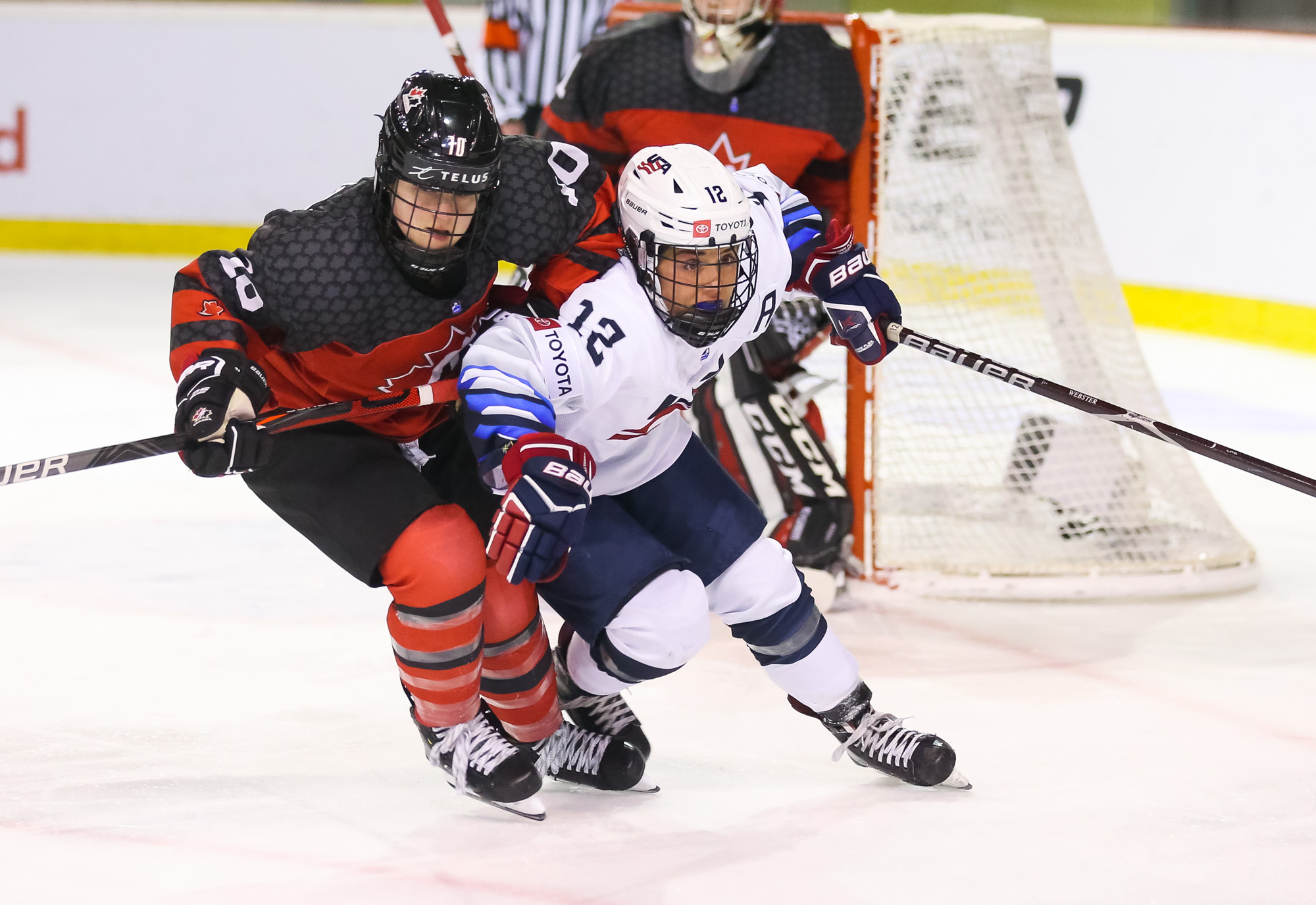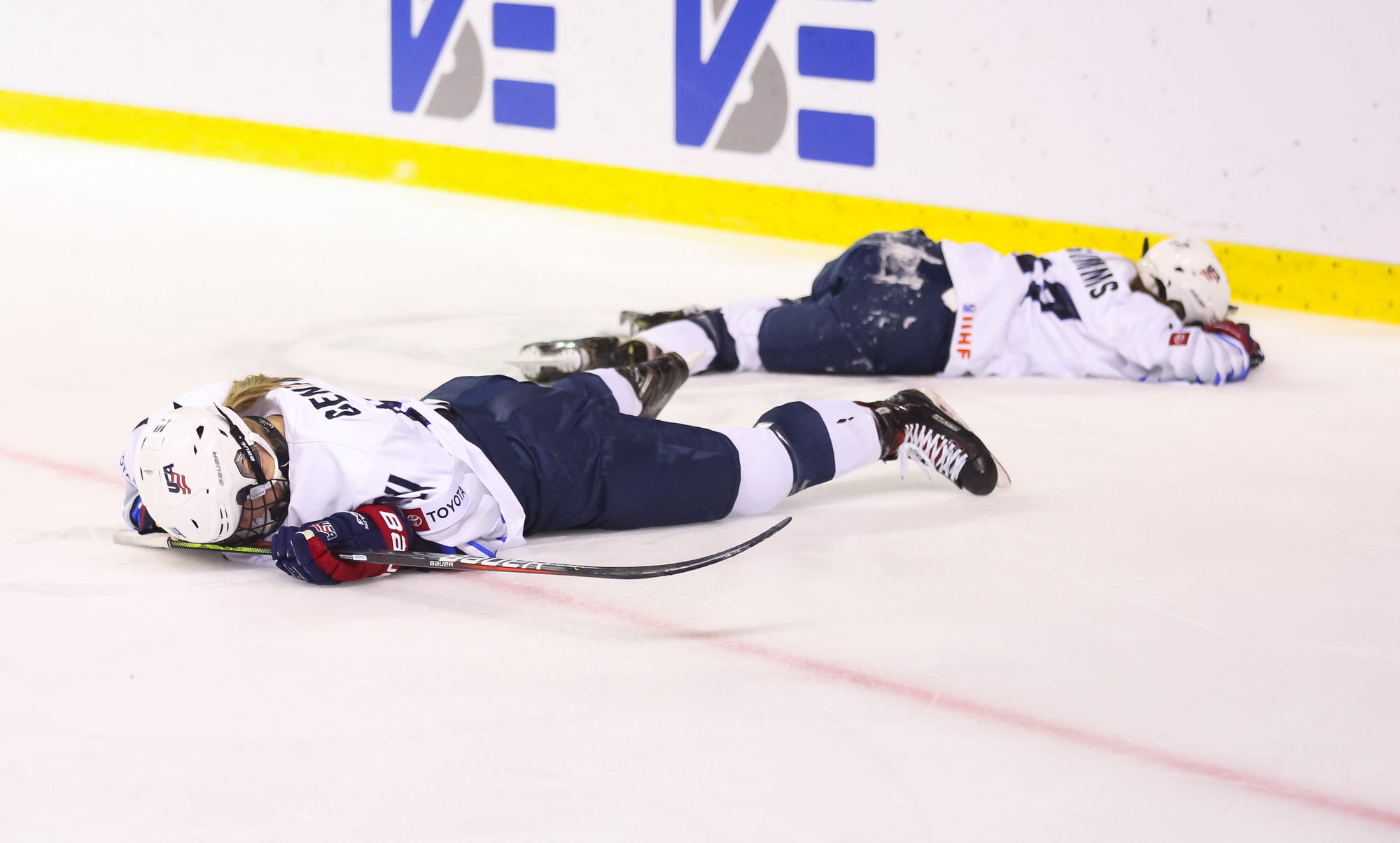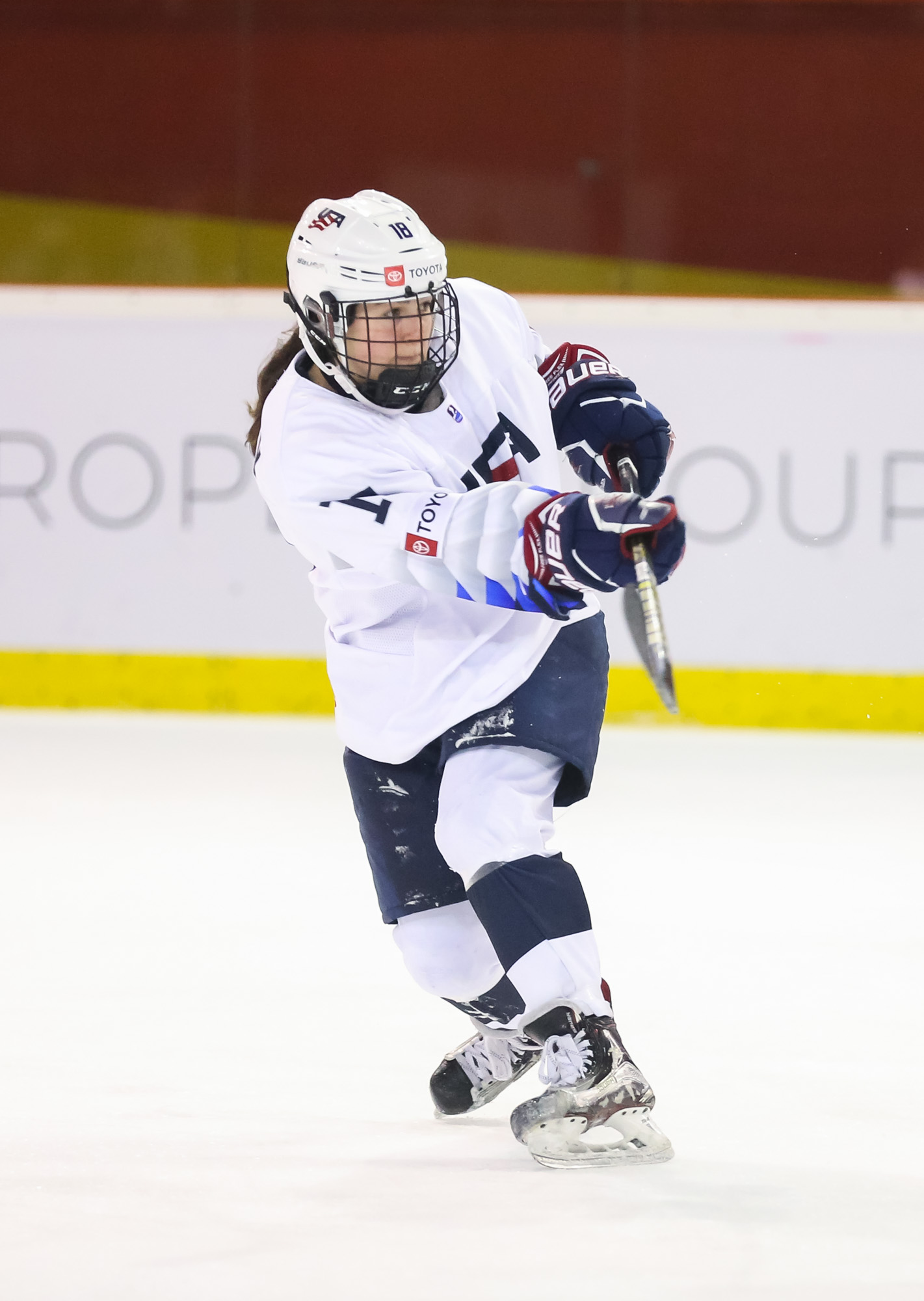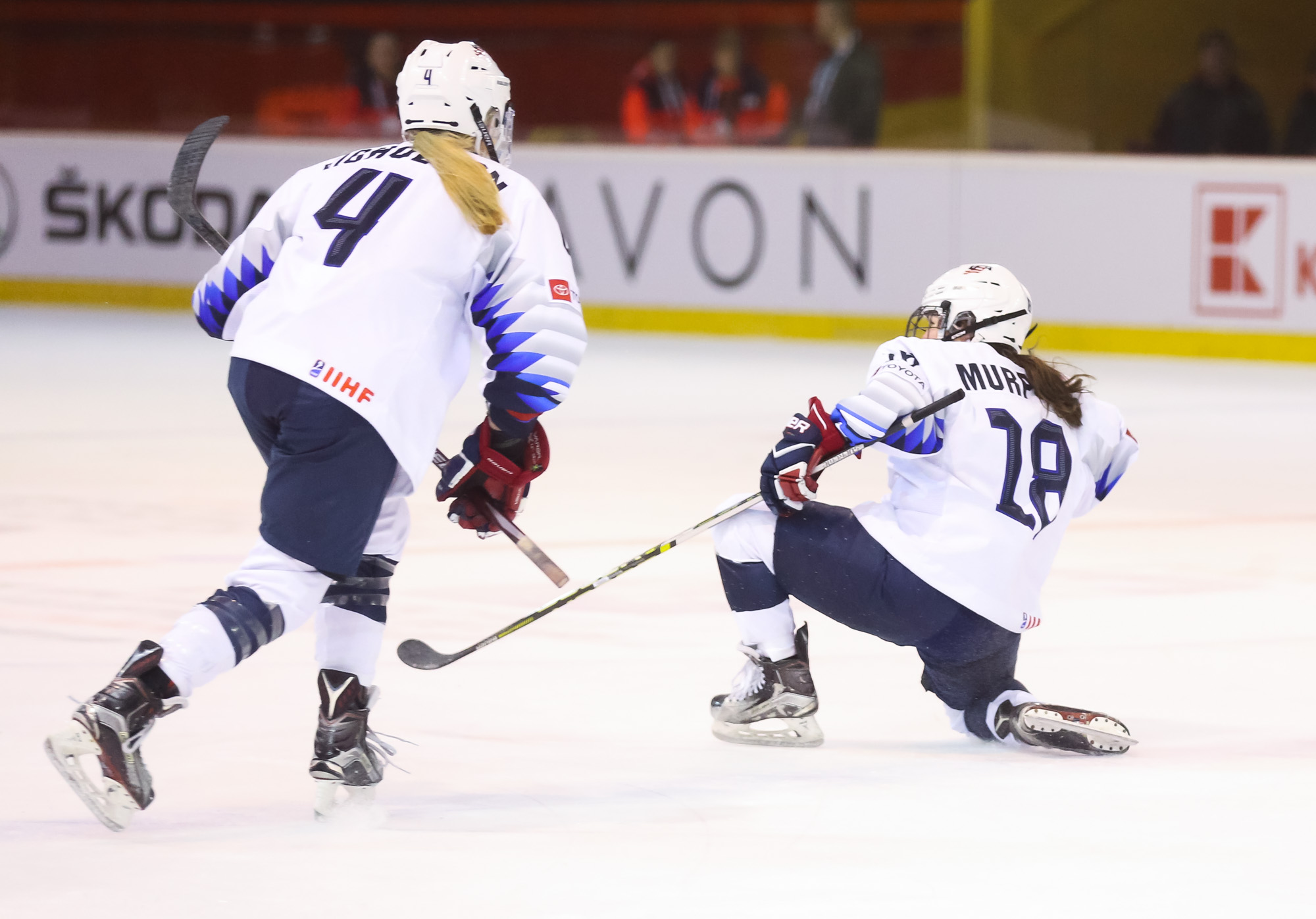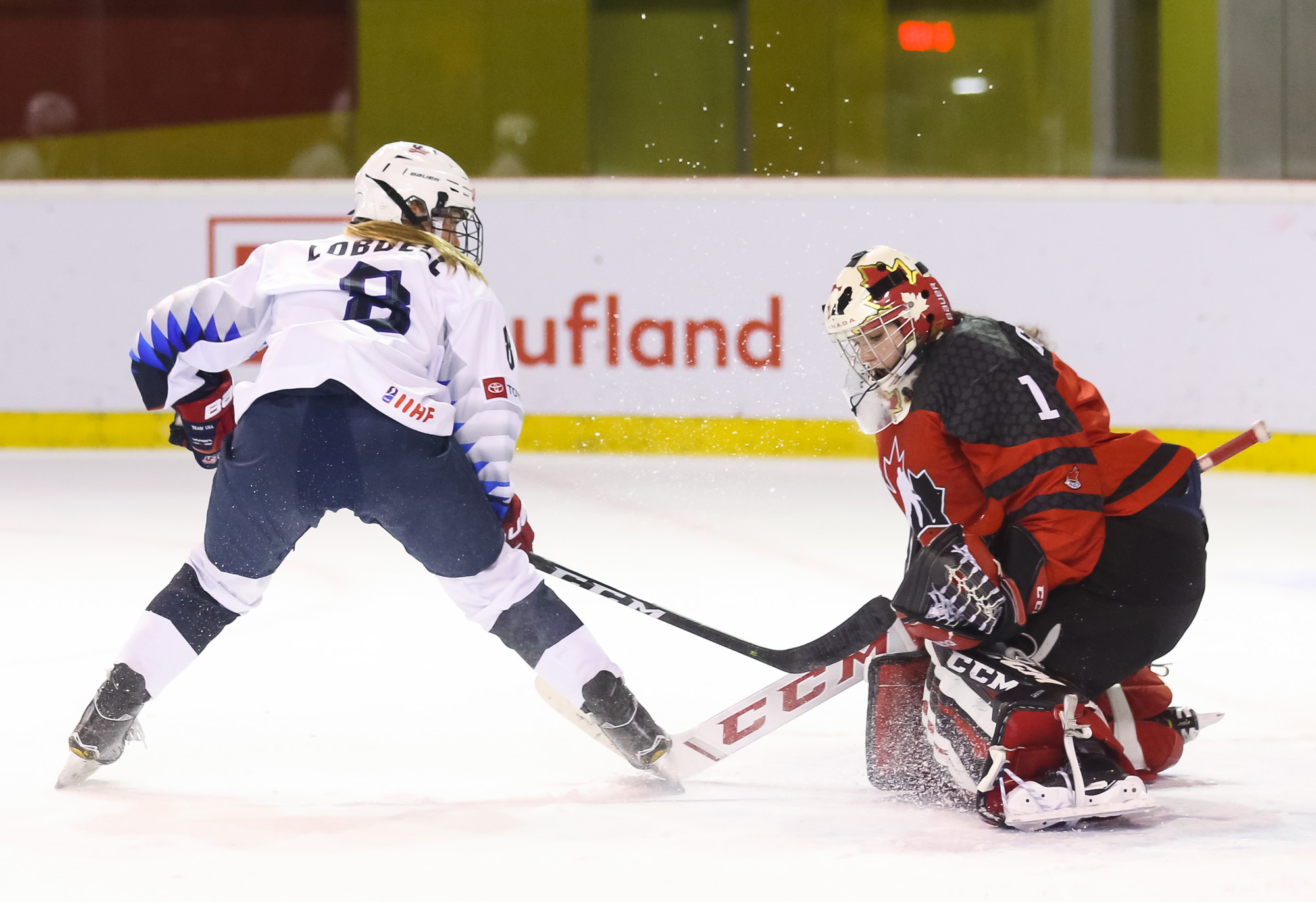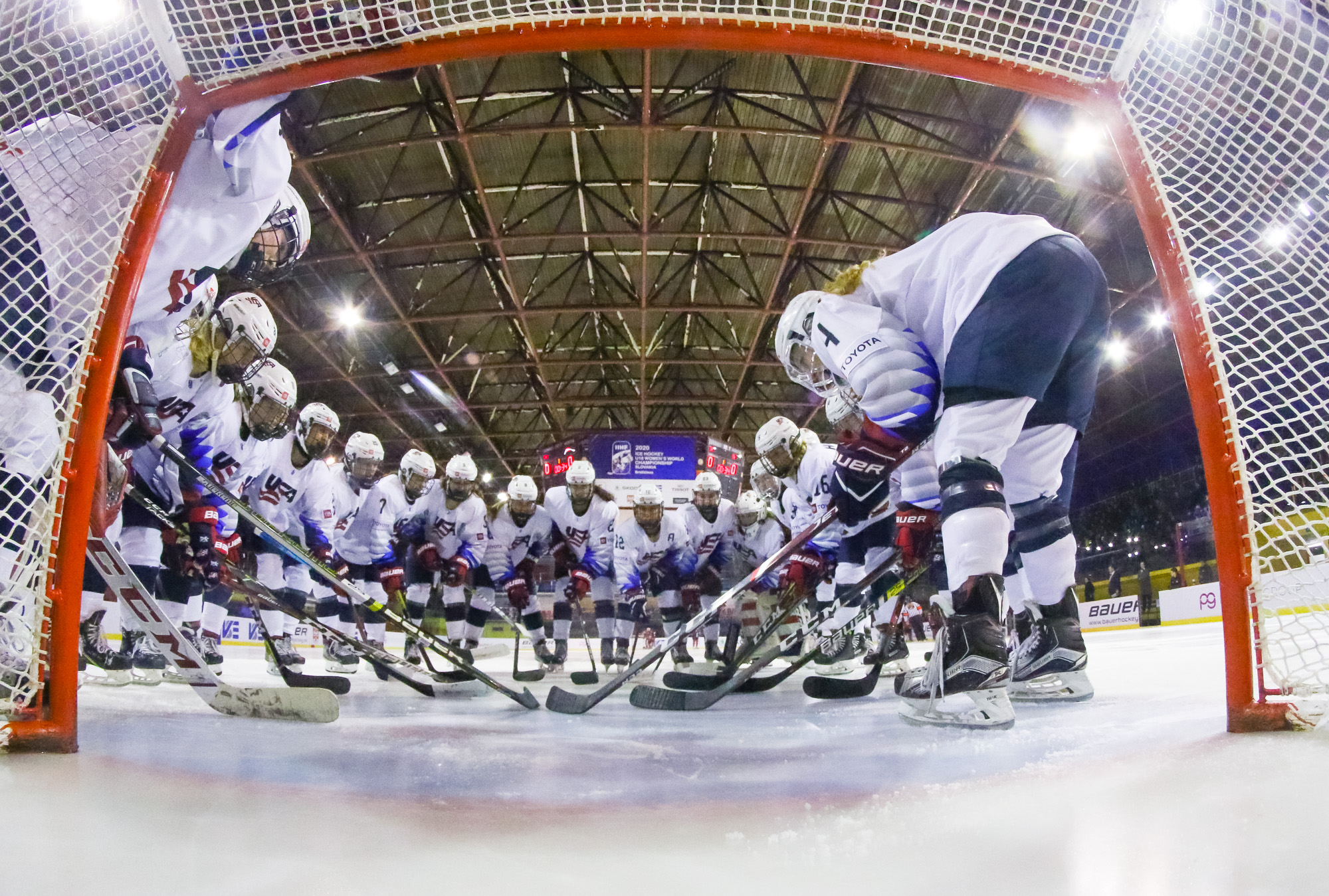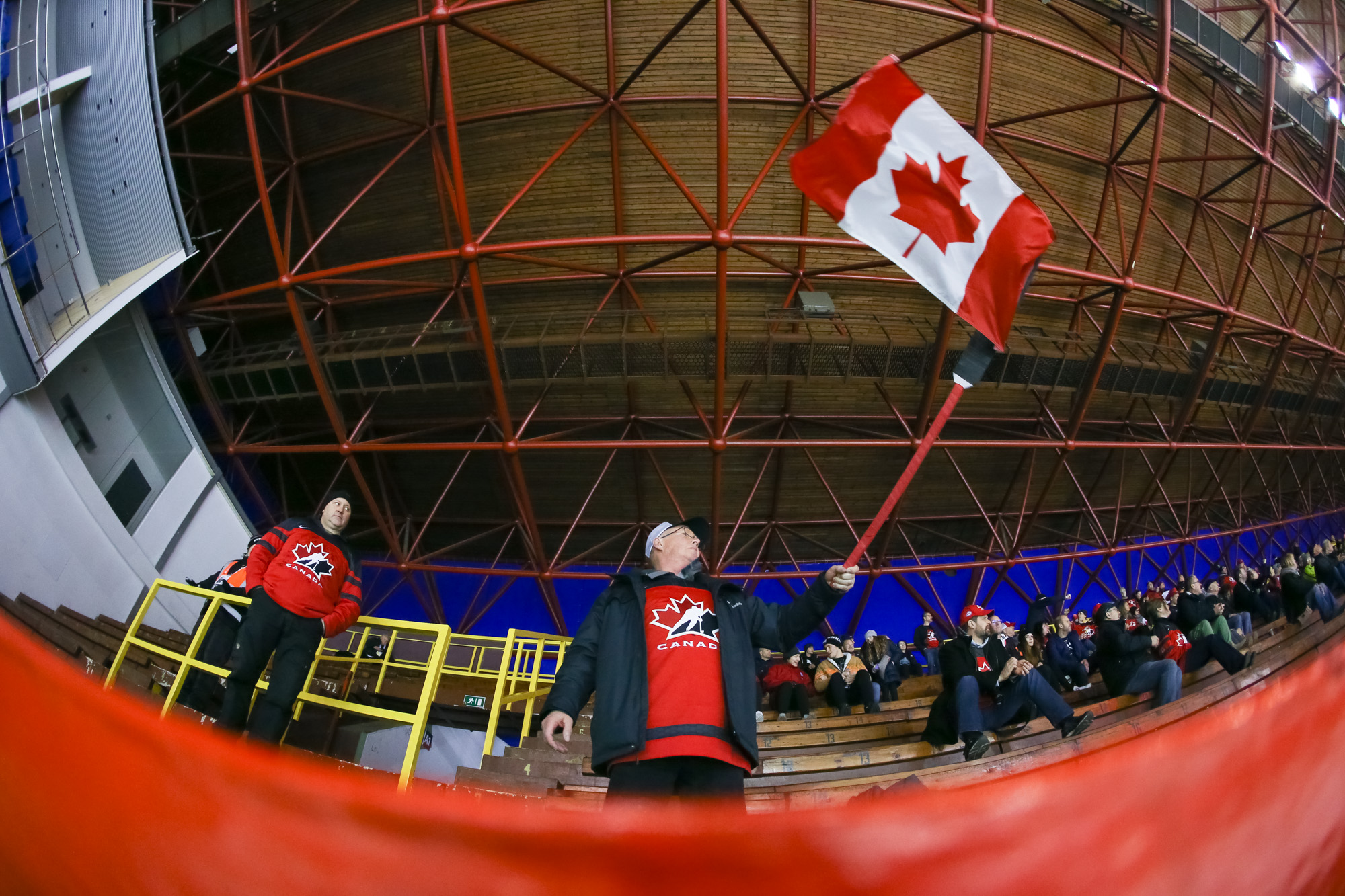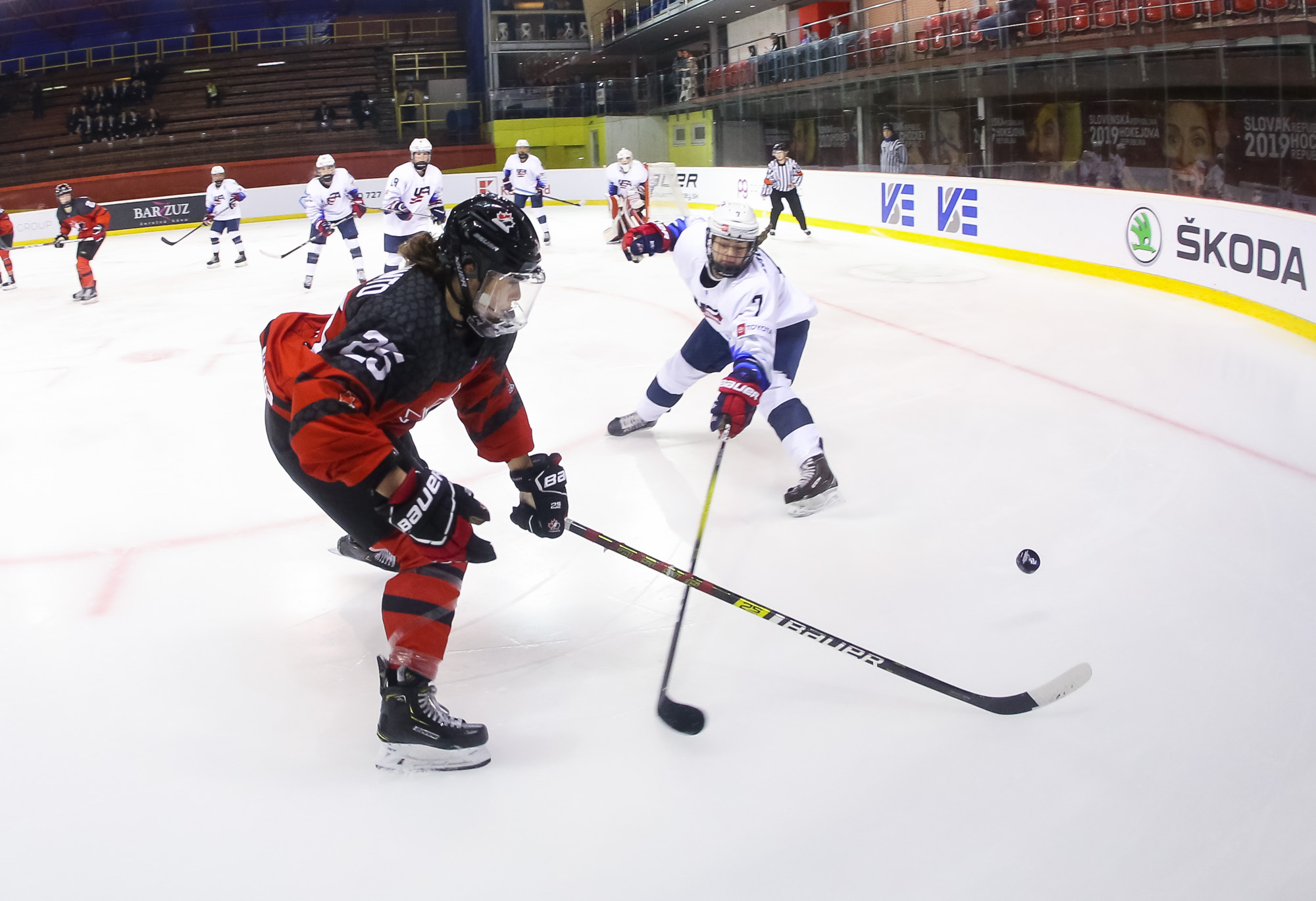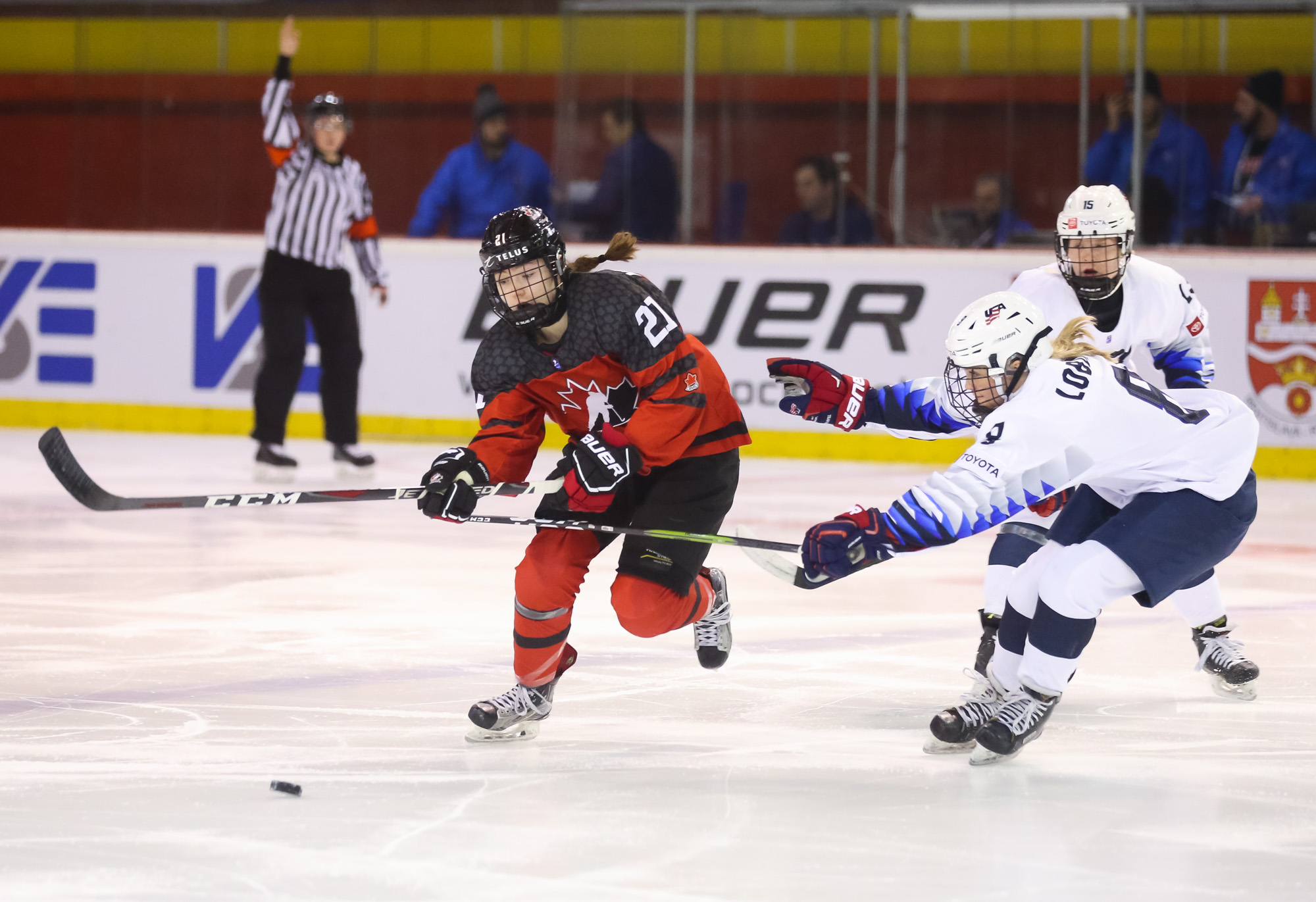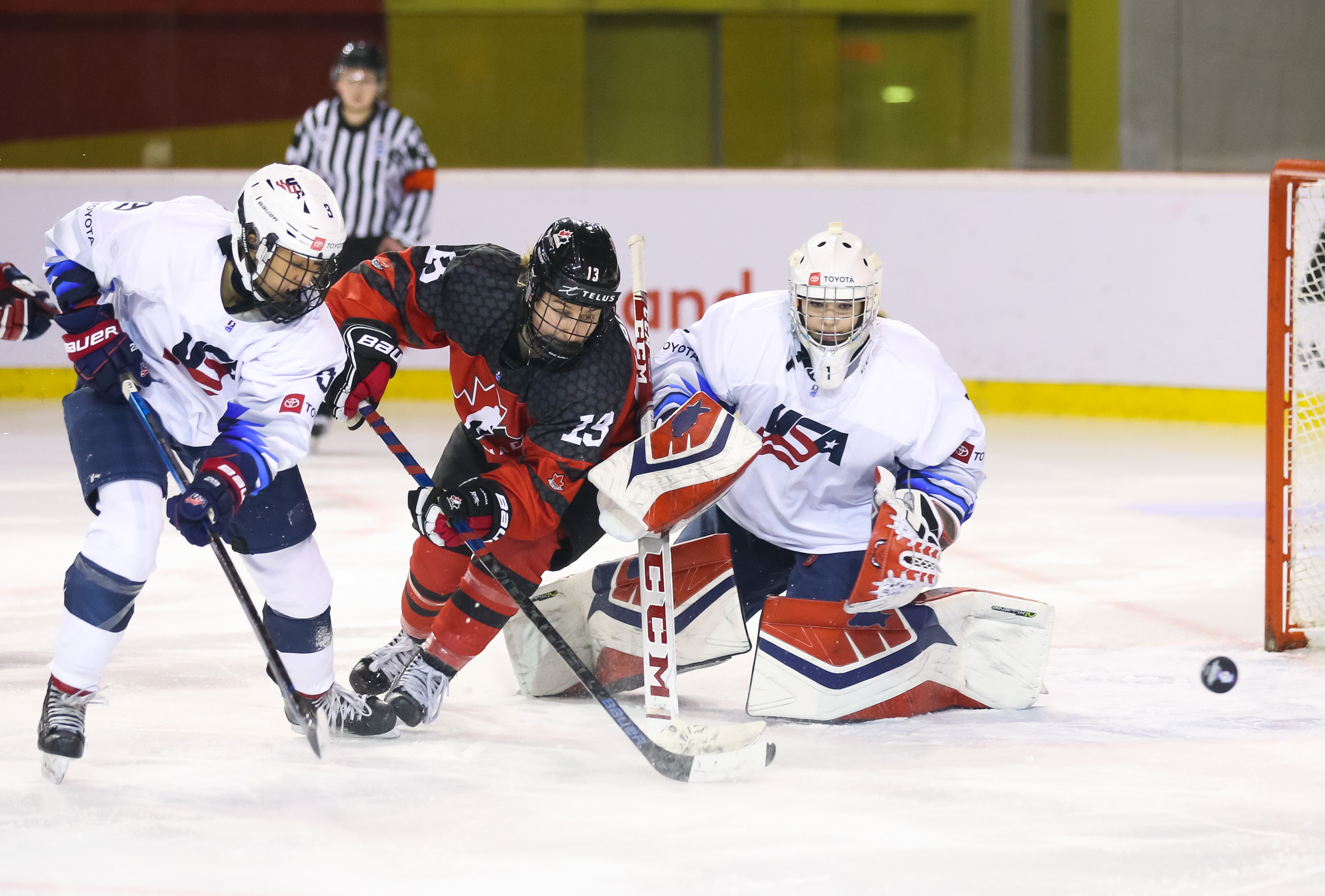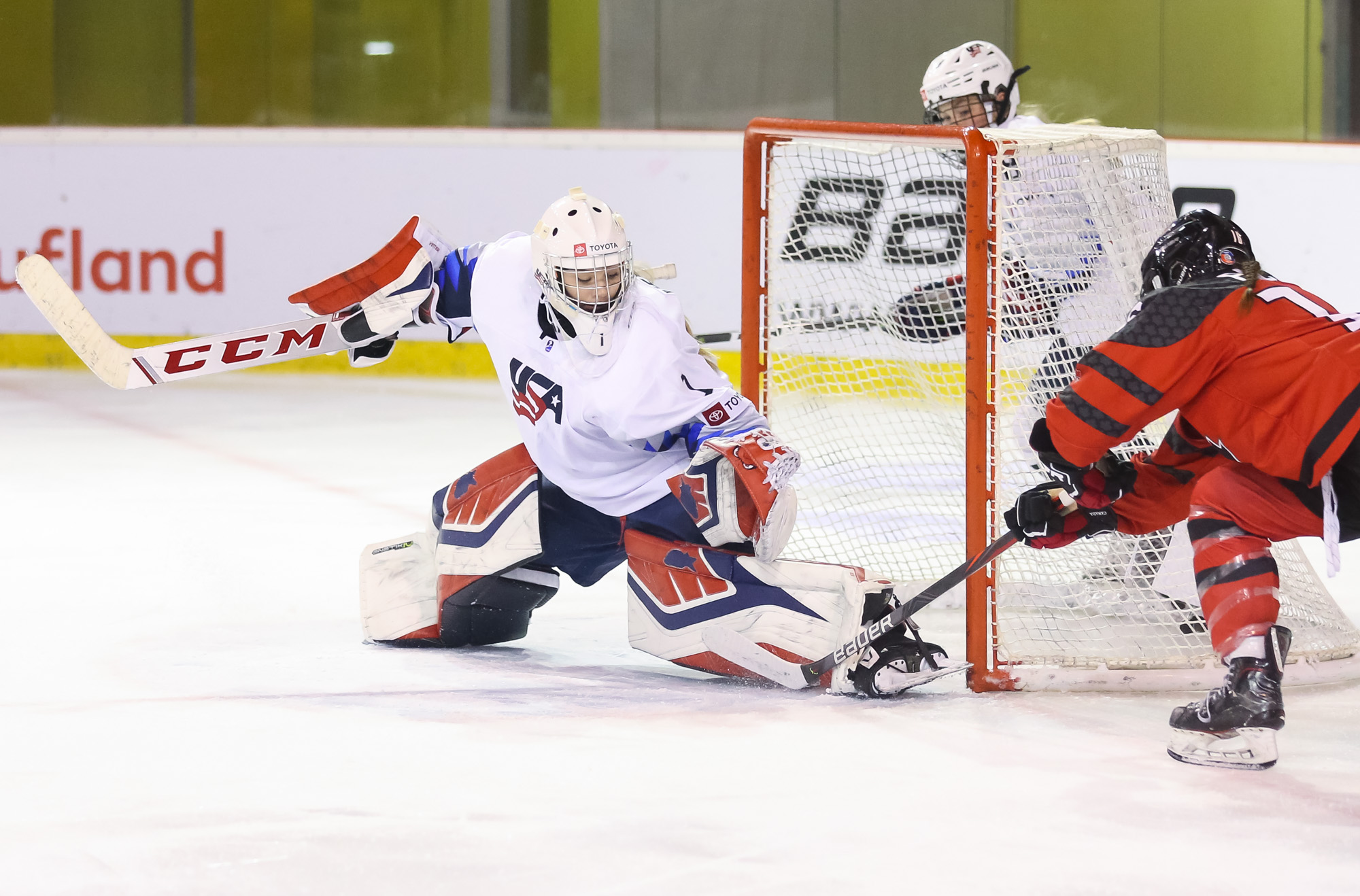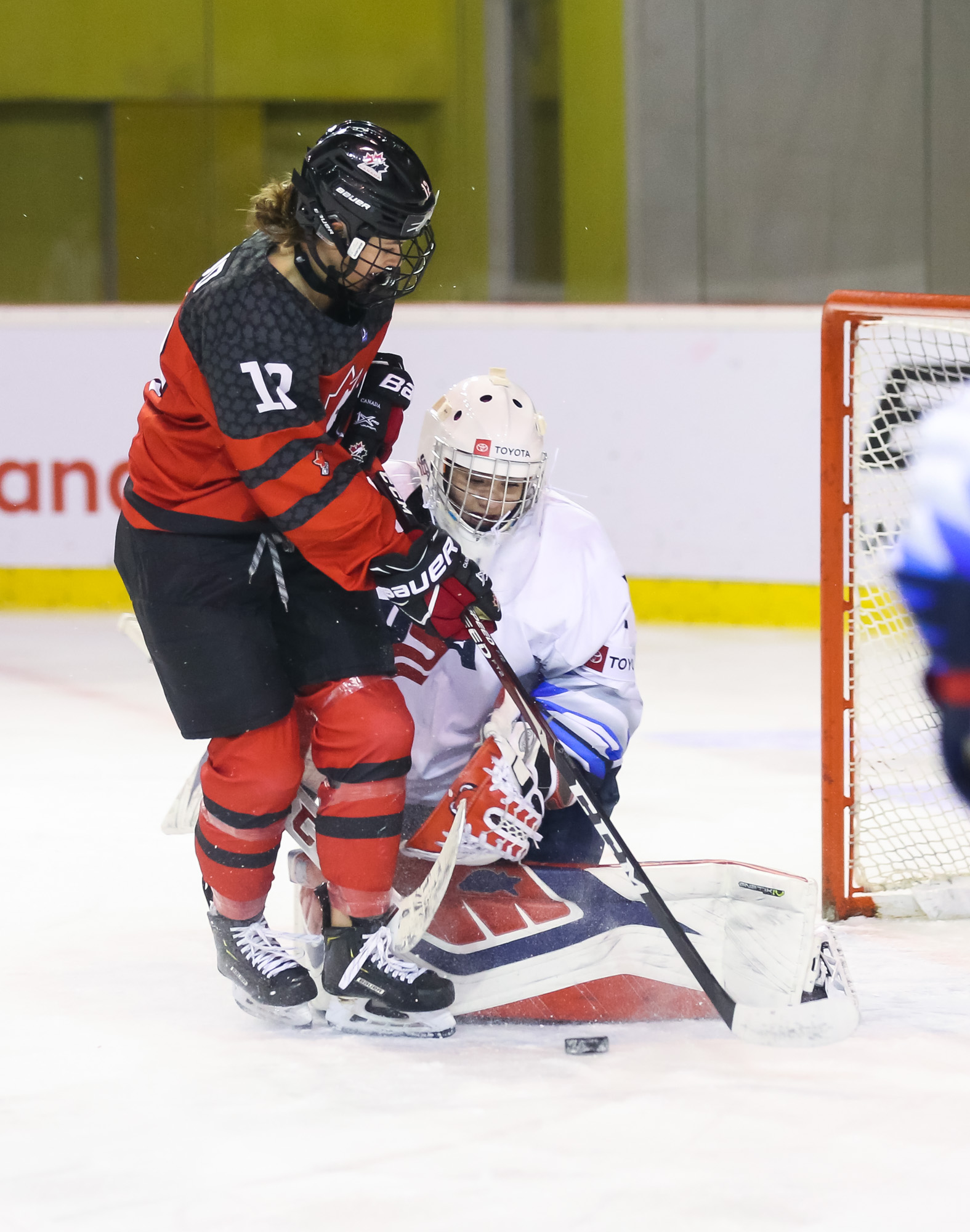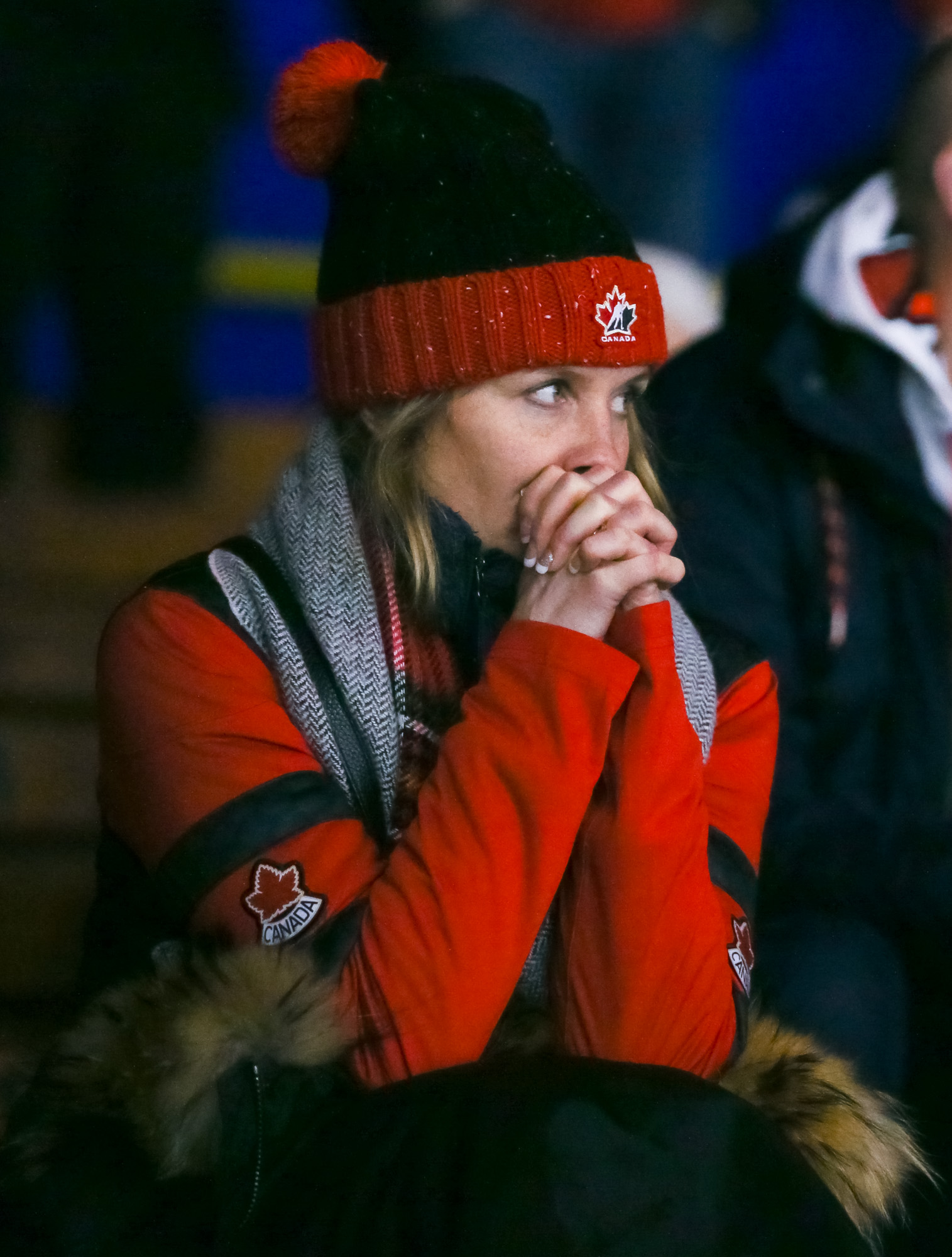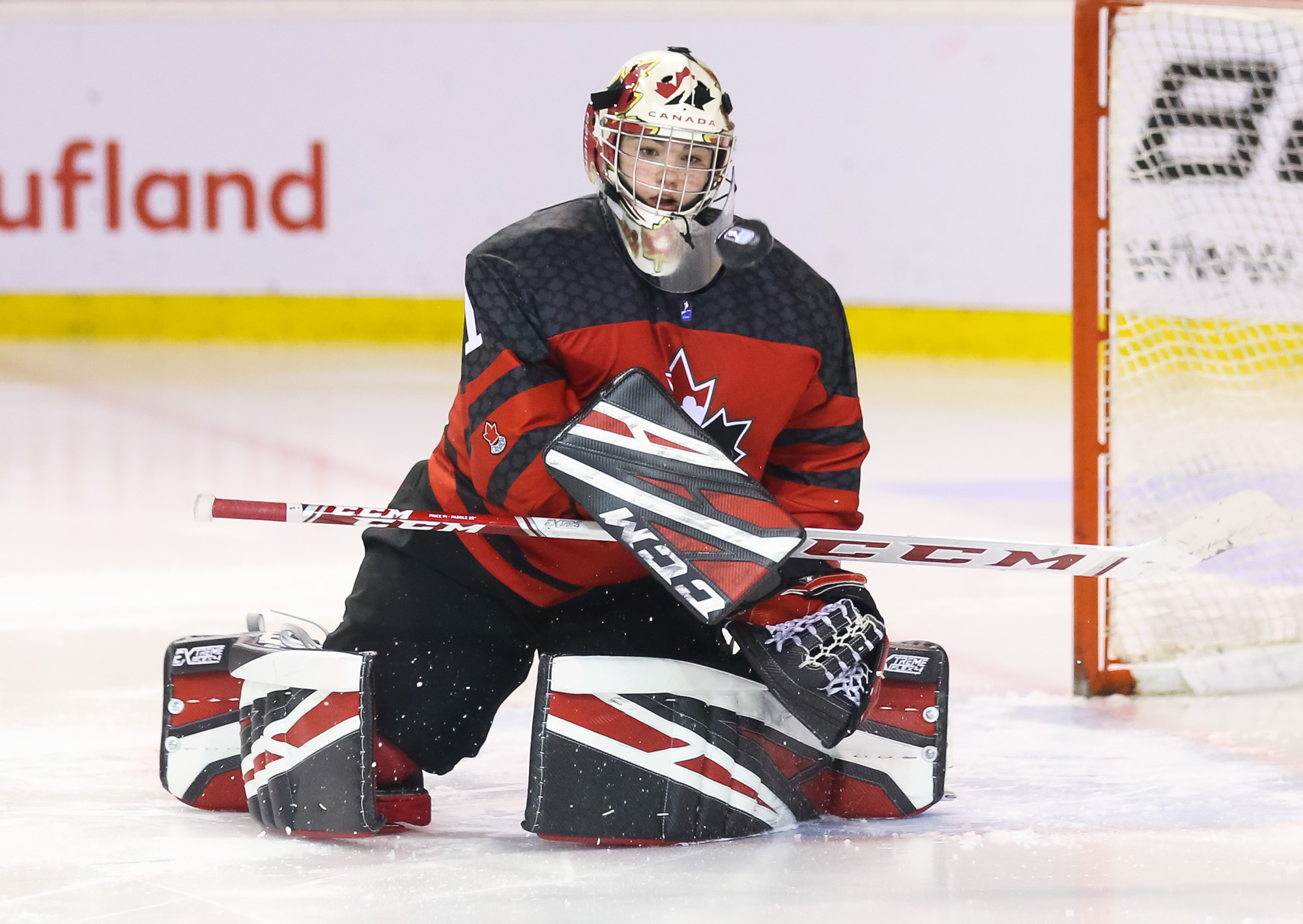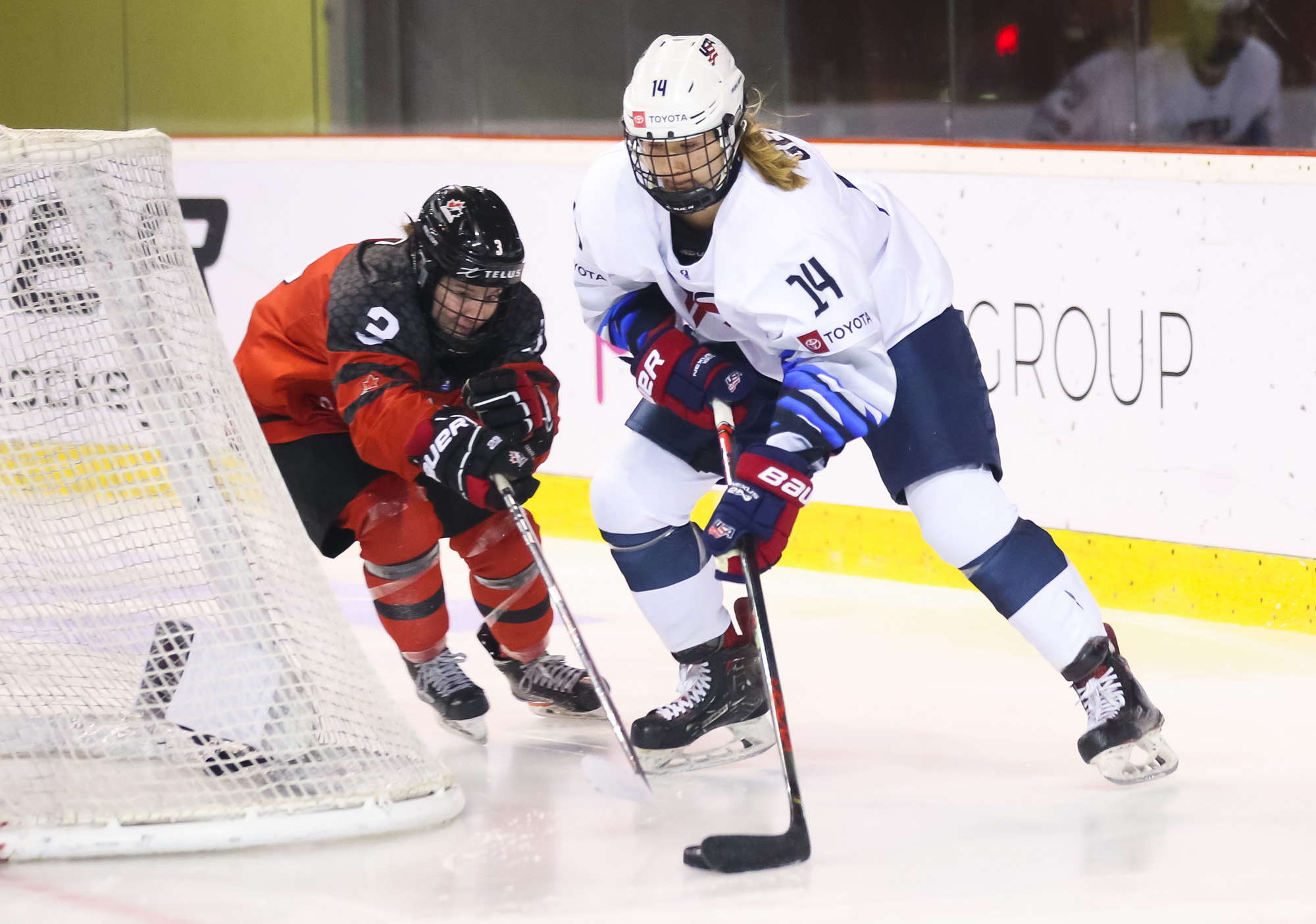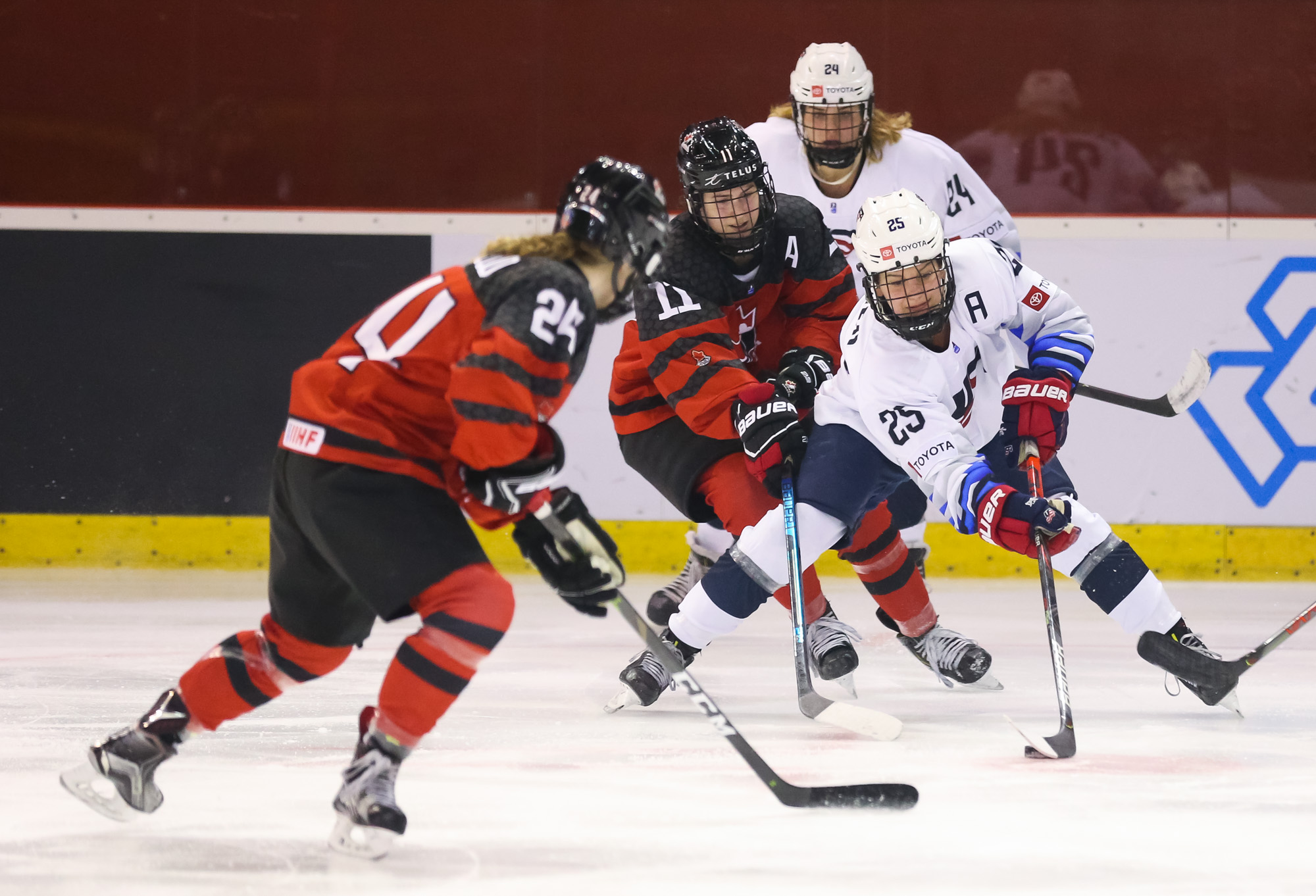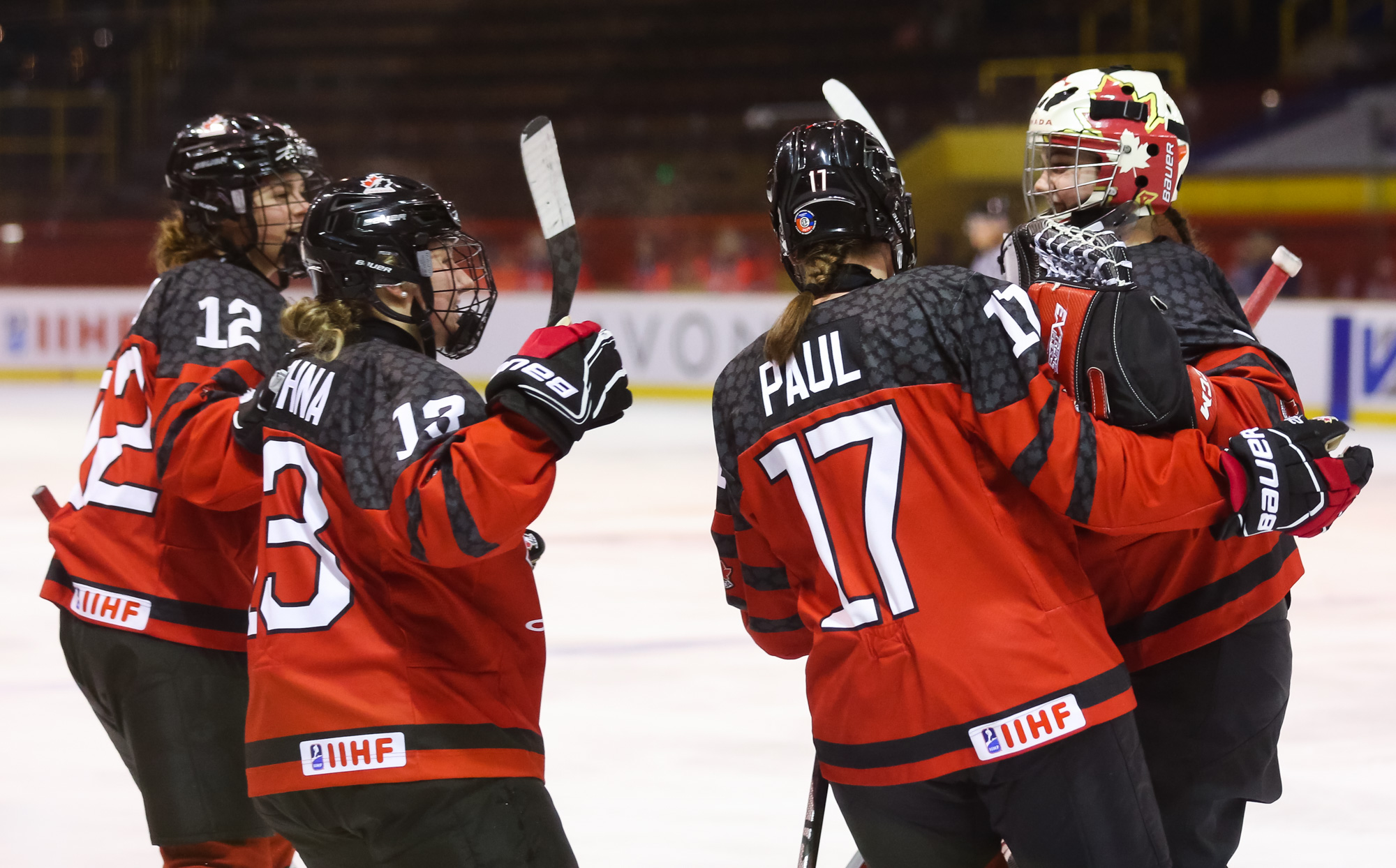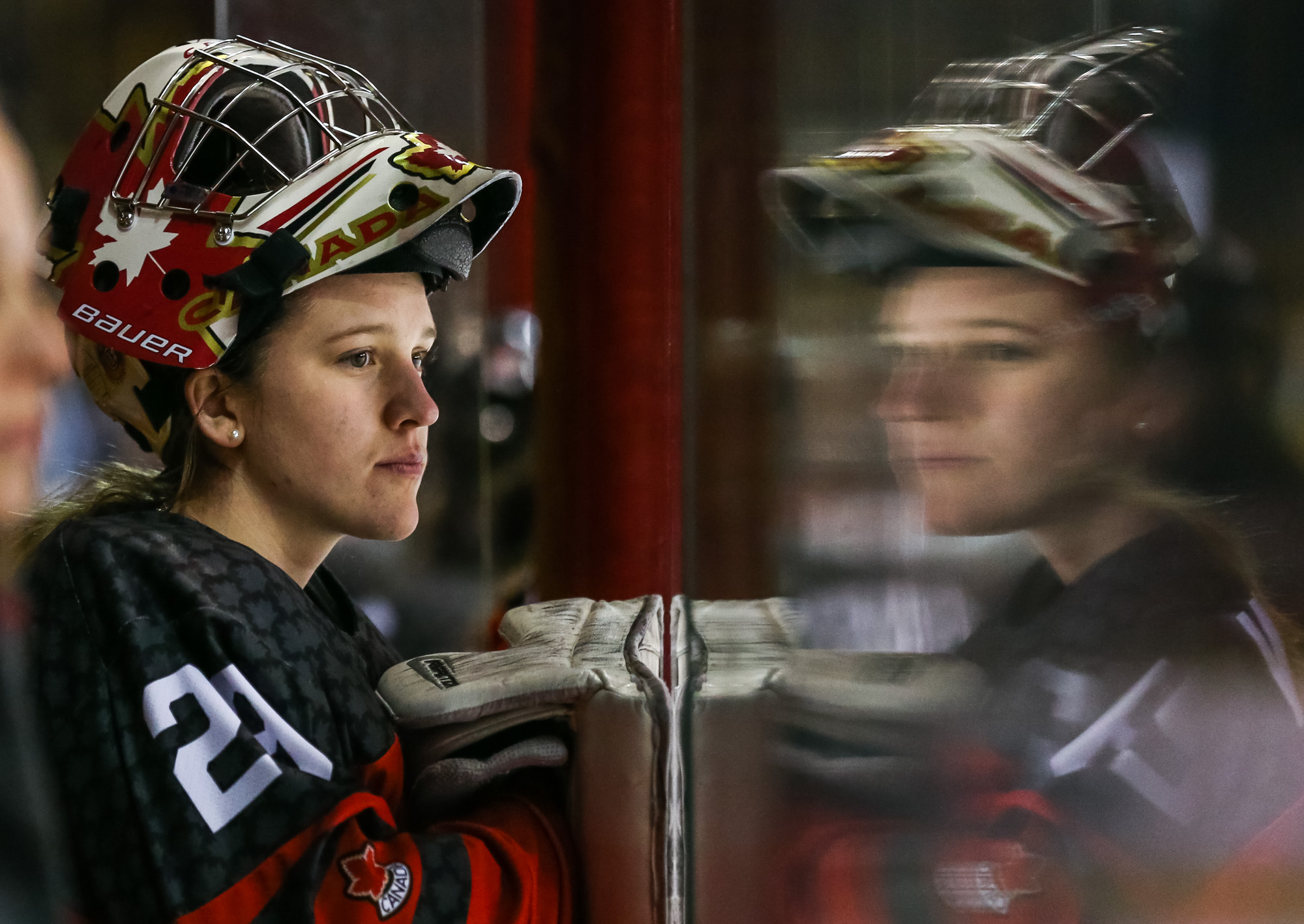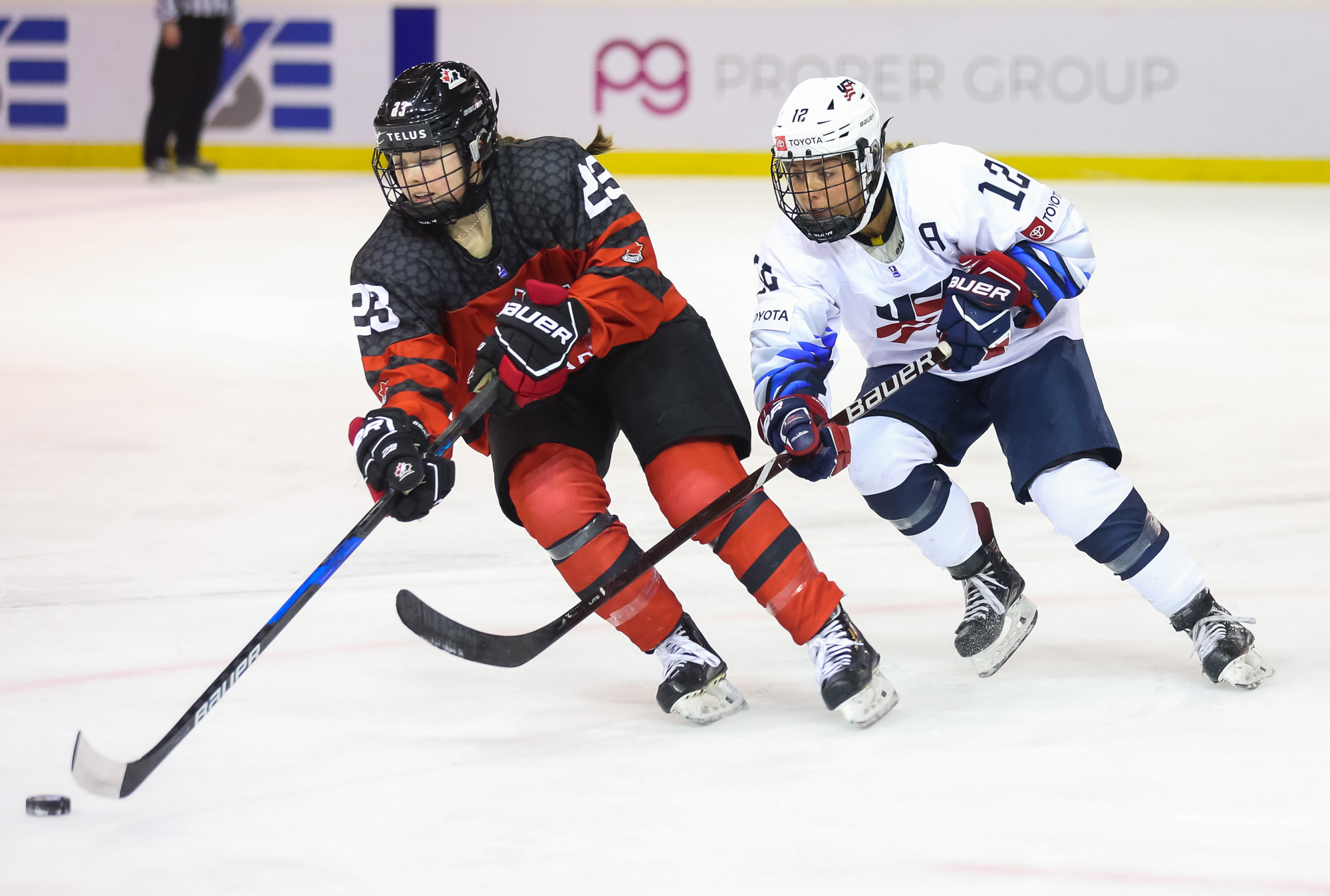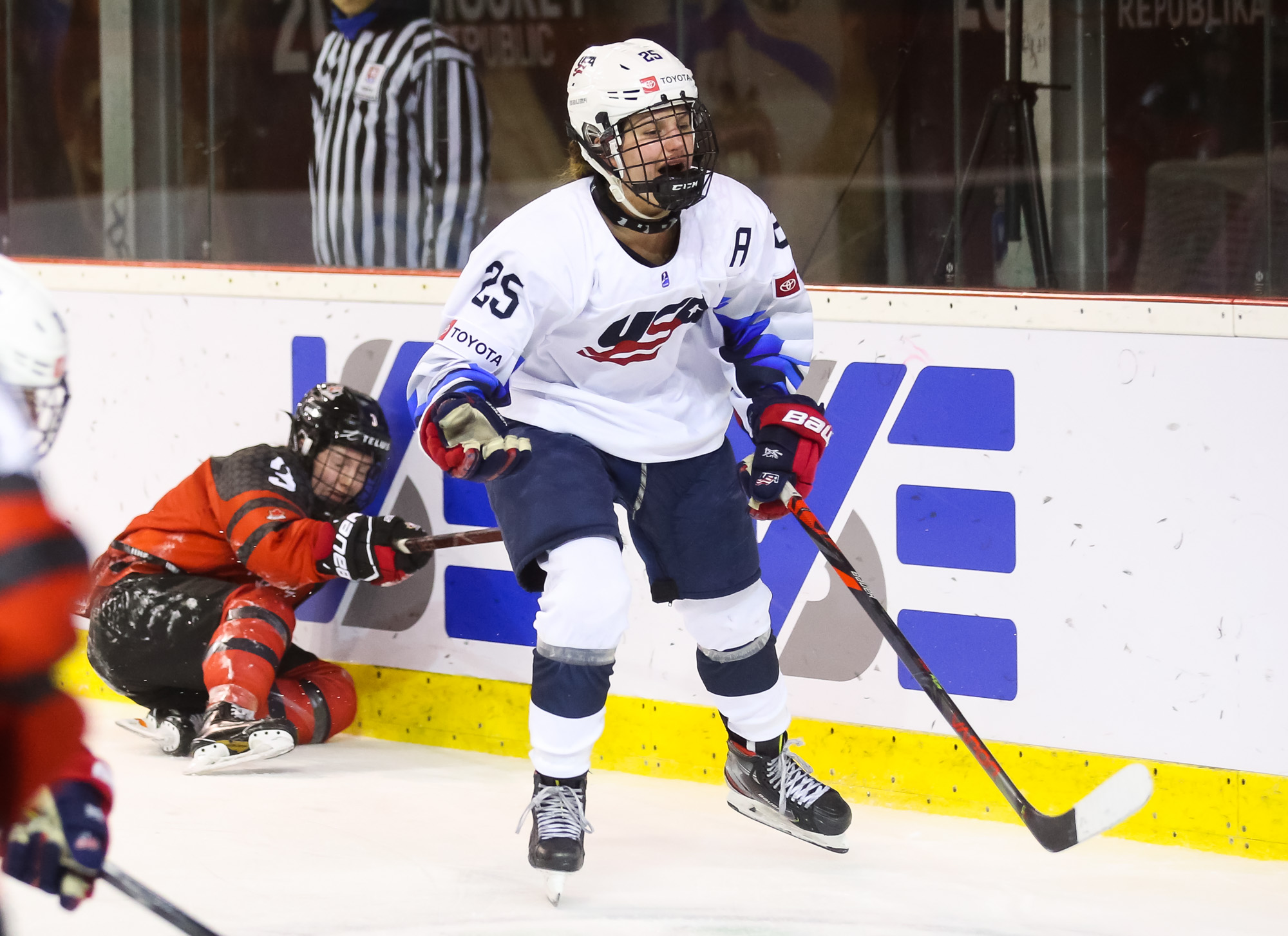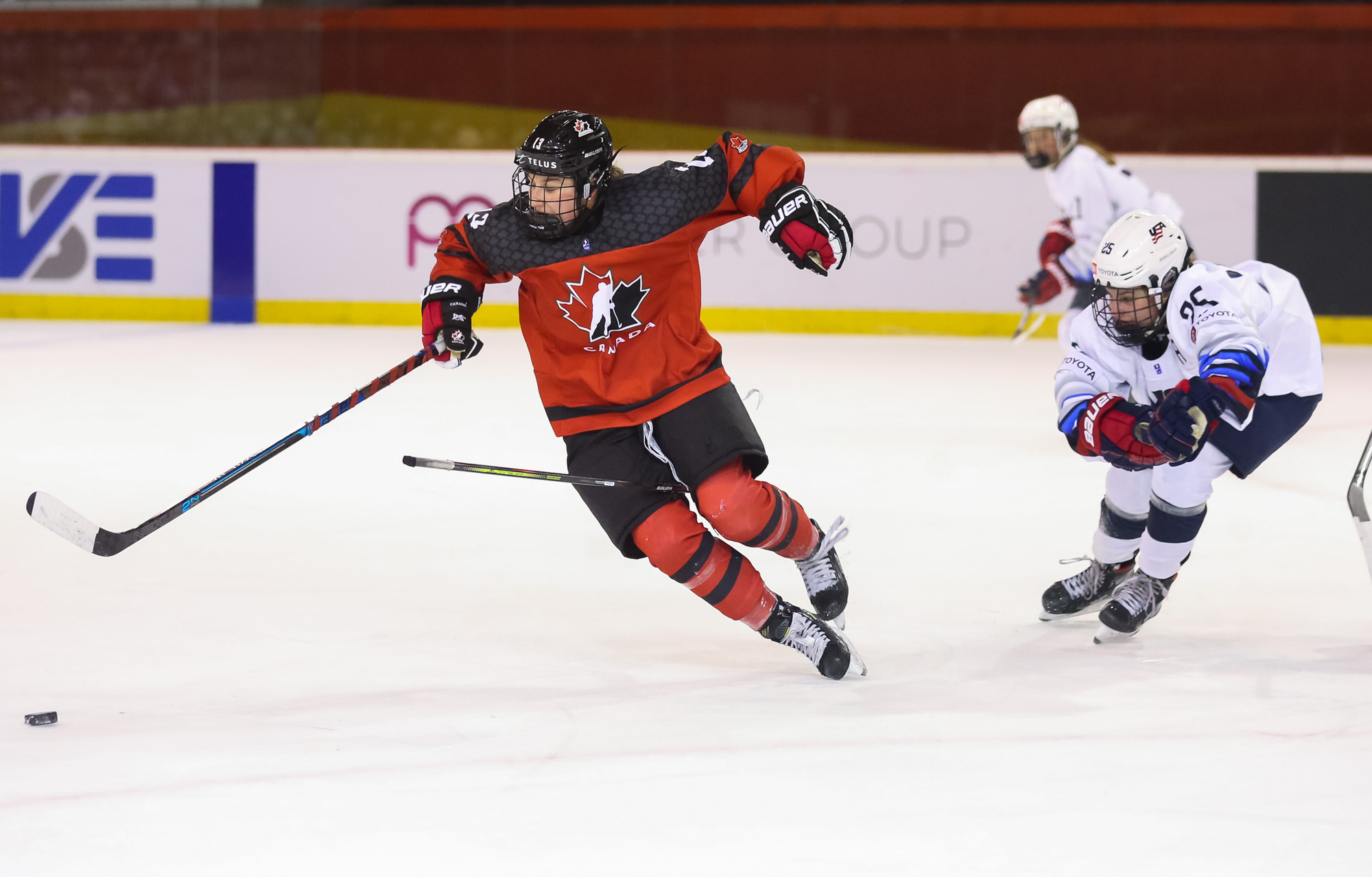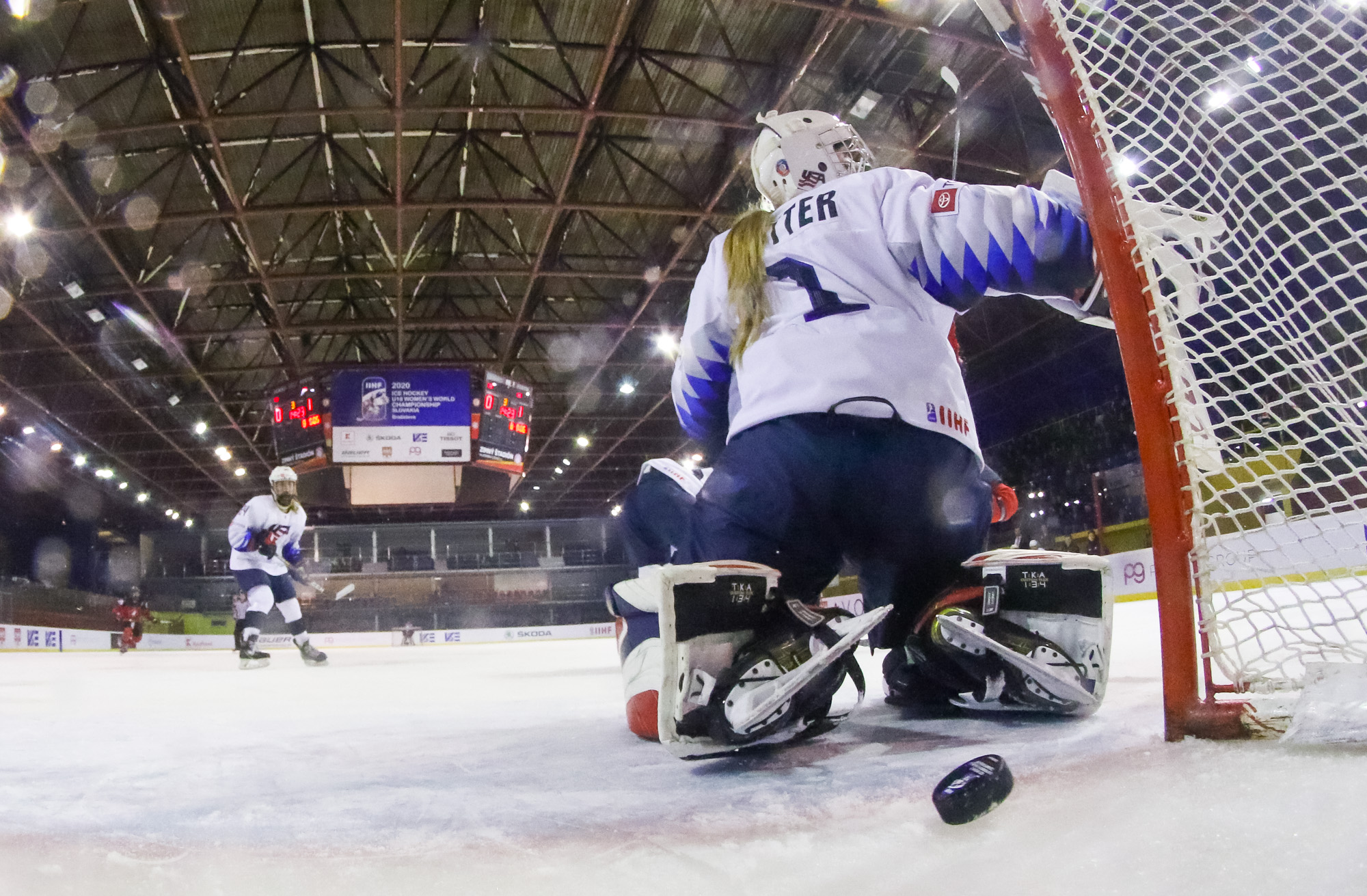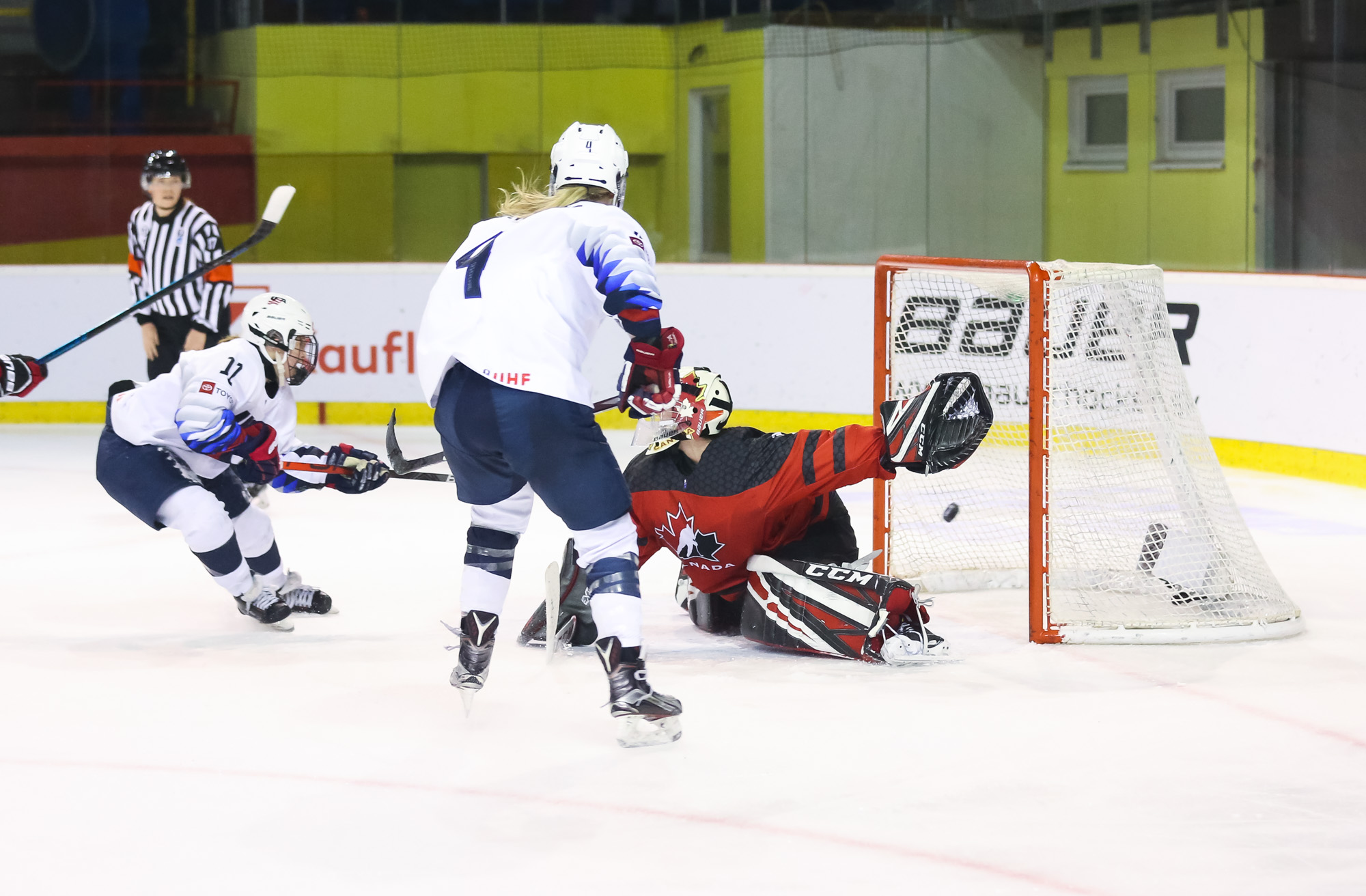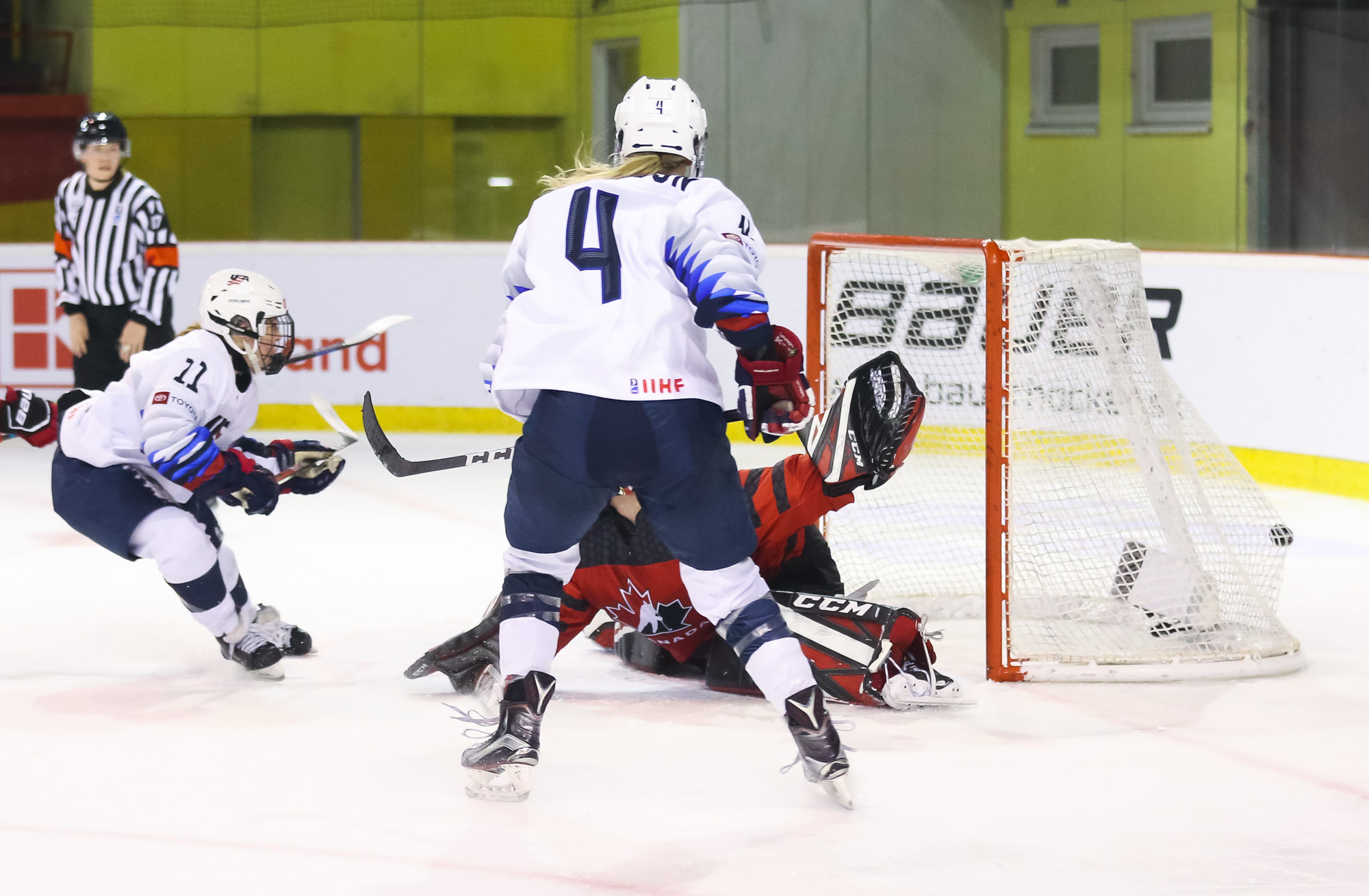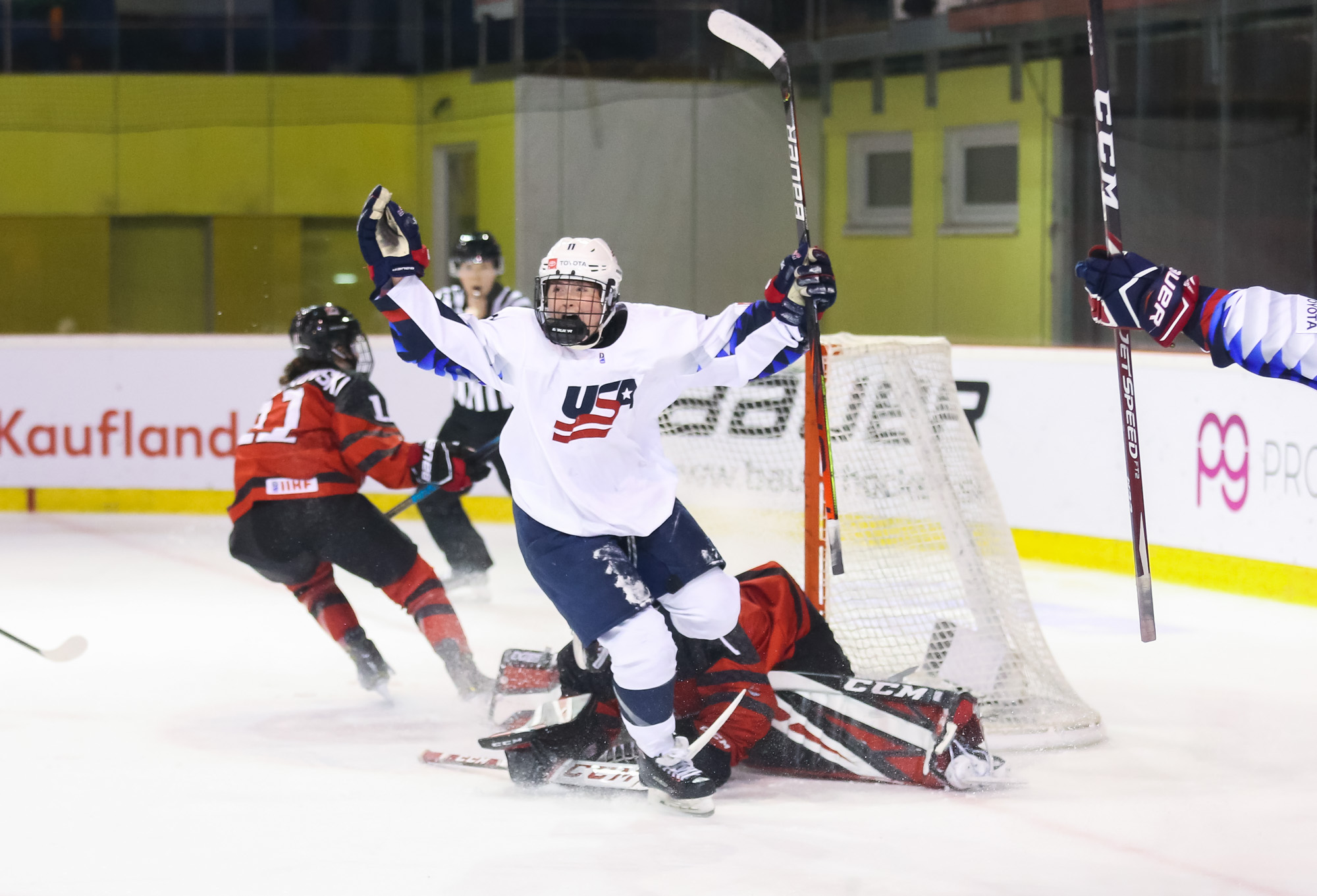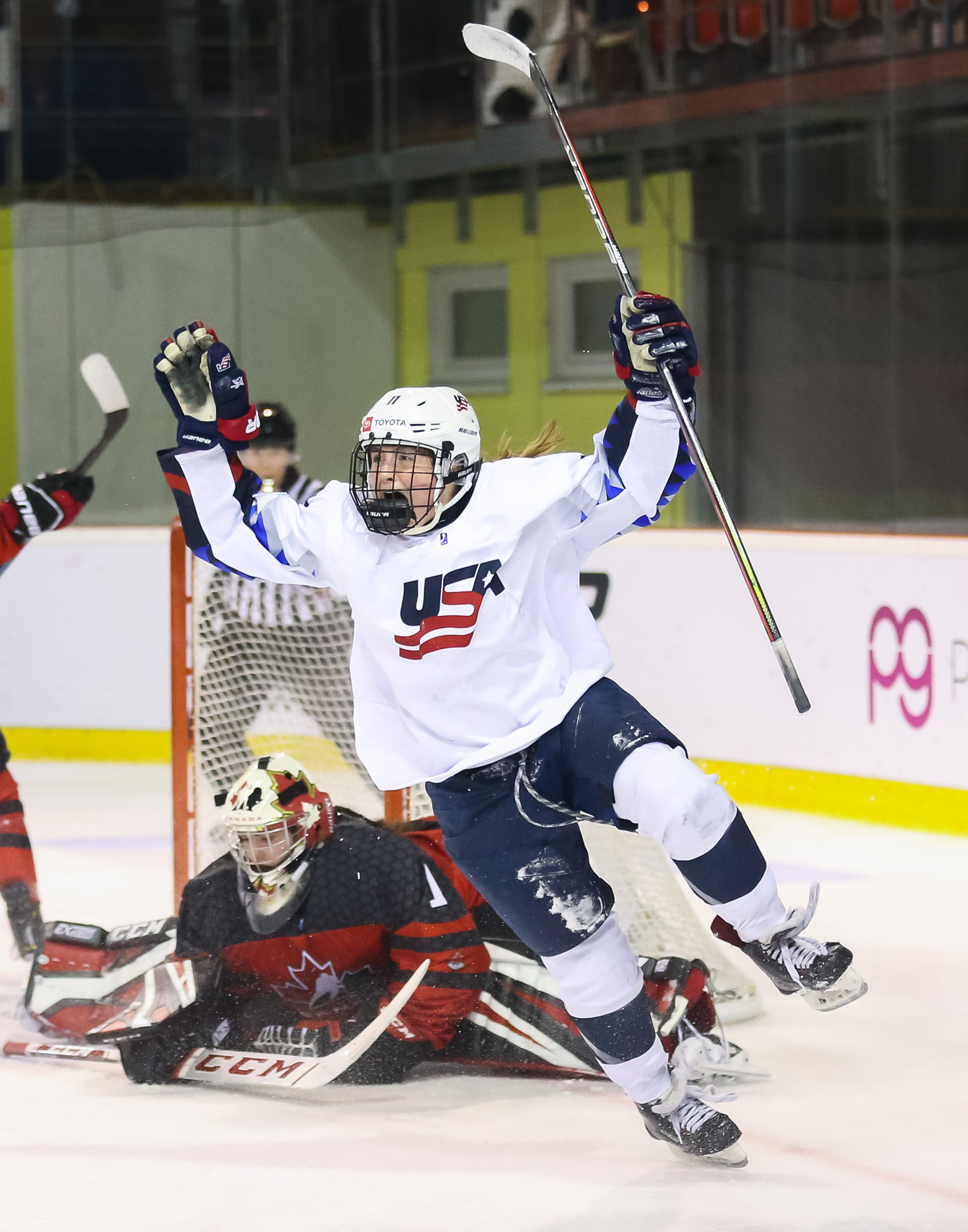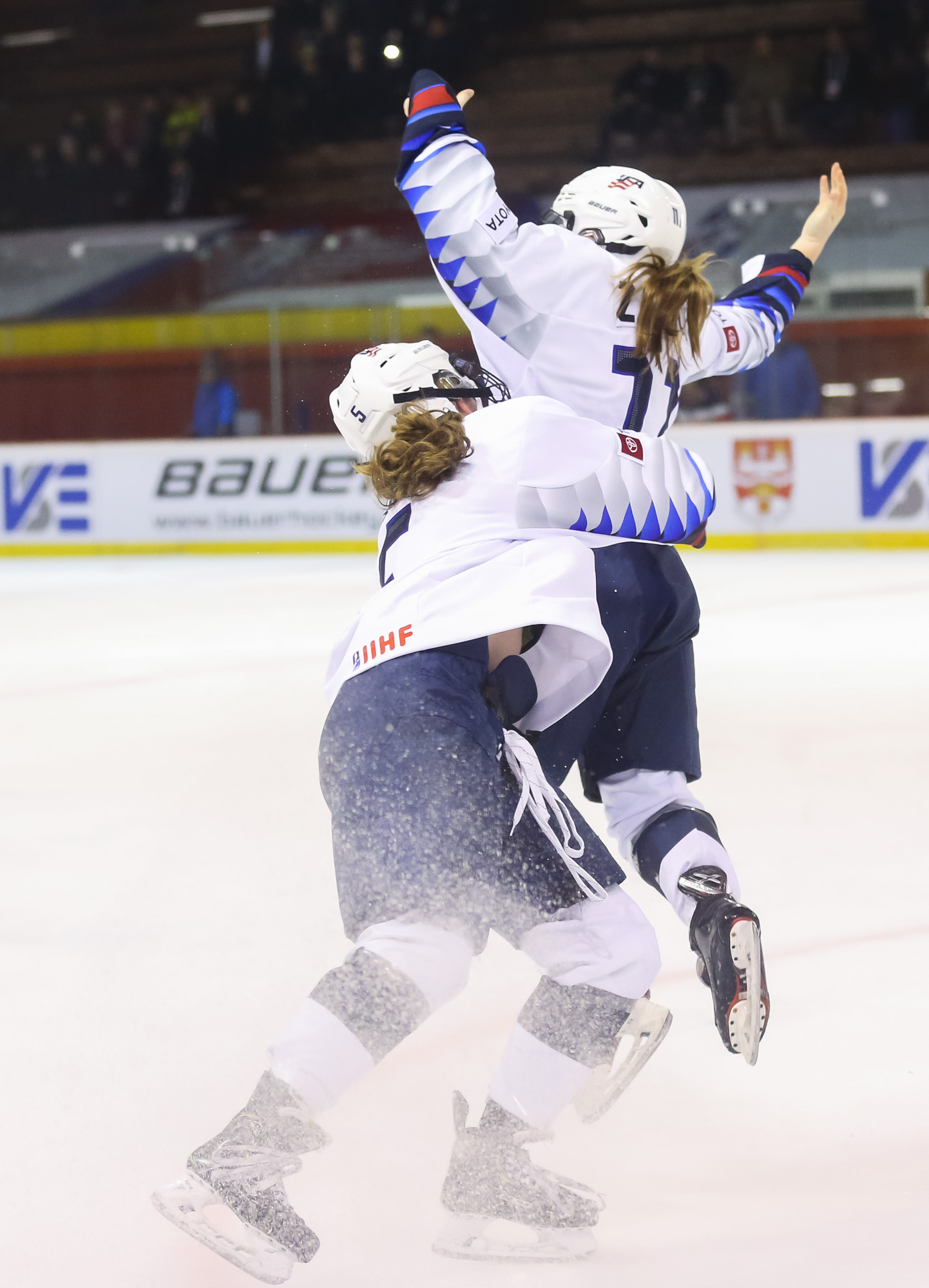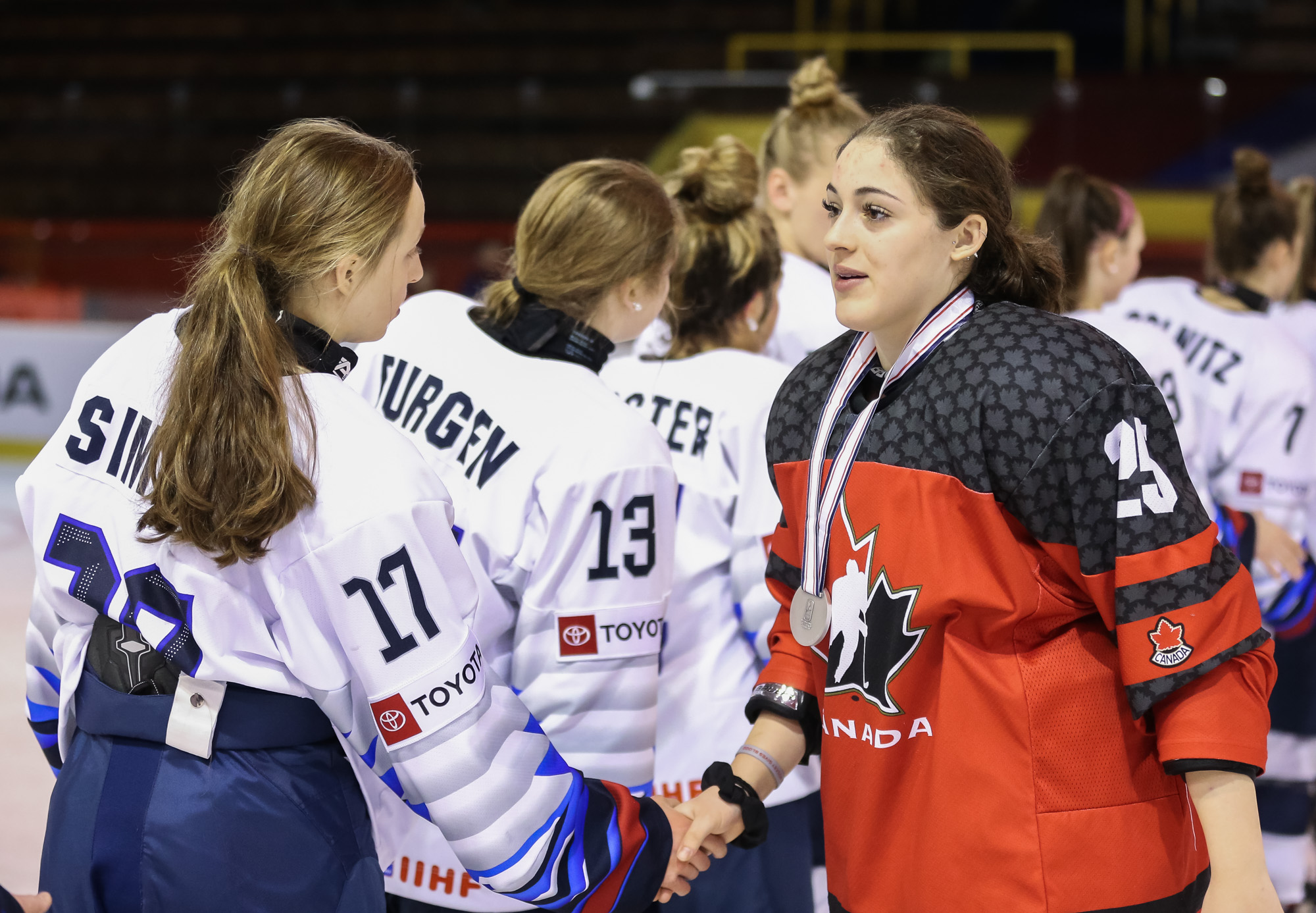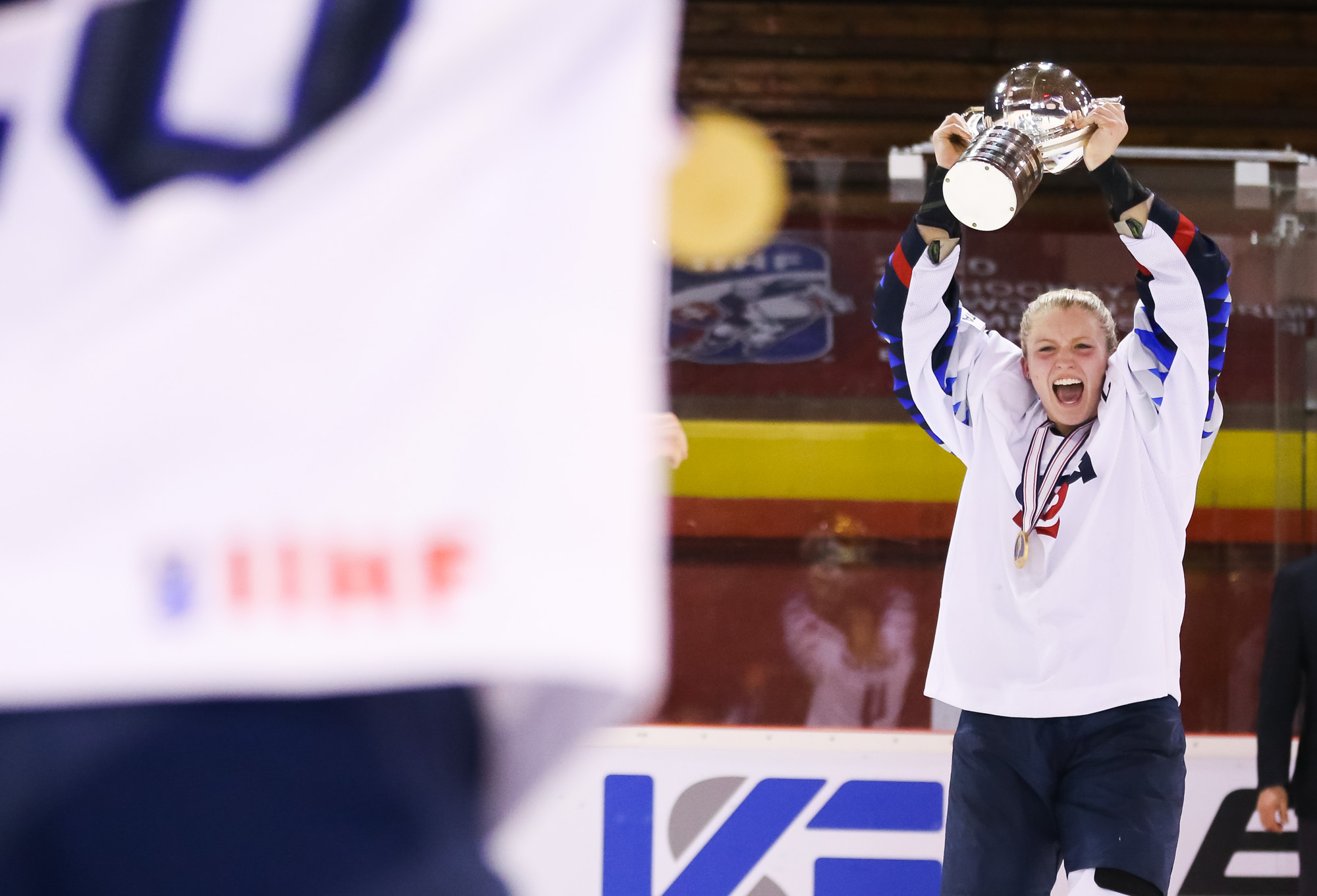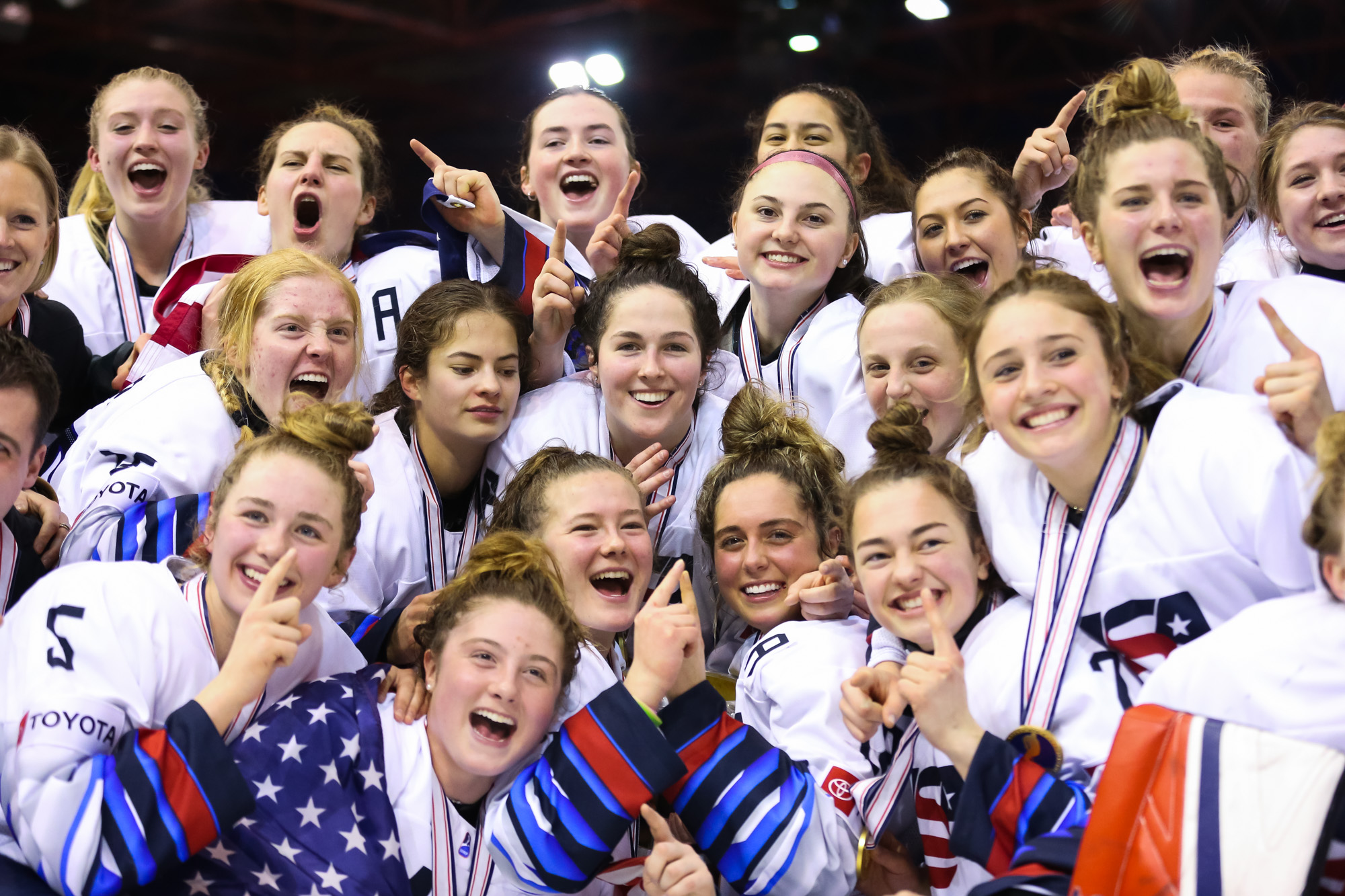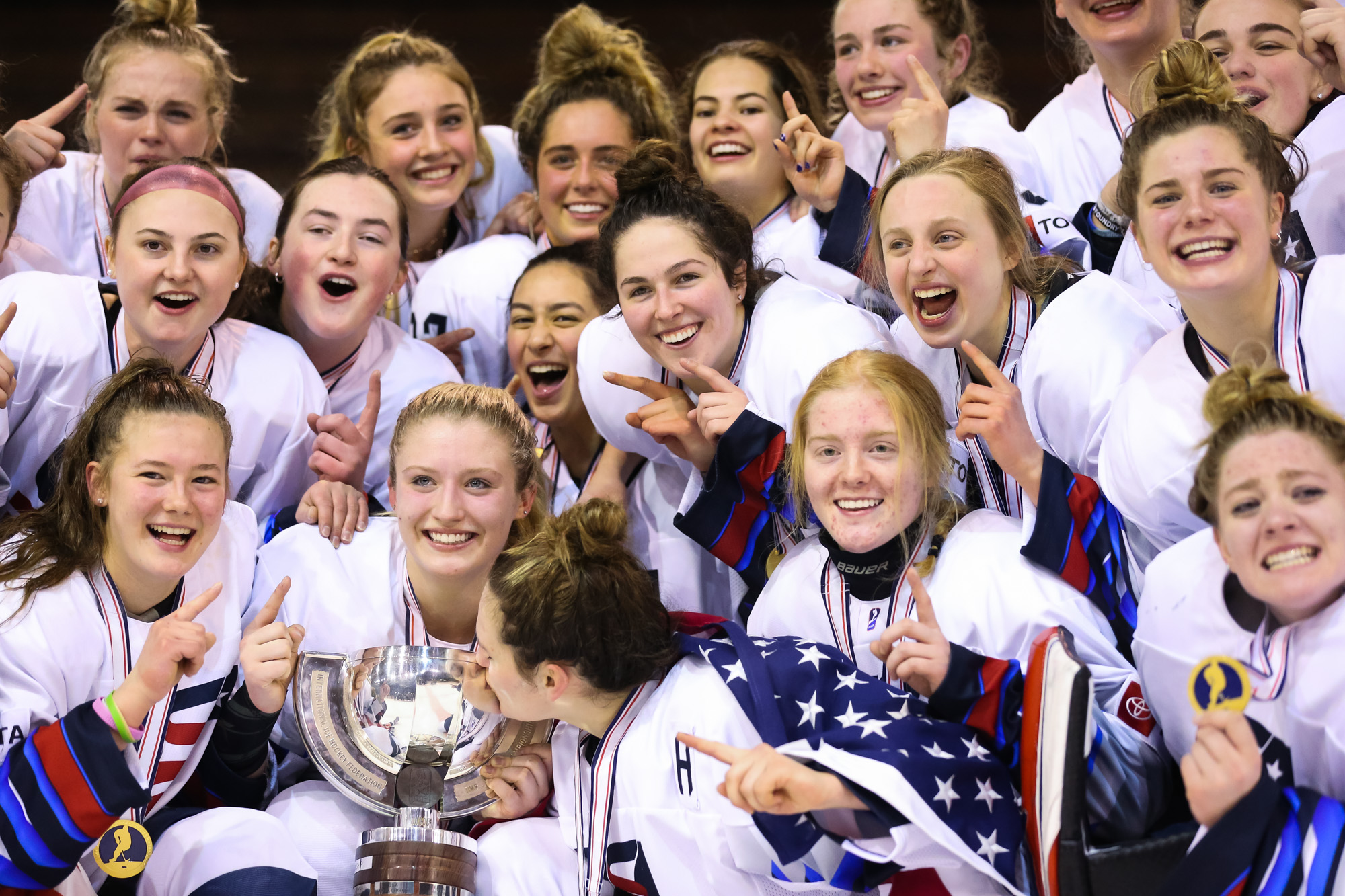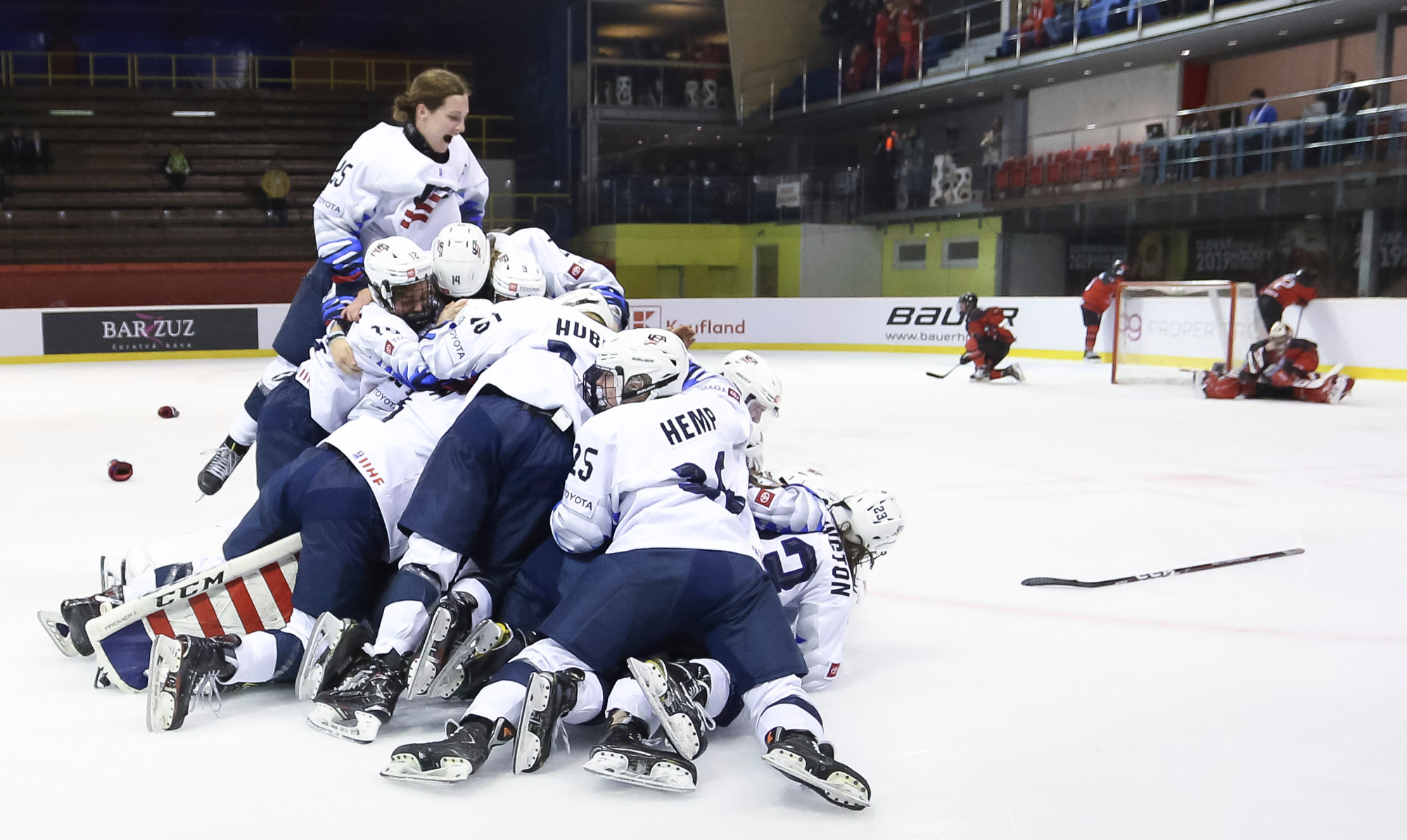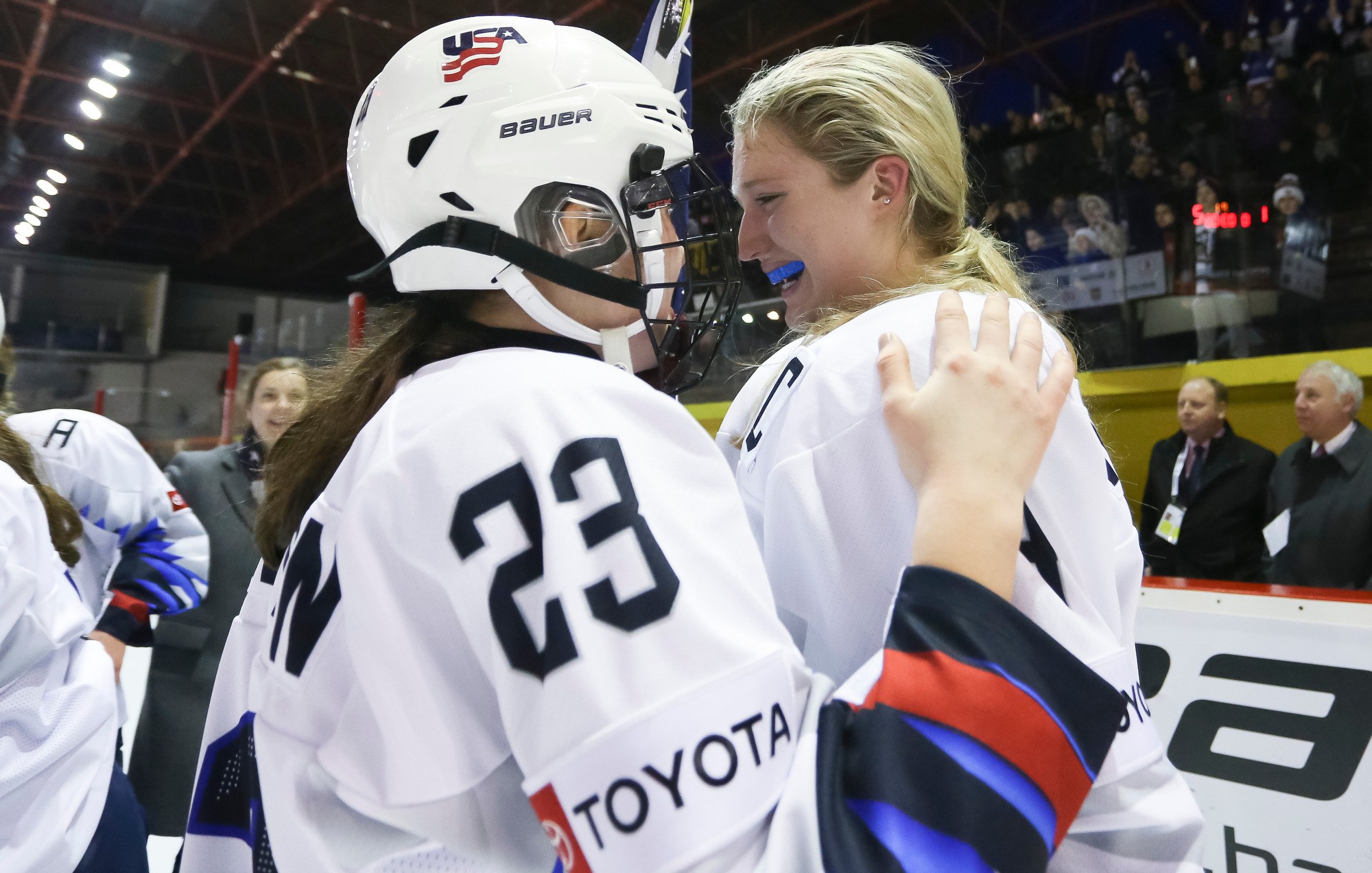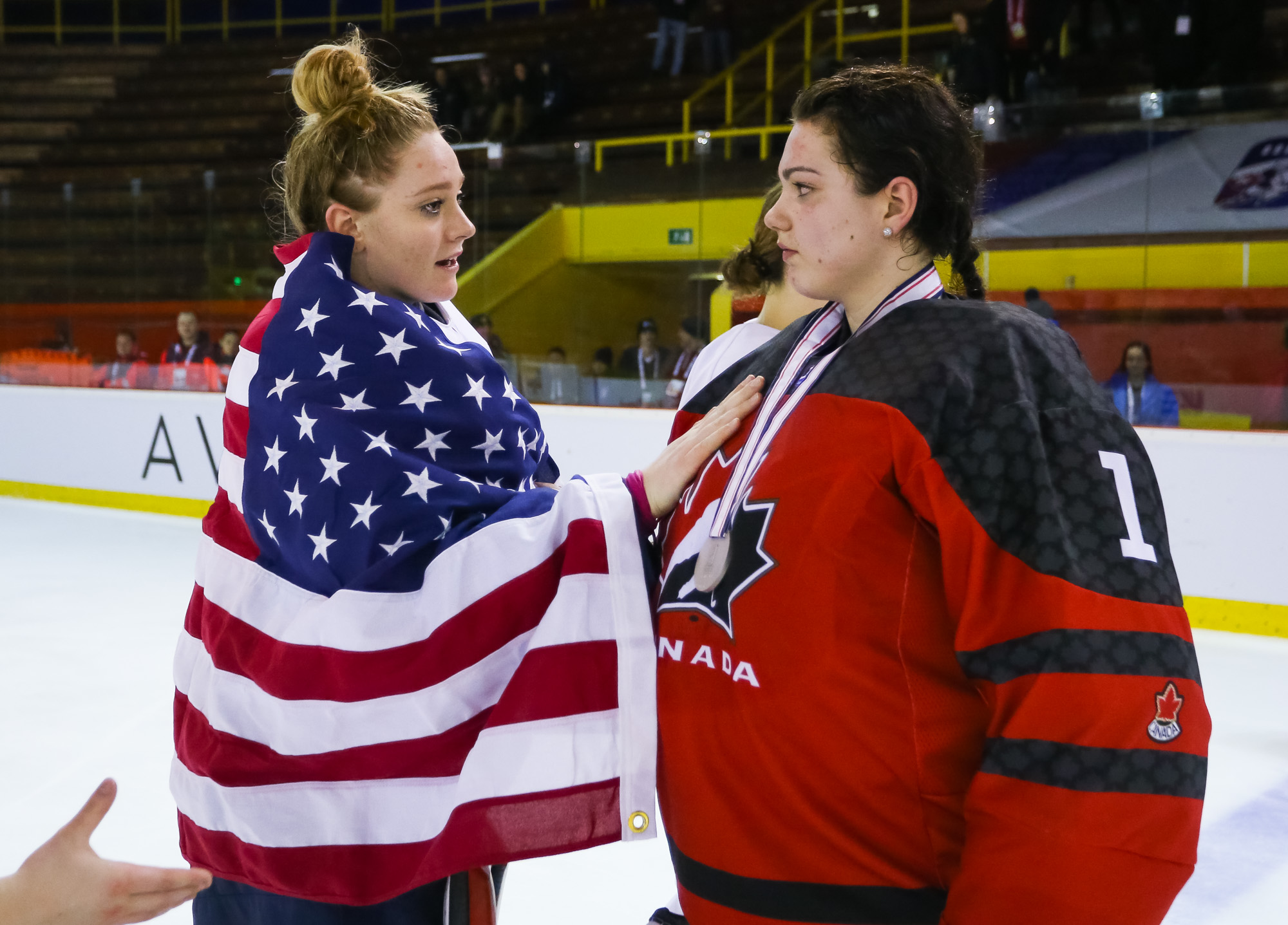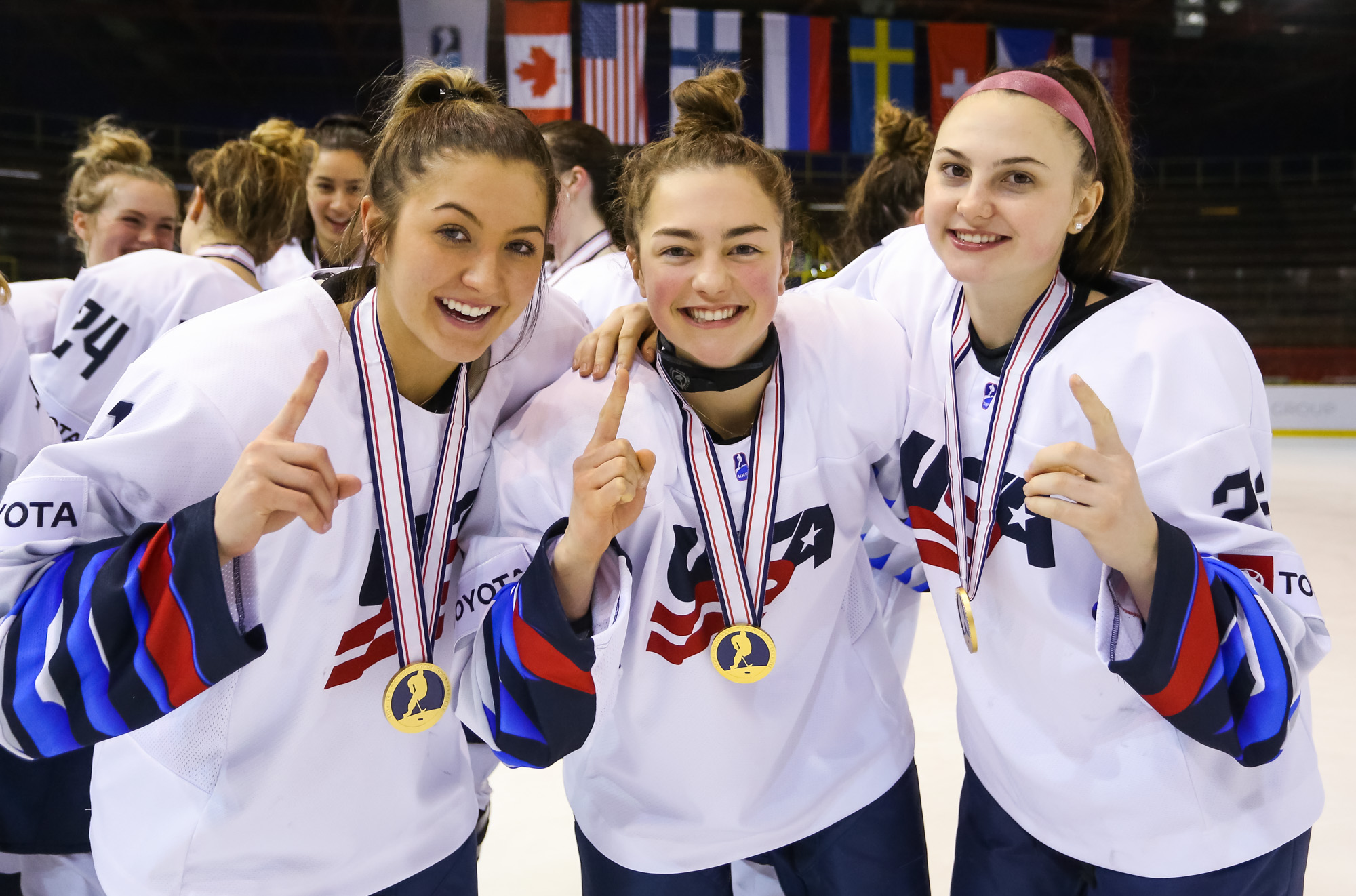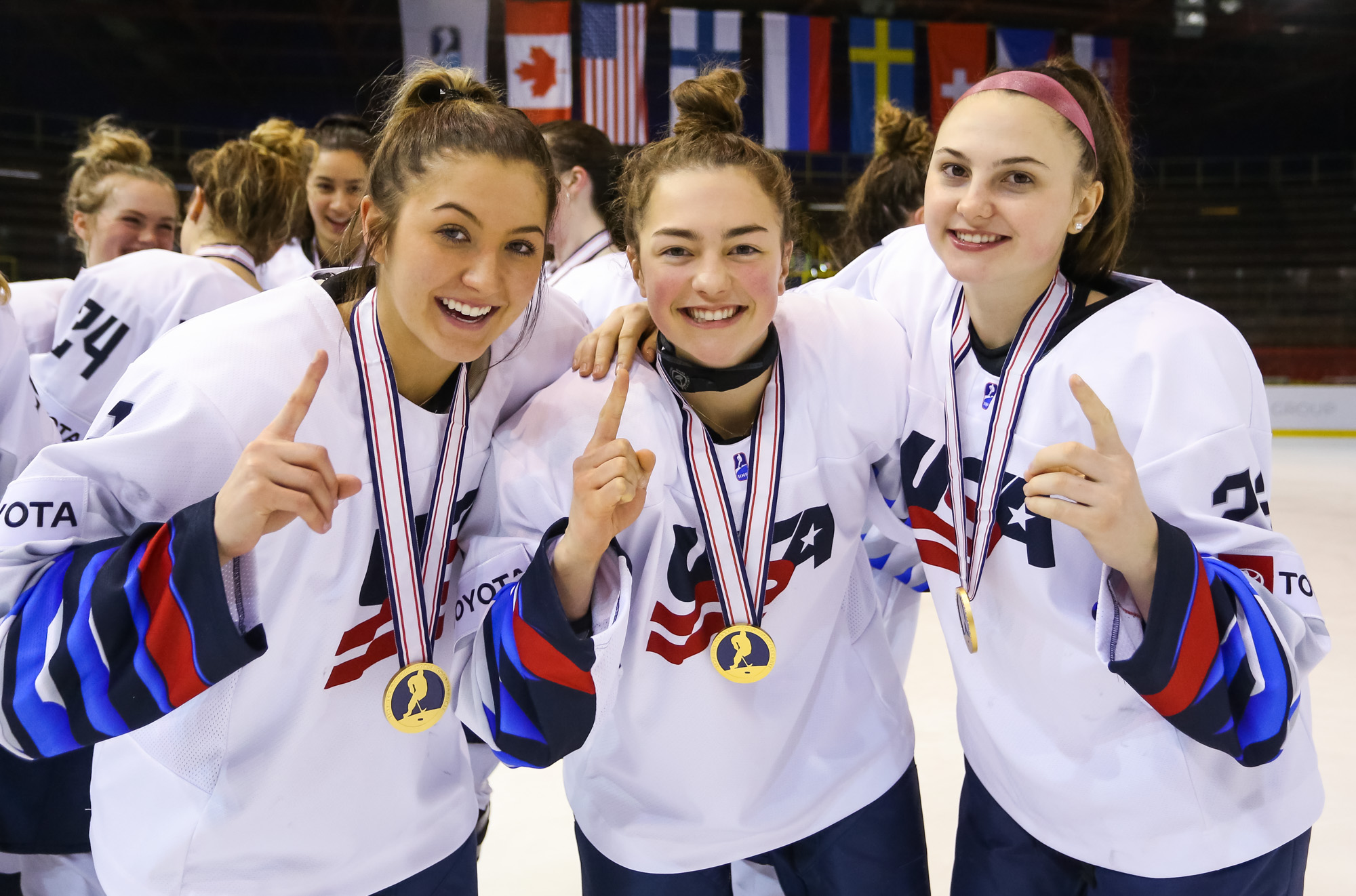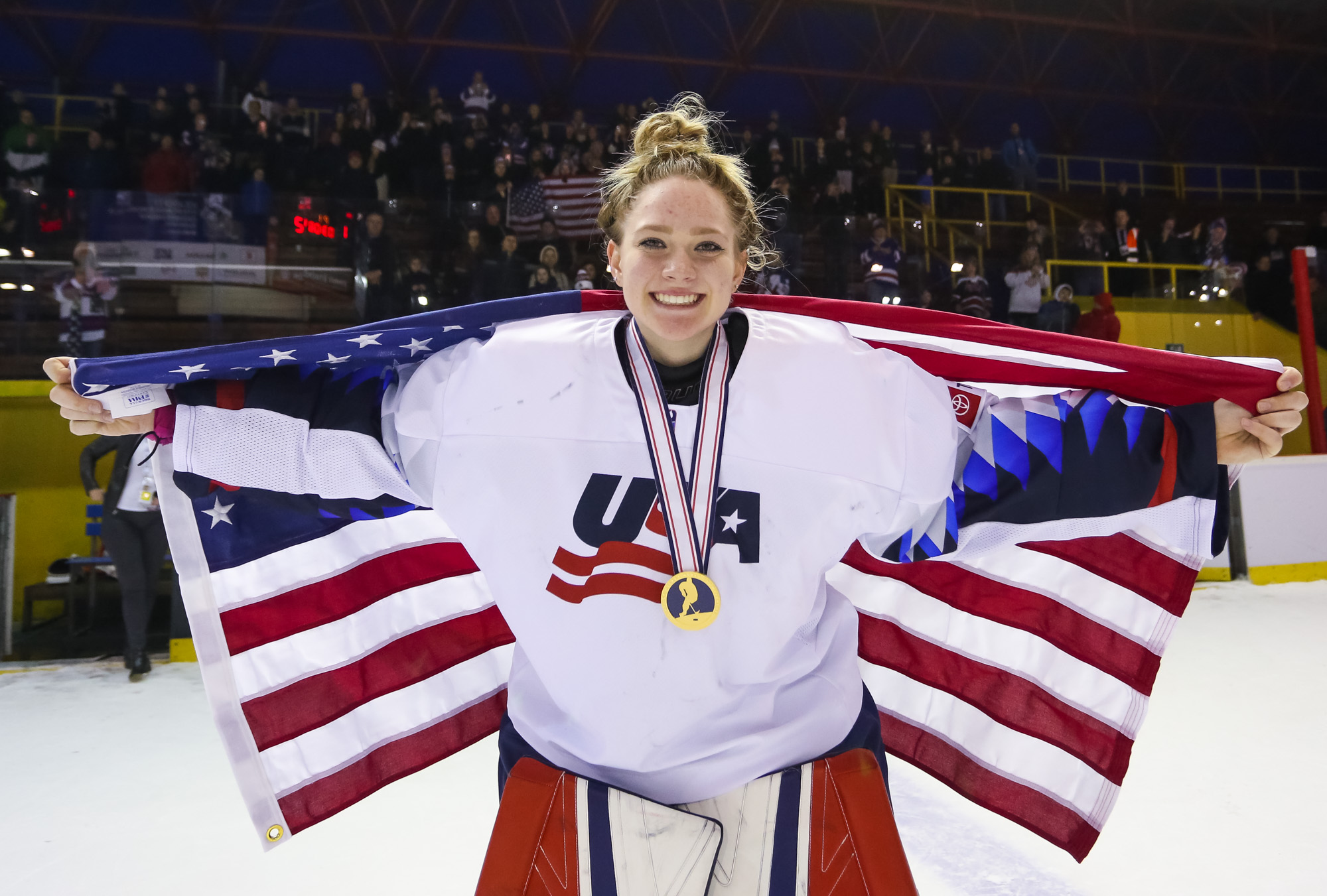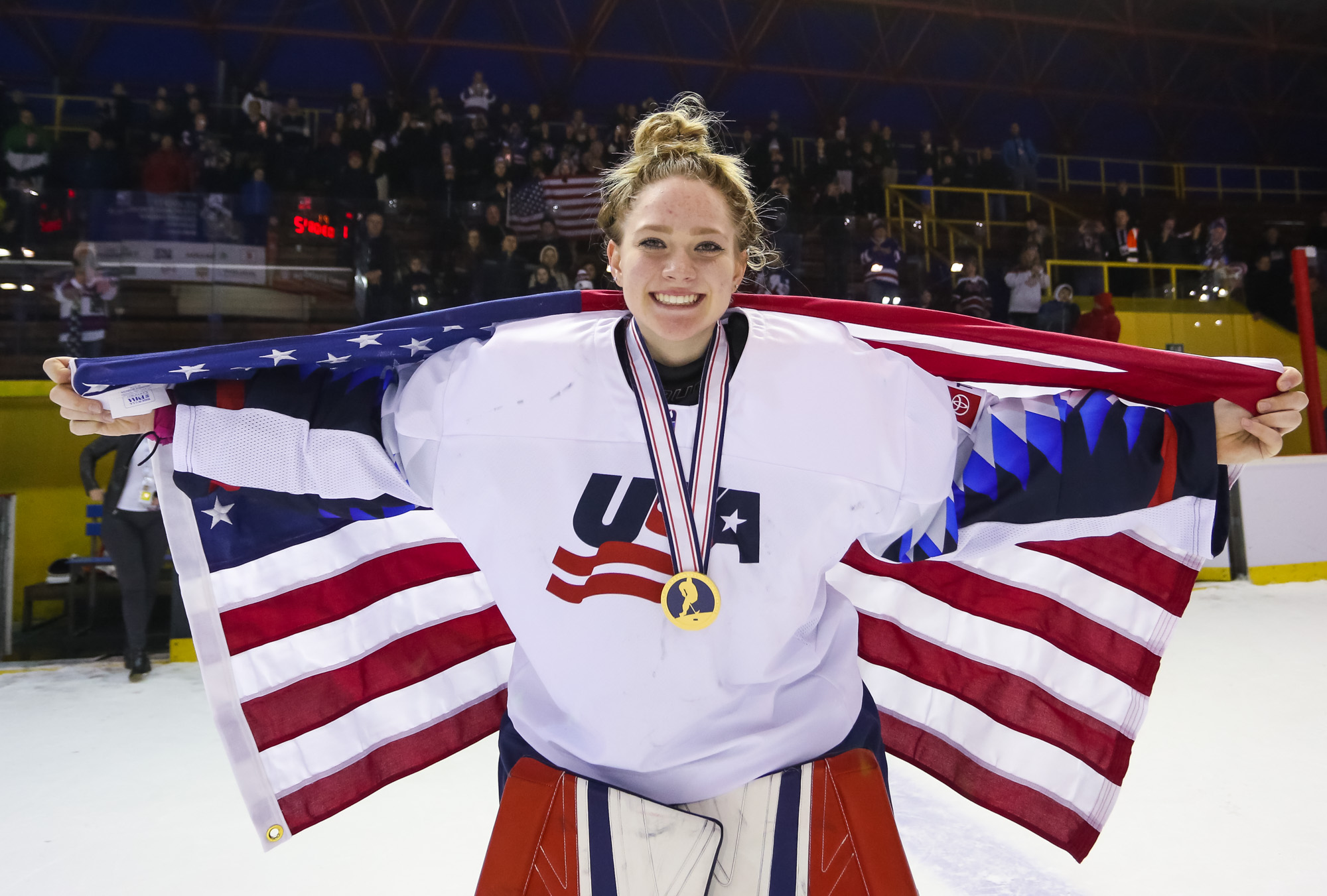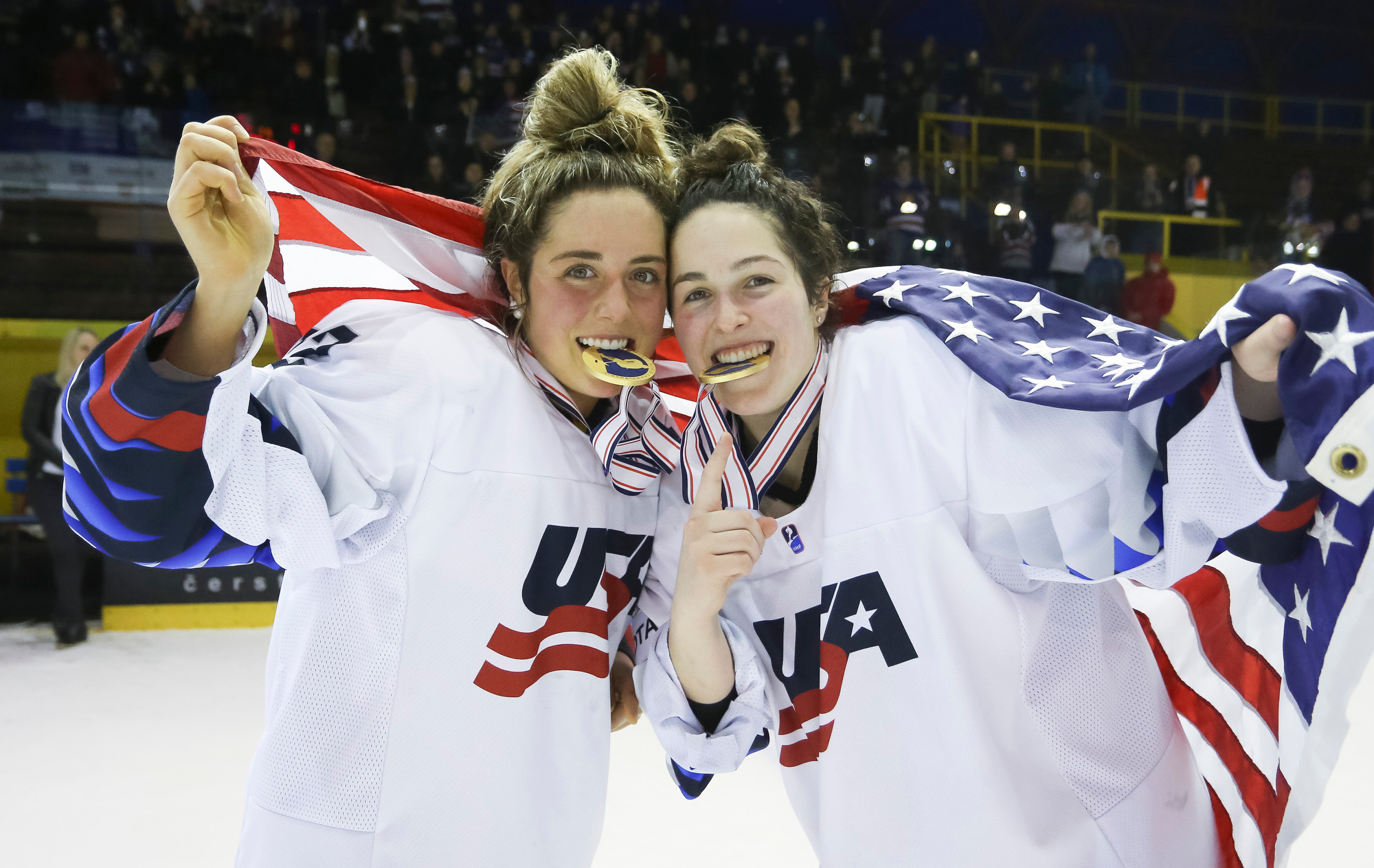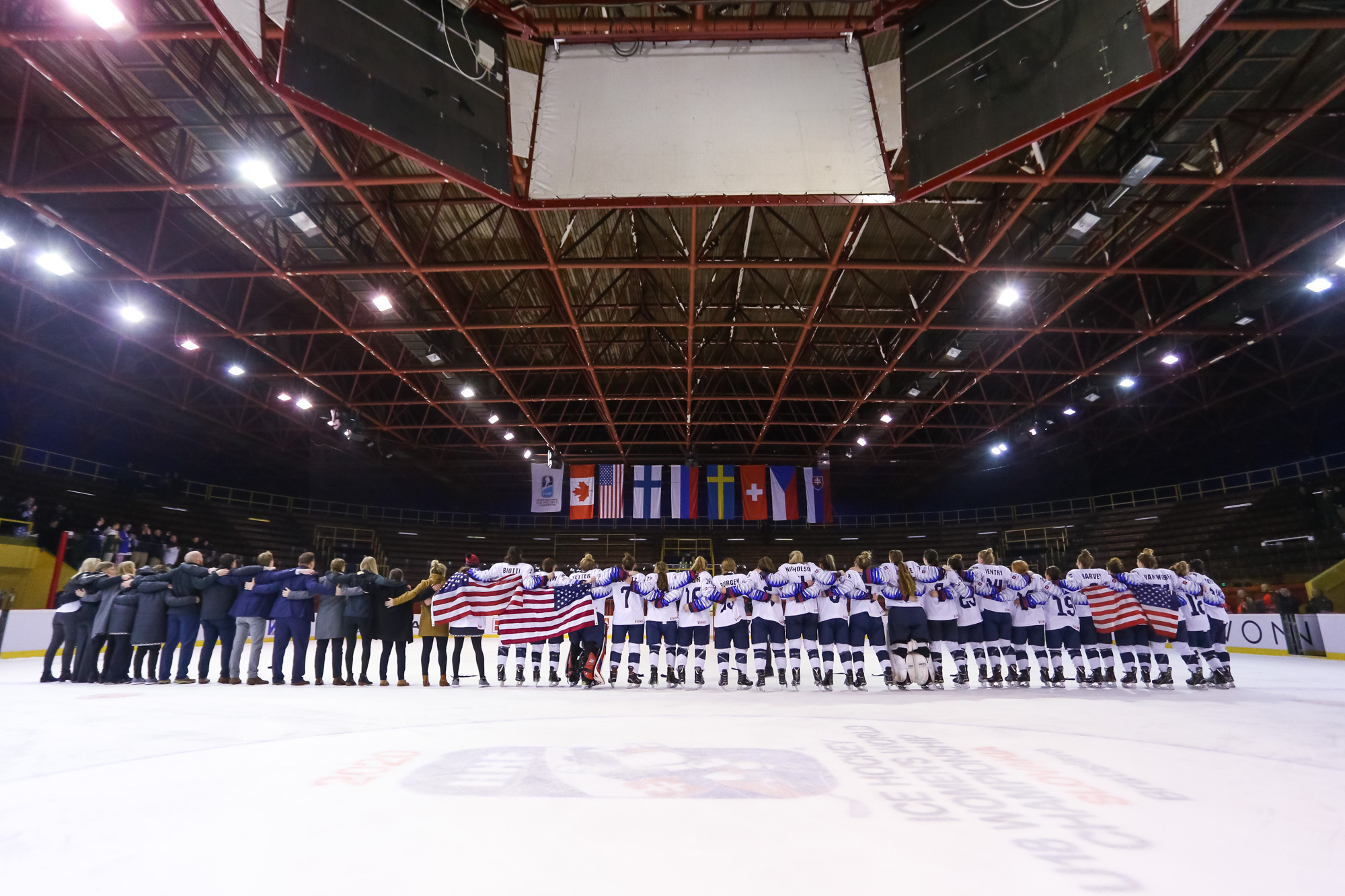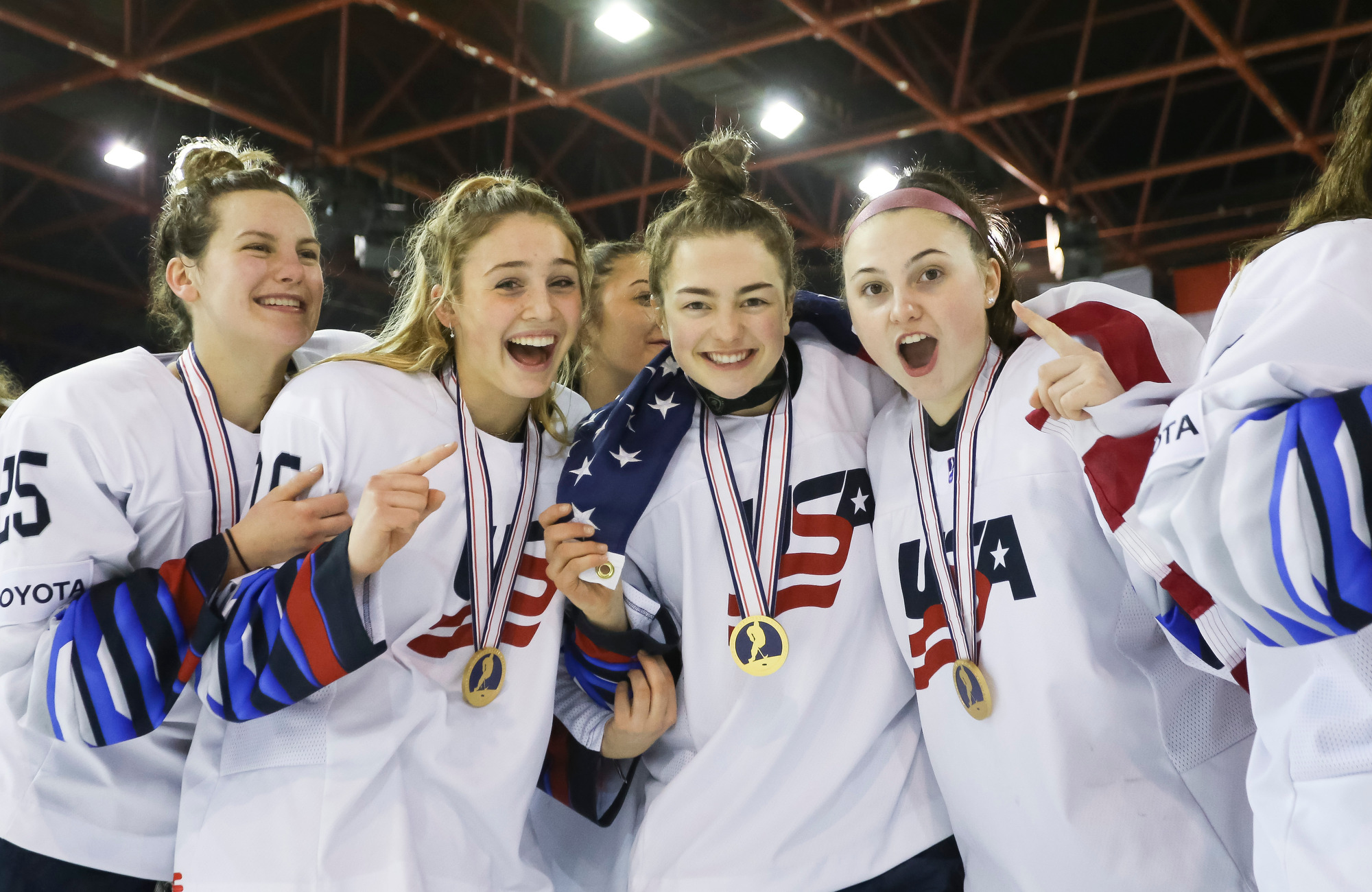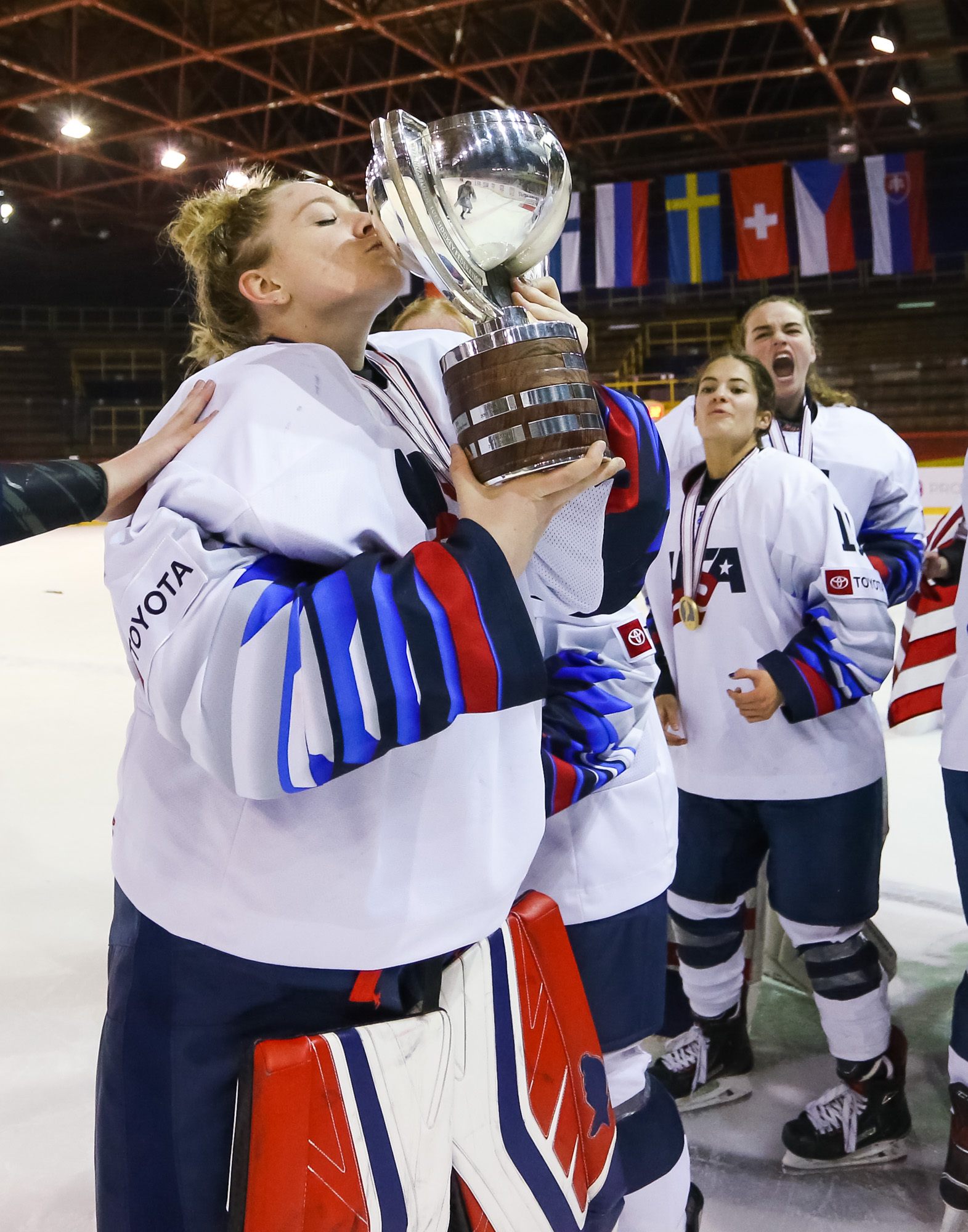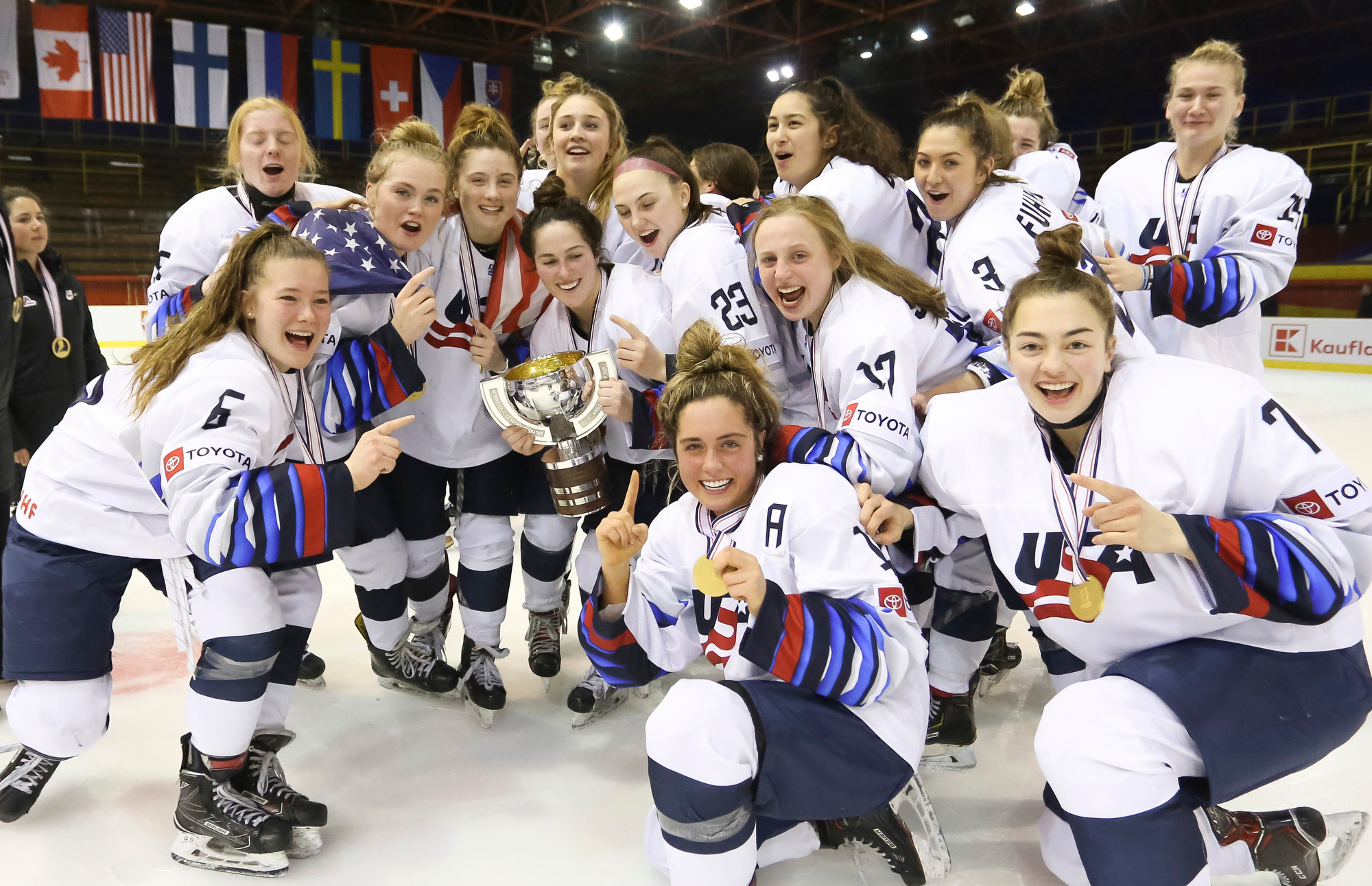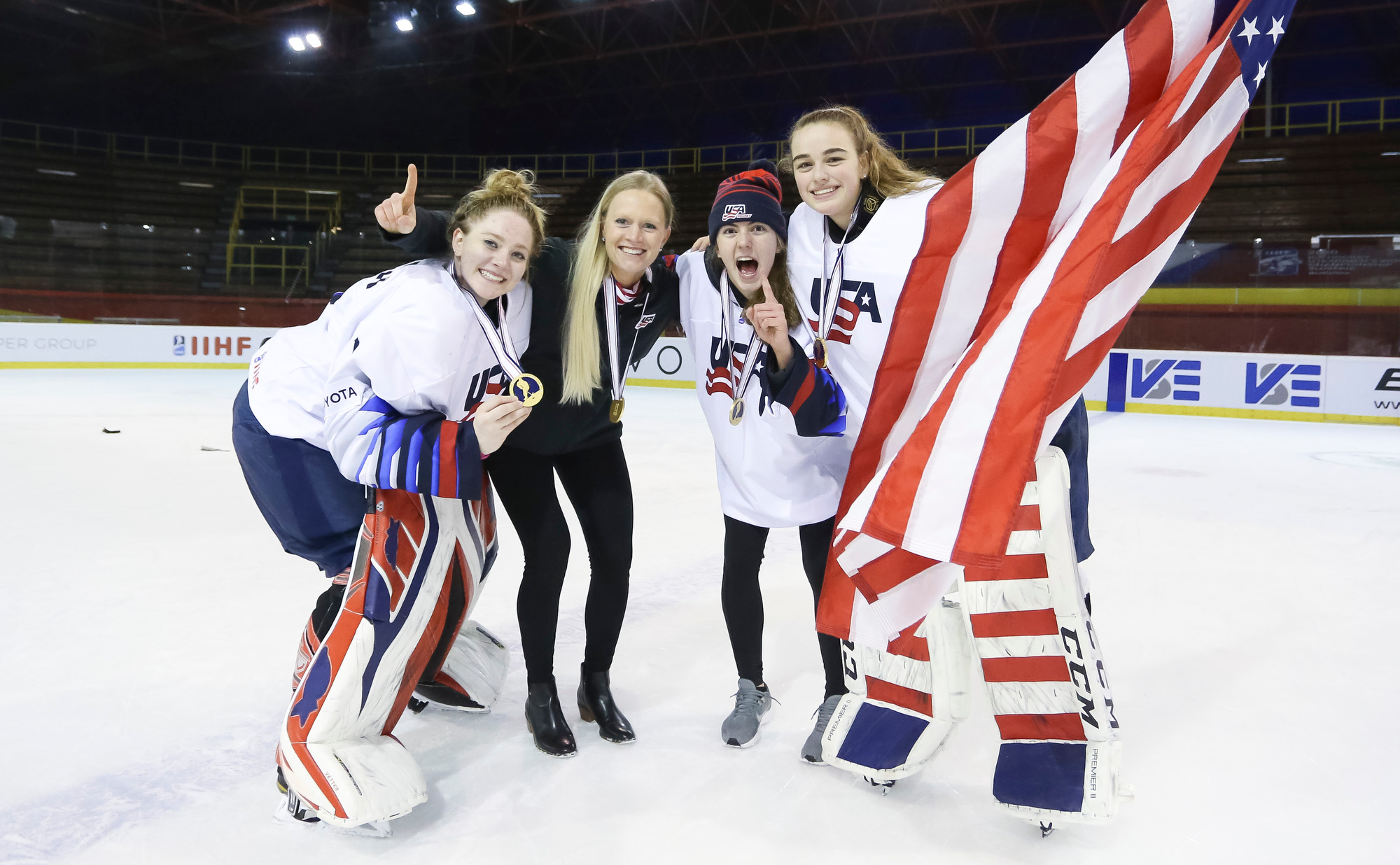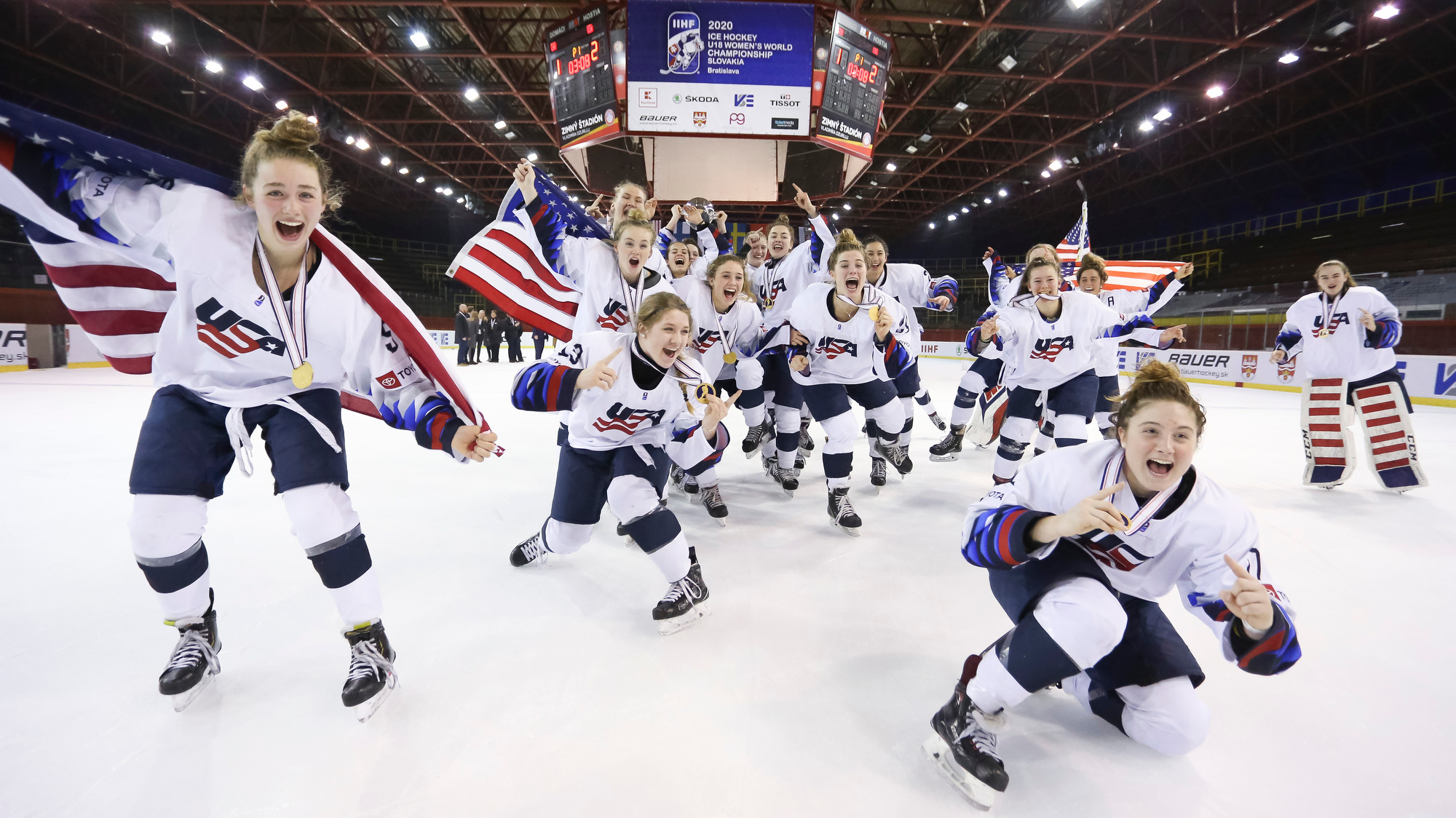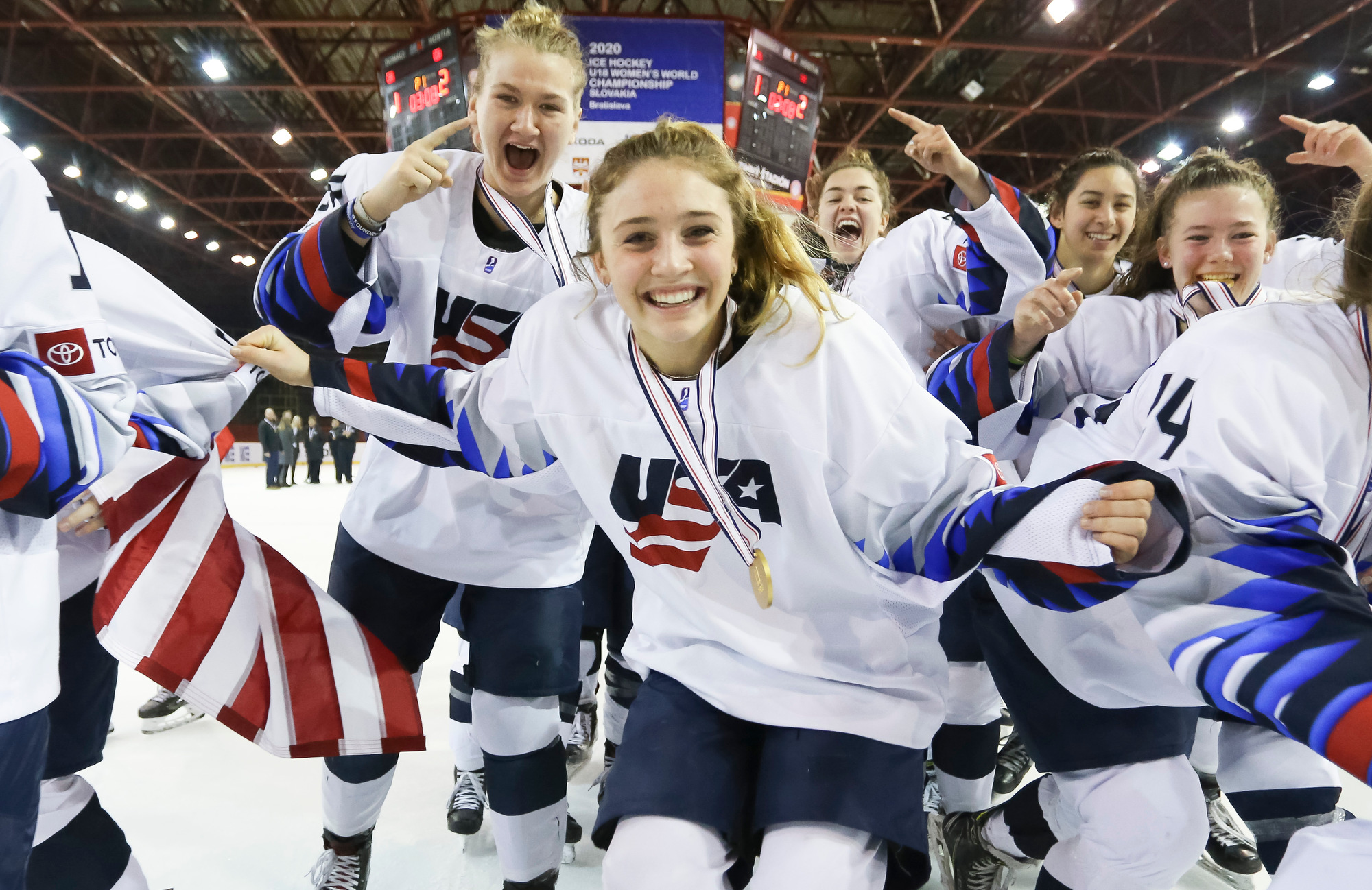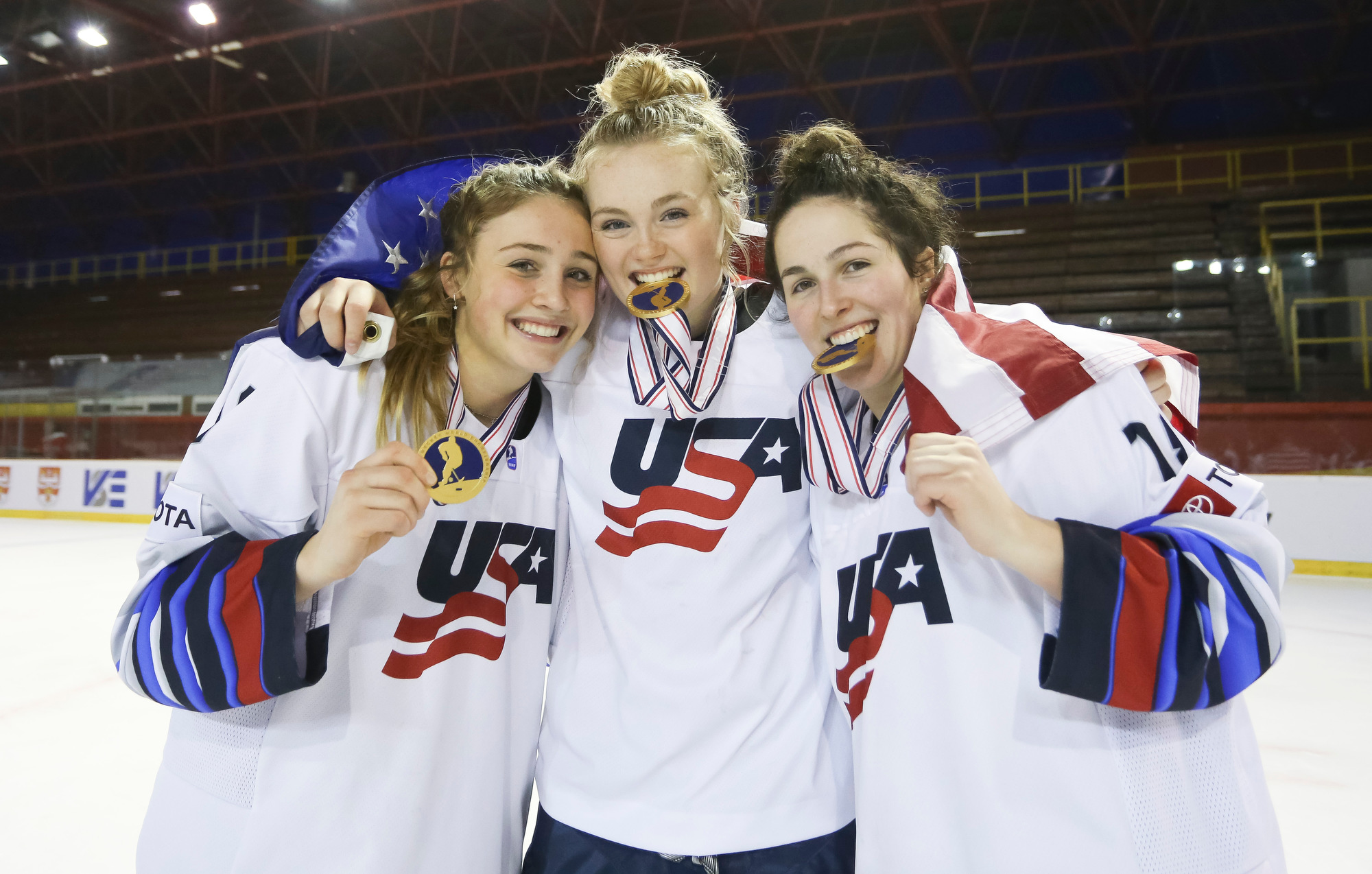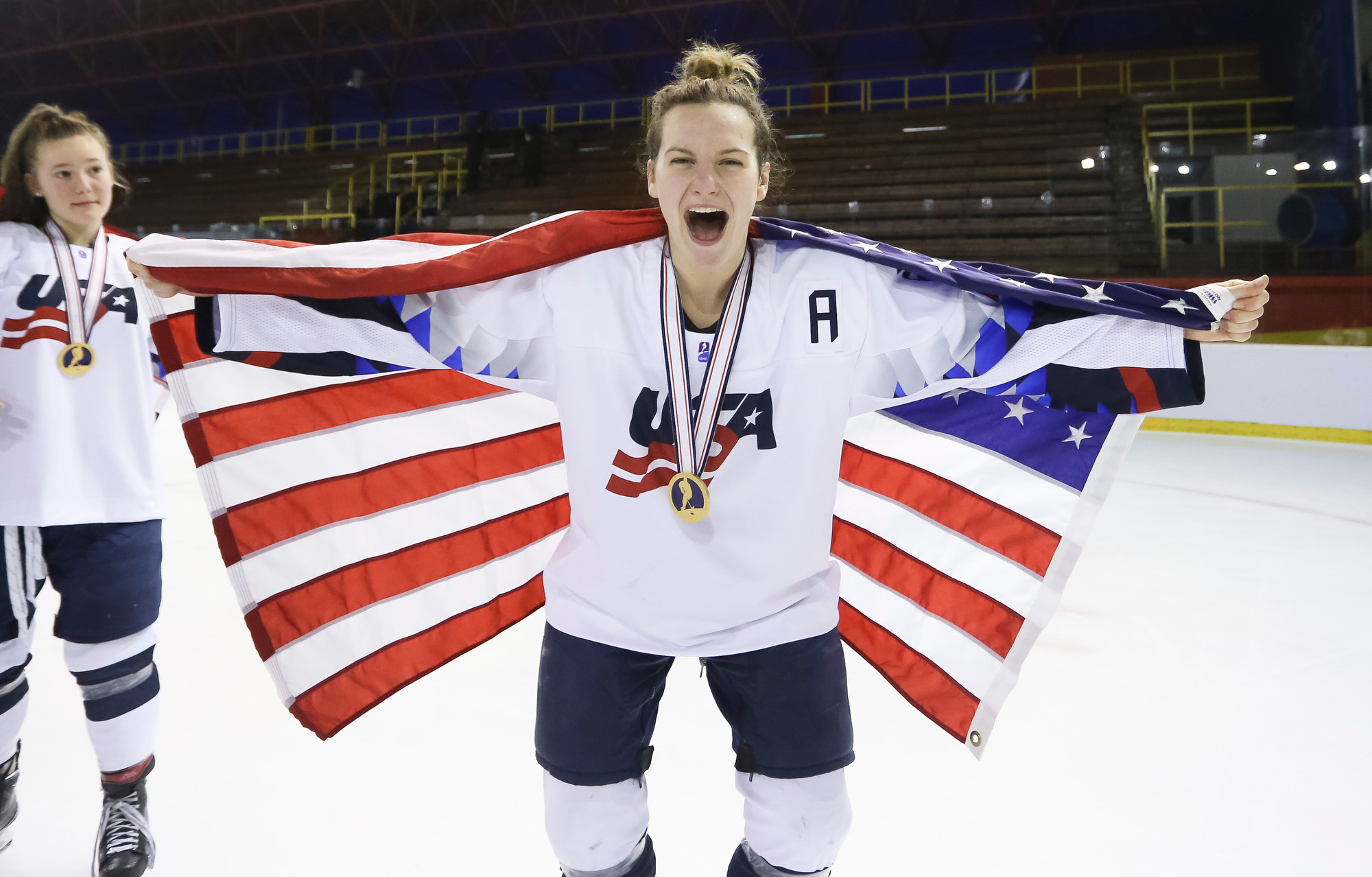Team USA is back on the throne. The Americans celebrate their 2020 IIHF Ice Hockey U18 Women's World Championship gold medal win after beating Canada in overtime.
photo: Steve Kingsman / HHOF-IIHF Images
It was the game everyone was waiting for. The United States and Canada came together to test their mettle in a battle royale for gold at the 2020 IIHF Ice Hockey U18 Women’s World Championship, and admittedly for the 12th time in the last 13 years.
The Vladimir Dzurilla Arena in Bratislava welcomed its biggest crowd of the tournament to see the world’s top-two teams at this level put on an ice hockey spectacle and they didn’t disappoint.
From the first drop of the puck, the arch rivals fought for every centimetre of ice with the USA creating the bulk of the sustained pressure while Canada had the upper hand in odd-woman rushes, none more glaring than when U.S. defender Mia Biotti unintentionally lost the puck in her own zone while looking for passing options, giving Canada a breakaway just nine minutes into the game, but U.S. goalie Skylar Vetter was up to the task with a strong stick save. It would become one of many.
“Honestly, for me, I try to stay calm,” says Vetter about the challenges of tending the net in a game of this magnitude. “I like things to move fast. I like a fast pace. But in my mind, I’m slowing things down. I’m reading what’s going on. If a goal is let in, I stay calm and keep encouraging my team.”
Intense first period play continued until a stoppage was needed after two U.S. players inadvertently collided at top speed in Canada’s zone, both needing a while to be able to get up. Emma Gentry, one of the heroes in the semi-final victory over Russia, took the brunt of the collision, effectively taking her out of play for most of the night.
An Alyssa McLeod penalty in the 12th minute of play gave the U.S. a power play, which the team used to put Canadian goaltender Eve Gascon to the test. A half dozen solid shots made their way to the net as the U.S. moved the puck with aplomb, but with nothing to show for it. The same would not be the case in the 14th minute of play, when – on the next U.S. power play – Abbey Murphy was able to grab the puck in the high slot and put a well-placed wrister over the shoulder of Gascon for the 1-0 lead.
Murphy must have been hungry for statistics, because she took the game’s next penalty at the 16:49 mark. Canada wasted no time in creating pressure over the first minute of their advantage, but the U.S. was able to keep the Canadians out of the zone for the rest of the period – with one exception.
A Kendall Cooper hooking penalty was taken in the 20th minute and after three highly dangerous U.S. set-ups, a puck snuck out of the zone, allowing Canadian forward Jenna Buglioni, later named to the tournament’s all-star team, to skate in on the U.S. goal uncontested. Once again, Vetter closed the door.
The second period started off in the same manner, with the U.S. immediately setting up shop in Canada’s zone on the power play. The constant pressure even led to the next Canadian penalty when Maddi Wheeler cross-checked her opponent into the boards, a sound heard clearly throughout the arena. The 5-on-3 only lasted shortly and Canada then killed off the rest of the penalty, which however was spent almost entirely in Canada’s zone, with constant U.S. rotation keeping the defence busy.
Canada would then get a power play of their own and although no goal could be scored, it clearly changed the feel for the game. For the next 15 minutes, the puck regularly found its way into the U.S. zone, where Canada threw puck after puck towards the Americans’ net. With that, the team’s confidence seemed to just grow and grow, causing the U.S. horrendous problems in getting out of its own zone, Canada often managing to keep in even the desperation attempts to clear the zone. Aside from an unsuccessful 2-on-1 halfway through the period, the U.S. just couldn’t create the highly dangerous chances it had aplenty in the first period.
With roughly two minutes to go in the period, things got very interesting when a puck slipped through the neutral zone behind the U.S. defenders. With Canada in hot pursuit, Vetter exited her goal crease and raced for the puck, just barely getting to and then slipping it by the oncoming attacker. However, the clearing attempt went straight to the next Canadian player who – much to the profit of Team USA – didn’t fully realize that Vetter was still out of her net, ultimately choosing to calmly set up controlled puck possession instead.
A slashing penalty assessed to U.S. captain Maggie Nicholson in the 40th minute of play allowed Canada to create several more scoring opportunities before the period came to an end.
The Vladimir Dzurilla Arena in Bratislava welcomed its biggest crowd of the tournament to see the world’s top-two teams at this level put on an ice hockey spectacle and they didn’t disappoint.
From the first drop of the puck, the arch rivals fought for every centimetre of ice with the USA creating the bulk of the sustained pressure while Canada had the upper hand in odd-woman rushes, none more glaring than when U.S. defender Mia Biotti unintentionally lost the puck in her own zone while looking for passing options, giving Canada a breakaway just nine minutes into the game, but U.S. goalie Skylar Vetter was up to the task with a strong stick save. It would become one of many.
“Honestly, for me, I try to stay calm,” says Vetter about the challenges of tending the net in a game of this magnitude. “I like things to move fast. I like a fast pace. But in my mind, I’m slowing things down. I’m reading what’s going on. If a goal is let in, I stay calm and keep encouraging my team.”
Intense first period play continued until a stoppage was needed after two U.S. players inadvertently collided at top speed in Canada’s zone, both needing a while to be able to get up. Emma Gentry, one of the heroes in the semi-final victory over Russia, took the brunt of the collision, effectively taking her out of play for most of the night.
An Alyssa McLeod penalty in the 12th minute of play gave the U.S. a power play, which the team used to put Canadian goaltender Eve Gascon to the test. A half dozen solid shots made their way to the net as the U.S. moved the puck with aplomb, but with nothing to show for it. The same would not be the case in the 14th minute of play, when – on the next U.S. power play – Abbey Murphy was able to grab the puck in the high slot and put a well-placed wrister over the shoulder of Gascon for the 1-0 lead.
Murphy must have been hungry for statistics, because she took the game’s next penalty at the 16:49 mark. Canada wasted no time in creating pressure over the first minute of their advantage, but the U.S. was able to keep the Canadians out of the zone for the rest of the period – with one exception.
A Kendall Cooper hooking penalty was taken in the 20th minute and after three highly dangerous U.S. set-ups, a puck snuck out of the zone, allowing Canadian forward Jenna Buglioni, later named to the tournament’s all-star team, to skate in on the U.S. goal uncontested. Once again, Vetter closed the door.
The second period started off in the same manner, with the U.S. immediately setting up shop in Canada’s zone on the power play. The constant pressure even led to the next Canadian penalty when Maddi Wheeler cross-checked her opponent into the boards, a sound heard clearly throughout the arena. The 5-on-3 only lasted shortly and Canada then killed off the rest of the penalty, which however was spent almost entirely in Canada’s zone, with constant U.S. rotation keeping the defence busy.
Canada would then get a power play of their own and although no goal could be scored, it clearly changed the feel for the game. For the next 15 minutes, the puck regularly found its way into the U.S. zone, where Canada threw puck after puck towards the Americans’ net. With that, the team’s confidence seemed to just grow and grow, causing the U.S. horrendous problems in getting out of its own zone, Canada often managing to keep in even the desperation attempts to clear the zone. Aside from an unsuccessful 2-on-1 halfway through the period, the U.S. just couldn’t create the highly dangerous chances it had aplenty in the first period.
With roughly two minutes to go in the period, things got very interesting when a puck slipped through the neutral zone behind the U.S. defenders. With Canada in hot pursuit, Vetter exited her goal crease and raced for the puck, just barely getting to and then slipping it by the oncoming attacker. However, the clearing attempt went straight to the next Canadian player who – much to the profit of Team USA – didn’t fully realize that Vetter was still out of her net, ultimately choosing to calmly set up controlled puck possession instead.
A slashing penalty assessed to U.S. captain Maggie Nicholson in the 40th minute of play allowed Canada to create several more scoring opportunities before the period came to an end.
Canada vs. USA (Gold) - 2020 IIHF Ice Hockey U18 Women's World Championship
CAN vs. USA
As everyone in the building surely expected, the teams came out flying in the third period. Particularly the Americans recaptured the flair they had in the first period, likely due to whatever words of inspiration and motivation coach Maura Crowell found in the locker room. The team came out like gangbusters, immediately giving the Canadian fits.
“We had moved ahead. Honestly, our second periods haven’t been the greatest at this tournament,” explained U.S. coach Maura Crowell. “We can’t change what’s happened in the past. You’ve got to move ahead and concentrate on what you can change and what you can do better. We wanted to play more on our toes and be more offensive. We didn’t want to give the Canadians too much room, because when you give them room, they can make plays.”
Alas, the Canadians were given just that when they went on the power play in the 44th minute of play, which they used to jumpstart their game.
With just seconds remaining on the penalty, Ann-Frederik Naud found Sarah Paul heading to the net and made a perfect pass from behind the U.S. goal line. A tap in notched the game at one and with that, the cards had been reshuffled and a whole new level of excitement took over the show.
Back and forth the teams went, exchanging thrilling attack after thrilling attack. It wasn’t an affair for the faint of heart. And it hit heart attack level when U.S. forward Lacey Eden was given a penalty for tripping in the 57th minute of play. The U.S. then found itself having to give it all to fend off Canada’s once again dangerous attack, which it did successfully, doing so in front of crowd that was pretty much completely standing at this point.
If that wasn’t enough, things would get even more interesting.
With just 40 seconds to go in the game, Eden was once again given a penalty for tripping in the offensive zone when she reached for a puck in the high slot and caught the leg of an opponent. With that, the U.S. not only had to end regulation time shorthanded, but continue into overtime that way if the game would get that far.
And it did, but not without one last Canadian opportunity to end it all with just two seconds to go. Defenceman Nicole Gosling was sighted sliding down the left-wing side and hit with a tape-to-tape pass. Her ensuing wrist shot flew over the high left corner of the goal, caroming around the board until the siren rang.
Whew – and then there was overtime.
But could it really end any other way than this?
Things got kicked off with Canada on a 4-on-3 power play for another minute and twenty seconds. With hearts pumping, the U.S. managed to stave off the penalty with several timely clears before Eden made her way back onto the ice and the game continued 4-on-4 with predominantly U.S. pressure in Canada’s zone.
Once Gascon managed to get her glove on a puck, things went back to the intended 3-on-3 scenario. The kind of play where every attack looked like it would be the last.
And it almost was the last when Kiara Zanon took the puck to the net and tried to deke out Gascon leading to a follow-up opportunity by teammate Audrey Wethington. But Gascon wasn’t ready to let things end that early.
And on and on it went. The U.S. overtime tactic was based on puck protection and attempts to outskate Canada in one-on-one battles while the Canadians looked to keep things conservative until the counterattack opportunities would rear their pretty heads.
Just that happened when a U.S. shot in the 13th minute during a short 2-on-0 situation in front of the net hit the post and was followed by a Canadian breakaway, which Vetter was able to get a piece of, deflecting it up to the glass.
It was only the beginning of what became many, many heart-stopping moments, none more so than the 2-on-0 break that an aggressive neutral zone forecheck led to for the USA.
In a moment of fate and irony that could hardly have been scripted better for a Hollywood film, U.S. captain Nicholson, who wears the number four, was in the middle of turnover that saw the puck punched away from Canadian captain Cooper, who also wears the number four, and who had the tournament’s best plus/minus statistic heading into the final, then raced towards the Canadian net with her teammate Zanon following her close behind. Faking to the backhand as if she intended deke out Gascon on her own, she then dished a subtle backhand pass to Zanon, who needed to do little more than tuck the biscuit into a wide-open net.
And that she did, as if she had been born for this moment.
“We were at the end of a long shift and I saw Maggie putting pressure on their defenseman,” stated Zanon. “Maggie had a one on zero with the back-checker coming down hard. So I tried to beat that back-checker. She made a beautiful pass and I just had to tuck it home.”
“I saw Kiara (Zanon) poking the puck away and I just knew to skate. I knew we had to take advantage of this,” explained Nicholson in describing the highlight reel game-winning goal.
“We had moved ahead. Honestly, our second periods haven’t been the greatest at this tournament,” explained U.S. coach Maura Crowell. “We can’t change what’s happened in the past. You’ve got to move ahead and concentrate on what you can change and what you can do better. We wanted to play more on our toes and be more offensive. We didn’t want to give the Canadians too much room, because when you give them room, they can make plays.”
Alas, the Canadians were given just that when they went on the power play in the 44th minute of play, which they used to jumpstart their game.
With just seconds remaining on the penalty, Ann-Frederik Naud found Sarah Paul heading to the net and made a perfect pass from behind the U.S. goal line. A tap in notched the game at one and with that, the cards had been reshuffled and a whole new level of excitement took over the show.
Back and forth the teams went, exchanging thrilling attack after thrilling attack. It wasn’t an affair for the faint of heart. And it hit heart attack level when U.S. forward Lacey Eden was given a penalty for tripping in the 57th minute of play. The U.S. then found itself having to give it all to fend off Canada’s once again dangerous attack, which it did successfully, doing so in front of crowd that was pretty much completely standing at this point.
If that wasn’t enough, things would get even more interesting.
With just 40 seconds to go in the game, Eden was once again given a penalty for tripping in the offensive zone when she reached for a puck in the high slot and caught the leg of an opponent. With that, the U.S. not only had to end regulation time shorthanded, but continue into overtime that way if the game would get that far.
And it did, but not without one last Canadian opportunity to end it all with just two seconds to go. Defenceman Nicole Gosling was sighted sliding down the left-wing side and hit with a tape-to-tape pass. Her ensuing wrist shot flew over the high left corner of the goal, caroming around the board until the siren rang.
Whew – and then there was overtime.
But could it really end any other way than this?
Things got kicked off with Canada on a 4-on-3 power play for another minute and twenty seconds. With hearts pumping, the U.S. managed to stave off the penalty with several timely clears before Eden made her way back onto the ice and the game continued 4-on-4 with predominantly U.S. pressure in Canada’s zone.
Once Gascon managed to get her glove on a puck, things went back to the intended 3-on-3 scenario. The kind of play where every attack looked like it would be the last.
And it almost was the last when Kiara Zanon took the puck to the net and tried to deke out Gascon leading to a follow-up opportunity by teammate Audrey Wethington. But Gascon wasn’t ready to let things end that early.
And on and on it went. The U.S. overtime tactic was based on puck protection and attempts to outskate Canada in one-on-one battles while the Canadians looked to keep things conservative until the counterattack opportunities would rear their pretty heads.
Just that happened when a U.S. shot in the 13th minute during a short 2-on-0 situation in front of the net hit the post and was followed by a Canadian breakaway, which Vetter was able to get a piece of, deflecting it up to the glass.
It was only the beginning of what became many, many heart-stopping moments, none more so than the 2-on-0 break that an aggressive neutral zone forecheck led to for the USA.
In a moment of fate and irony that could hardly have been scripted better for a Hollywood film, U.S. captain Nicholson, who wears the number four, was in the middle of turnover that saw the puck punched away from Canadian captain Cooper, who also wears the number four, and who had the tournament’s best plus/minus statistic heading into the final, then raced towards the Canadian net with her teammate Zanon following her close behind. Faking to the backhand as if she intended deke out Gascon on her own, she then dished a subtle backhand pass to Zanon, who needed to do little more than tuck the biscuit into a wide-open net.
And that she did, as if she had been born for this moment.
“We were at the end of a long shift and I saw Maggie putting pressure on their defenseman,” stated Zanon. “Maggie had a one on zero with the back-checker coming down hard. So I tried to beat that back-checker. She made a beautiful pass and I just had to tuck it home.”
“I saw Kiara (Zanon) poking the puck away and I just knew to skate. I knew we had to take advantage of this,” explained Nicholson in describing the highlight reel game-winning goal.
I knew that Kiara was skating up with me and had faith in her that if I’d get that puck over to her, she’d put it into the net. And that’s just what she did.
Cheers filled the arena while the floor was filled with plenty of jaws as well. The final strike had been made and was followed by all three Americans on the ice throwing their sticks and gloves into the air, jumping in celebration until they collided, joined in short by the entire U.S. bench.
For the fifth time in the last six years, and the eighth time in tournament history, the USA was the gold medal winner.
“This is the best feeling ever,” said Vetter. “Especially after what happened to us last year (when Canada took gold). We just came back and we wanted to get this one so badly. And we did. We’re just so happy about this.”
The celebrations found no real end for the Americans, who sang the national anthem at the top of their lungs, arm in arm, and then grabbed the tournament’s cup as if it were Lord Stanley’s itself.
Nicholson summarized: “We’ve preached about sticking together and playing as a team. The entire time, we’ve had faith in each other and have believed ‘we can do it’. We put faith in our training, going all the way back to April, and we trusted in our work. I think that really showed in this game, especially because we were relentless. That’s one of the team values we focus on the most. I don’t think there was a better way we could have won this game.”
Vetter added: “We’re never too high and never too low. For us, the game is always 0-0. We trust in everybody on the team. We’re such a close team. We’re like family. It’s the best feeling to be able to share this moment together now.”
For Canada, there was nothing to hang their heads about. Either team would have been the well-earned victor. “I think we’ve got a great product and the women’s game is growing in leaps and bounds every year. It’s an outstanding sport to watch,” stated Canadian head coach Howie Draper, clearly aware of how special this game was in showing just how wonderful this sport is.
“Obviously it’s tough for us to leave the ice without the gold medal, but we’ve got a lot of really good things happening with our group. We’ve come together throughout this journey. We’re a very tight-knit group and there’s a tremendous amount of support around that dressing room,” he continued.
“That’s ultimately, I think, is the most important thing, that people come together and do some great things as a group. You can’t lose. You know, this is the message at the end of this game. The other thing is that you’ve got to learn from such an experience and build on it. These are young hockey players and they have a lot of growth ahead of them and a lot of opportunities ahead of them. Now they need to look forward to those.”
His team’s captain, Cooper, was able to sum up what was the closest of all defeats, “Sure, this was a tough, tough loss, but it was a game of inches and centimetres. I’m just so proud of this team and all the effort we’ve put into being here and doing this.”
For the fifth time in the last six years, and the eighth time in tournament history, the USA was the gold medal winner.
“This is the best feeling ever,” said Vetter. “Especially after what happened to us last year (when Canada took gold). We just came back and we wanted to get this one so badly. And we did. We’re just so happy about this.”
The celebrations found no real end for the Americans, who sang the national anthem at the top of their lungs, arm in arm, and then grabbed the tournament’s cup as if it were Lord Stanley’s itself.
Nicholson summarized: “We’ve preached about sticking together and playing as a team. The entire time, we’ve had faith in each other and have believed ‘we can do it’. We put faith in our training, going all the way back to April, and we trusted in our work. I think that really showed in this game, especially because we were relentless. That’s one of the team values we focus on the most. I don’t think there was a better way we could have won this game.”
Vetter added: “We’re never too high and never too low. For us, the game is always 0-0. We trust in everybody on the team. We’re such a close team. We’re like family. It’s the best feeling to be able to share this moment together now.”
For Canada, there was nothing to hang their heads about. Either team would have been the well-earned victor. “I think we’ve got a great product and the women’s game is growing in leaps and bounds every year. It’s an outstanding sport to watch,” stated Canadian head coach Howie Draper, clearly aware of how special this game was in showing just how wonderful this sport is.
“Obviously it’s tough for us to leave the ice without the gold medal, but we’ve got a lot of really good things happening with our group. We’ve come together throughout this journey. We’re a very tight-knit group and there’s a tremendous amount of support around that dressing room,” he continued.
“That’s ultimately, I think, is the most important thing, that people come together and do some great things as a group. You can’t lose. You know, this is the message at the end of this game. The other thing is that you’ve got to learn from such an experience and build on it. These are young hockey players and they have a lot of growth ahead of them and a lot of opportunities ahead of them. Now they need to look forward to those.”
His team’s captain, Cooper, was able to sum up what was the closest of all defeats, “Sure, this was a tough, tough loss, but it was a game of inches and centimetres. I’m just so proud of this team and all the effort we’ve put into being here and doing this.”
It could have gone either way. It didn’t go our way today, but we’re going to continue to move forward and take the things we learned from this loss and improve.
For now, Team USA gets to see this gold medal as the culmination of their many months of work. It’s not just about the players. Or even the players and the coaching staff. It’s about everybody who has made this victory possible.
“It’s an amazing journey to get to this game,” Coach Crowell summed up. “To win it is another thing. For the players, the process started last spring, as it did for so many staff members. Yes, coaches, but also other people at USA Hockey who have given so much to help us even put together and pick this team. It’s also been about finding the right players, and not always the best players. It’s about putting the puzzle together. I’m so happy for everyone. This is life-long dream for all of those girls. Seeing those smiles after the game – well, that’s what we’re doing this for!”
The girls couldn’t stop smiling. And they don’t need to as this year’s chapter of the U18 Women’s World Championship wraps up. They can enjoy this for a while. Then it’ll be back to work.
After all, as this tournament went to show, everyone is gunning for them and the playing field at this level continues to get tighter.
“It’s an amazing journey to get to this game,” Coach Crowell summed up. “To win it is another thing. For the players, the process started last spring, as it did for so many staff members. Yes, coaches, but also other people at USA Hockey who have given so much to help us even put together and pick this team. It’s also been about finding the right players, and not always the best players. It’s about putting the puzzle together. I’m so happy for everyone. This is life-long dream for all of those girls. Seeing those smiles after the game – well, that’s what we’re doing this for!”
The girls couldn’t stop smiling. And they don’t need to as this year’s chapter of the U18 Women’s World Championship wraps up. They can enjoy this for a while. Then it’ll be back to work.
After all, as this tournament went to show, everyone is gunning for them and the playing field at this level continues to get tighter.
Canada vs. USA (Final) - 2020 IIHF Ice Hockey U18 Women's World Championship
OF
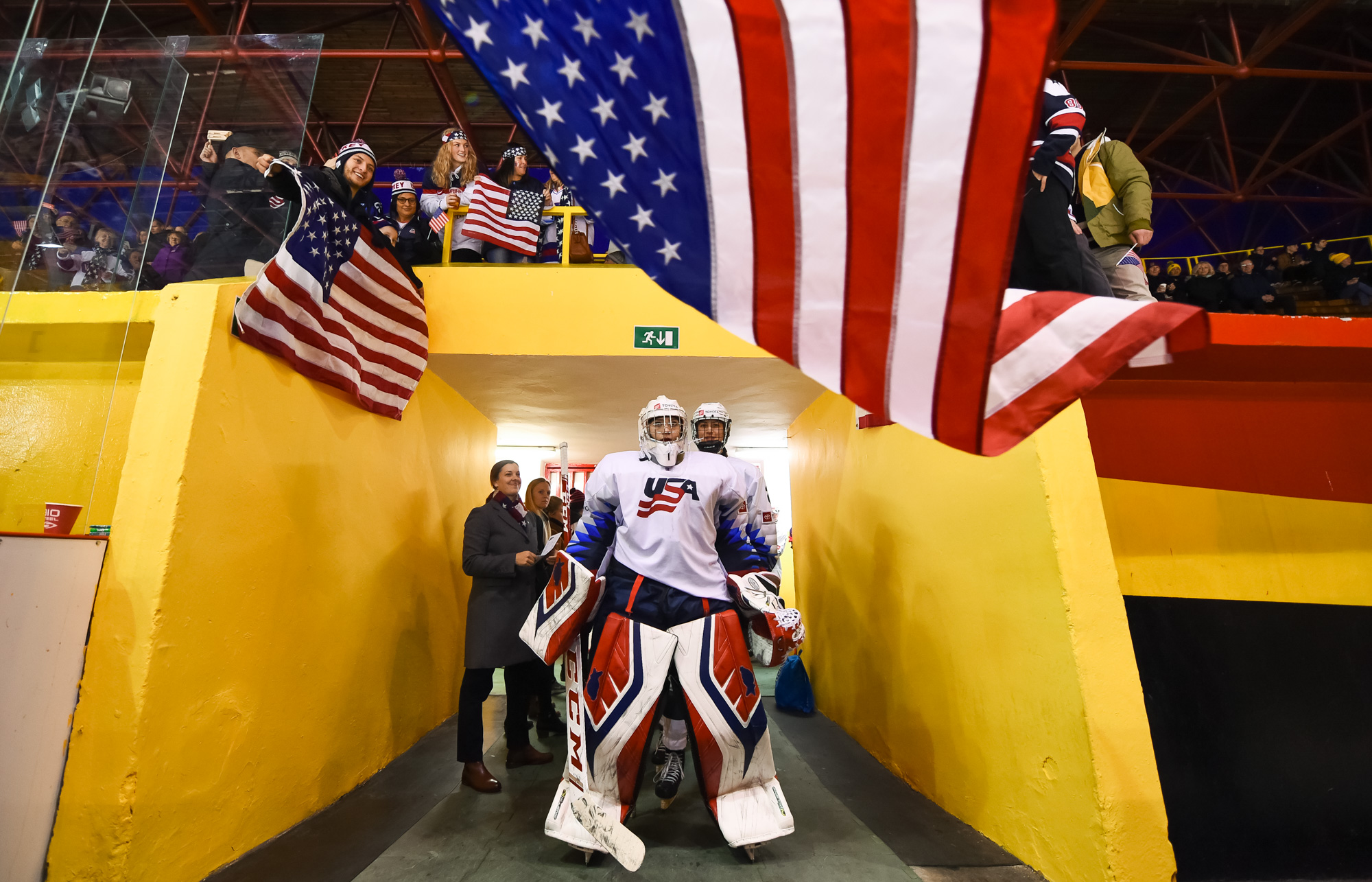
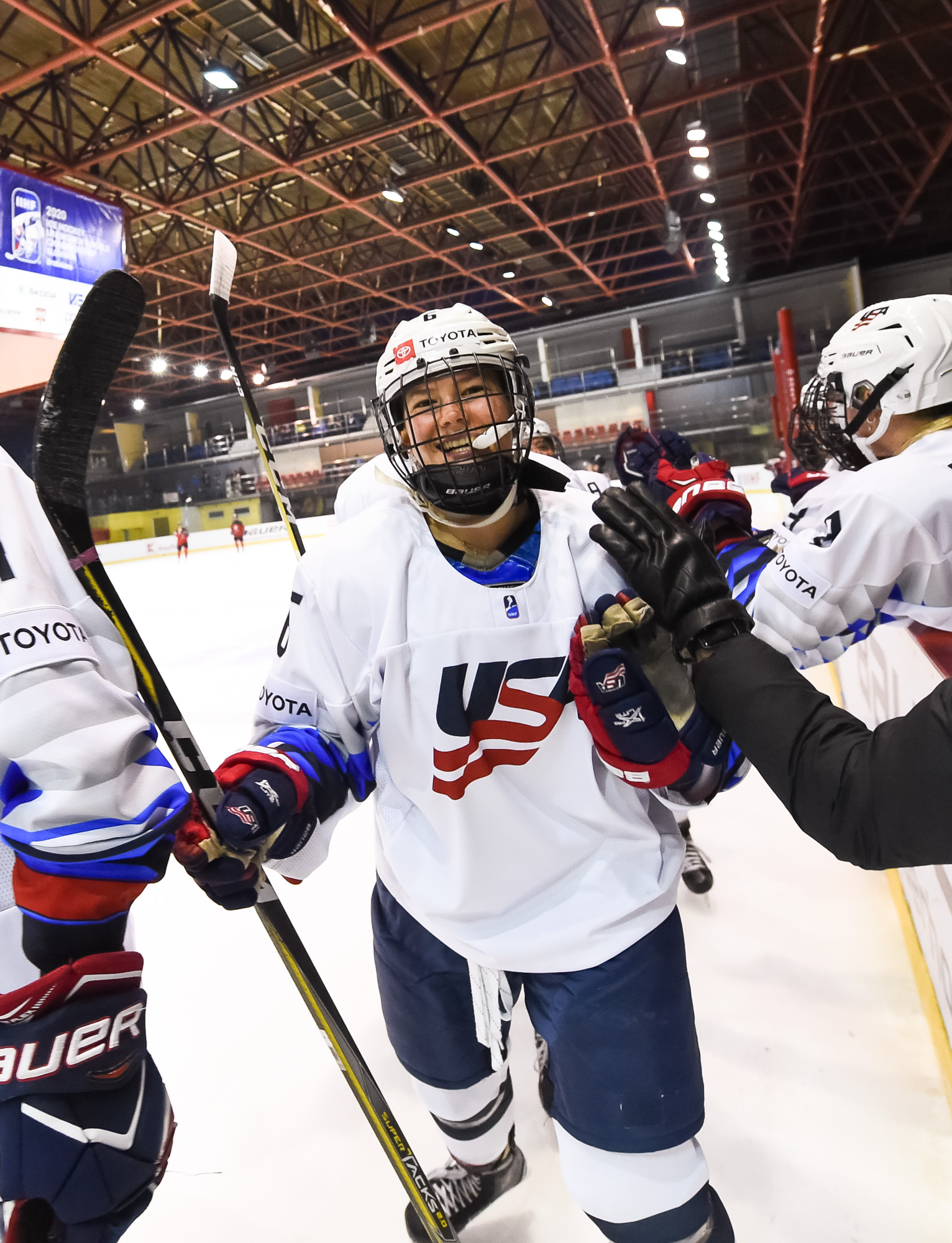
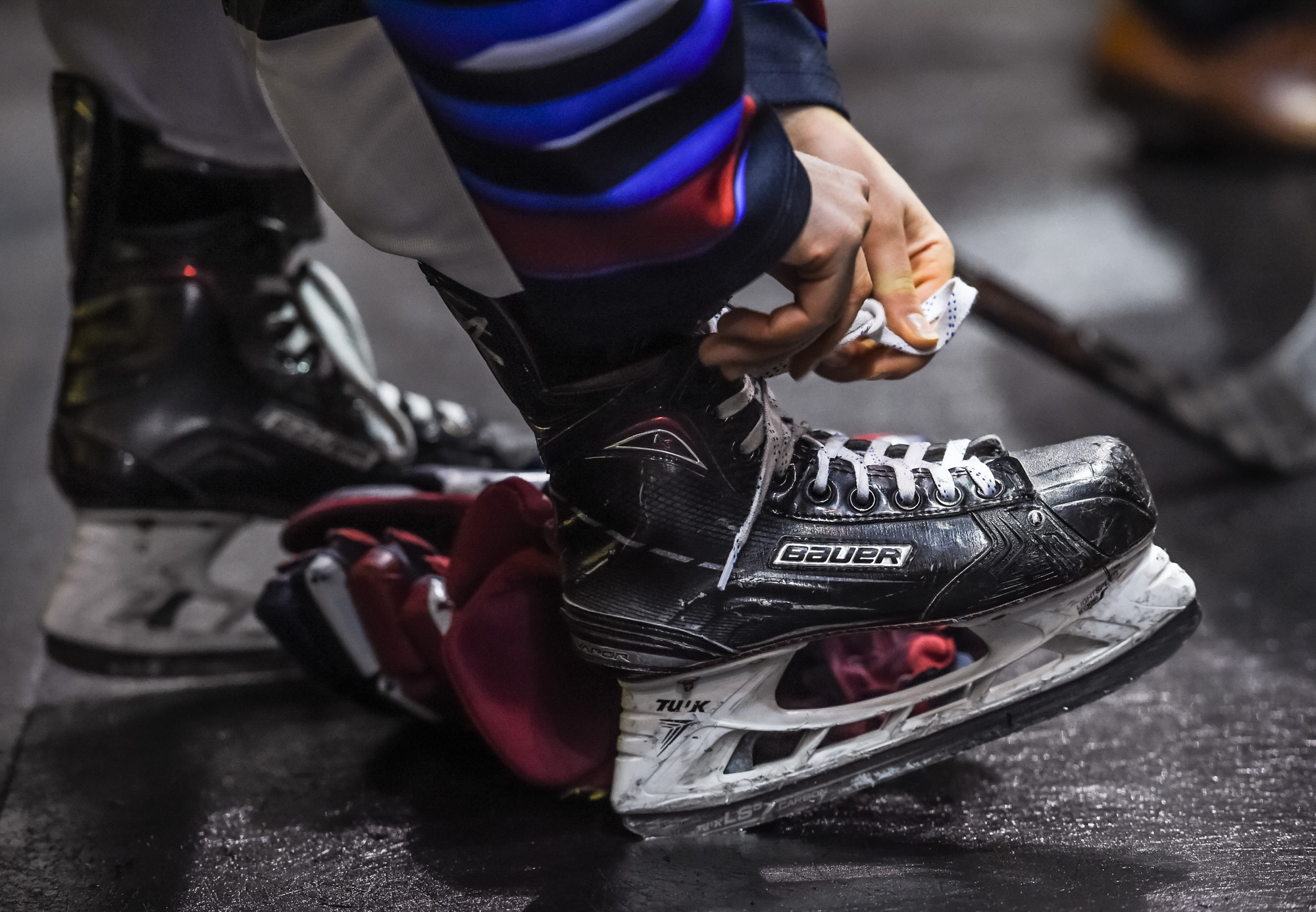
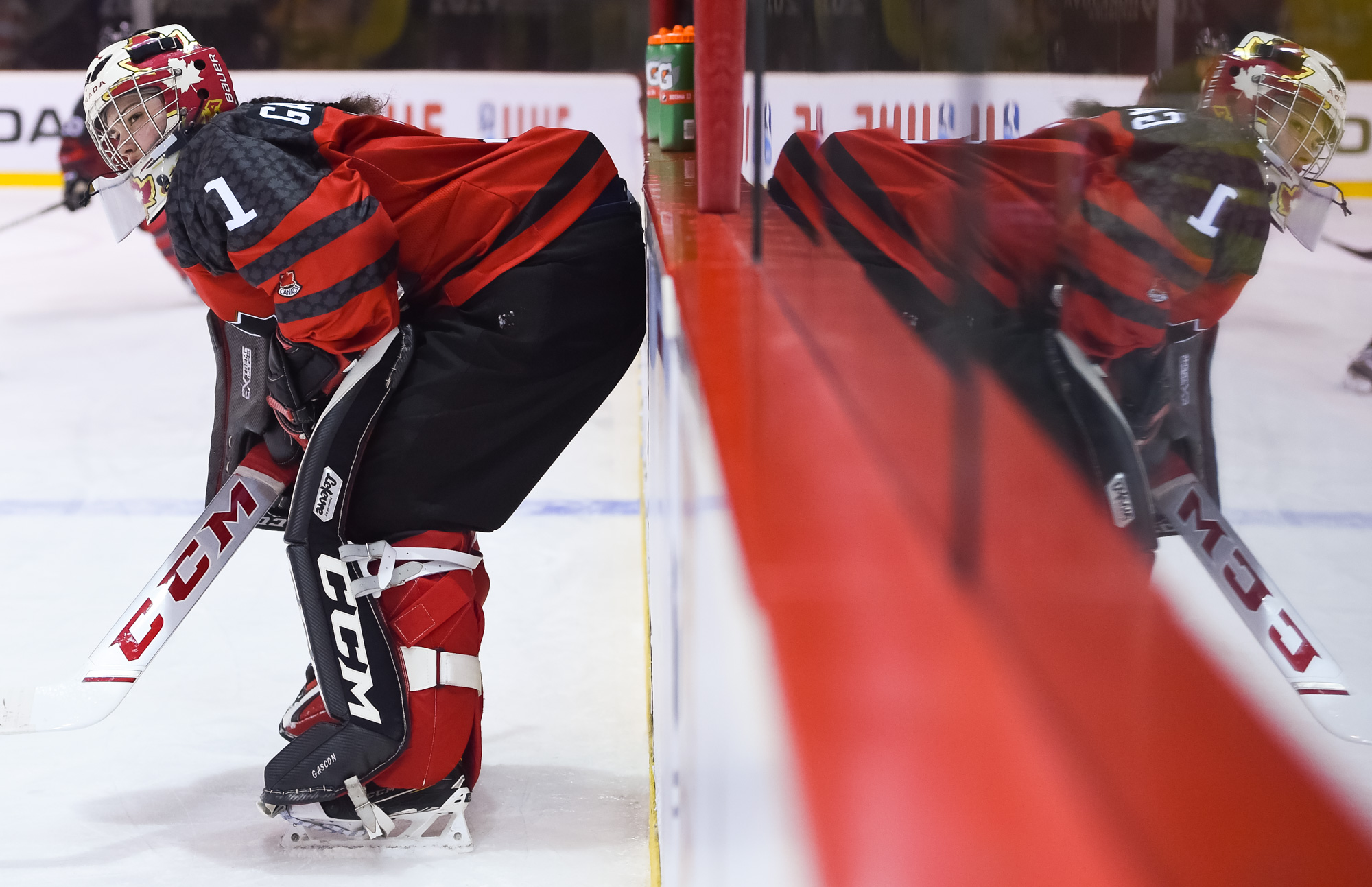
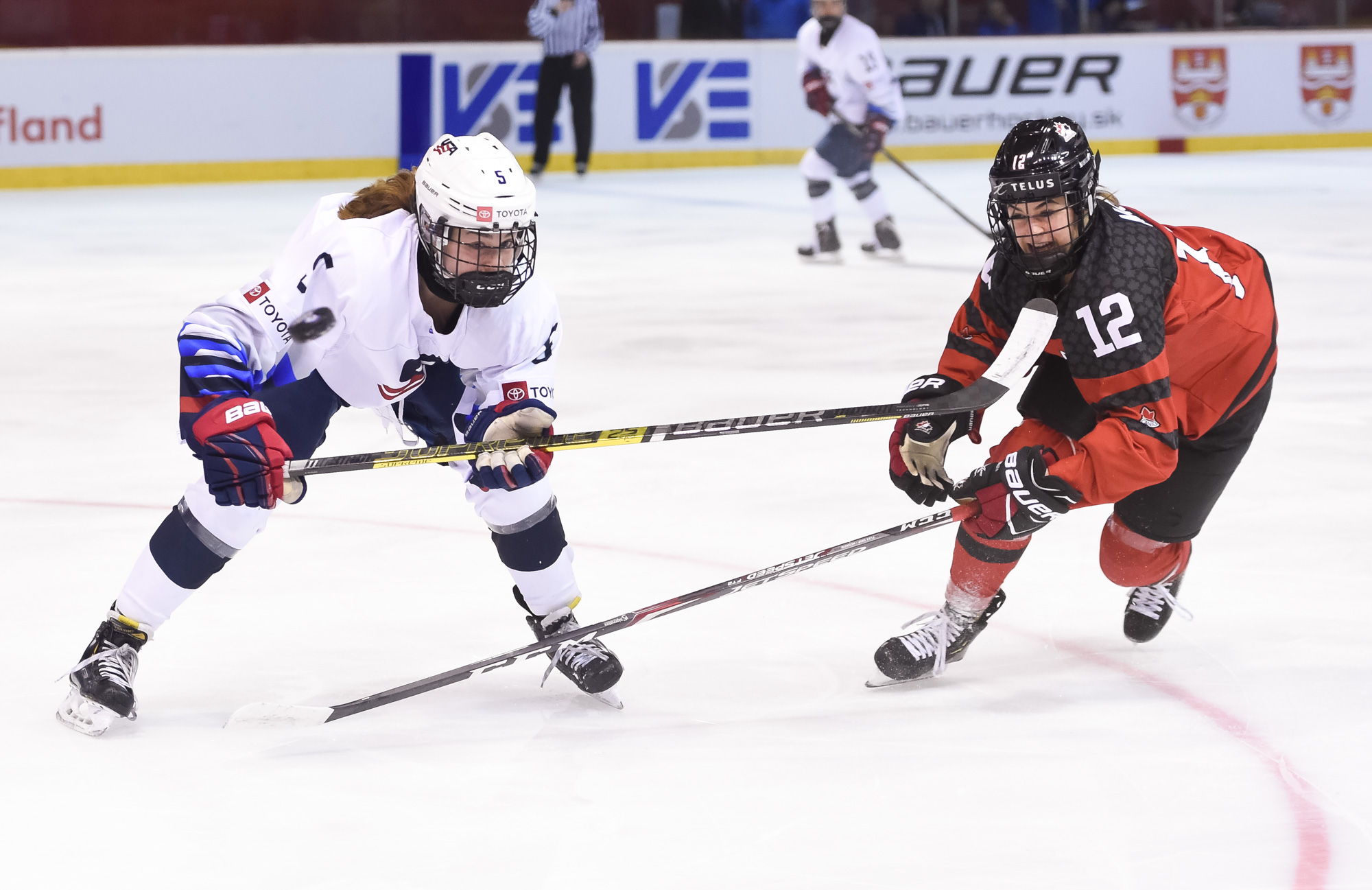
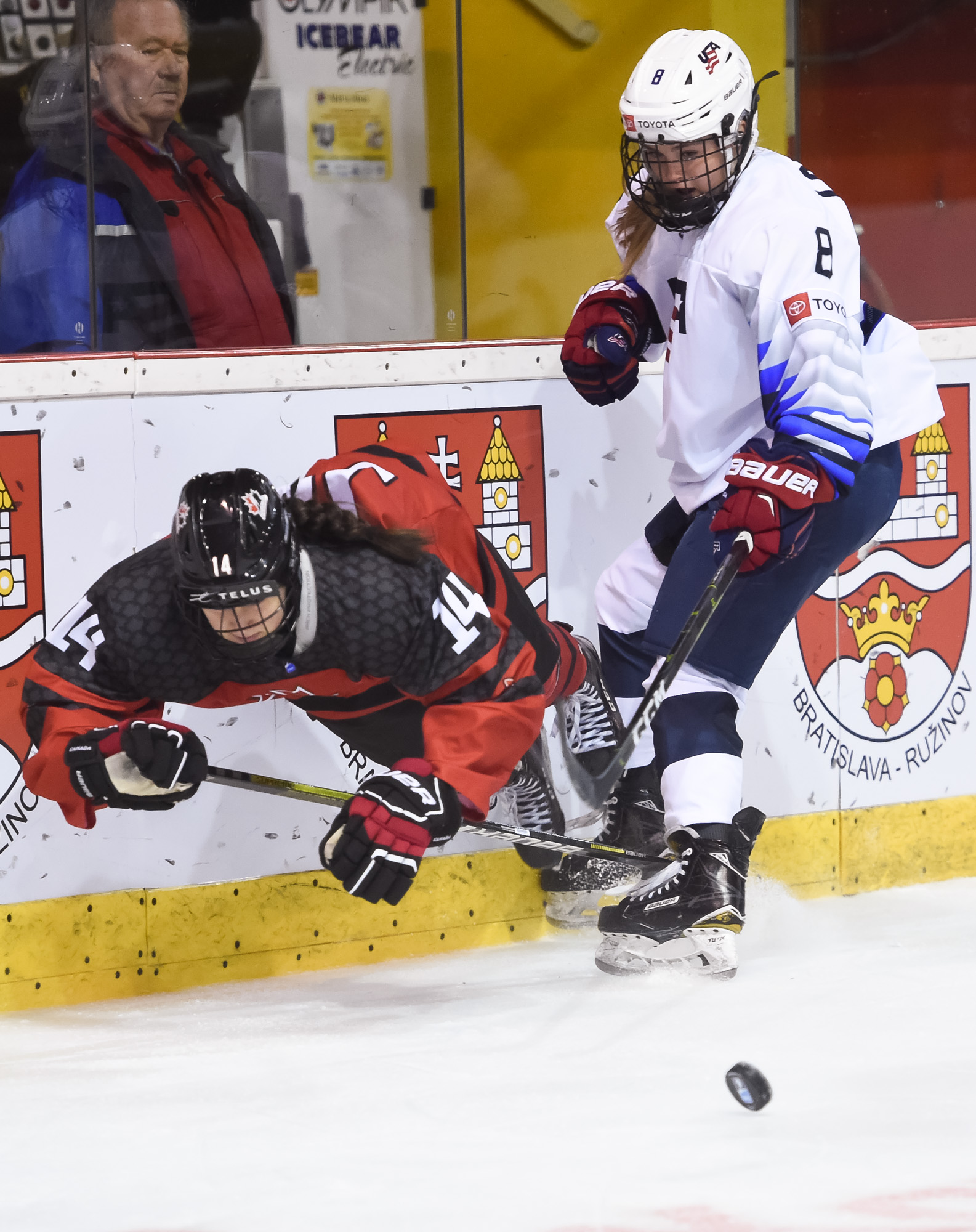
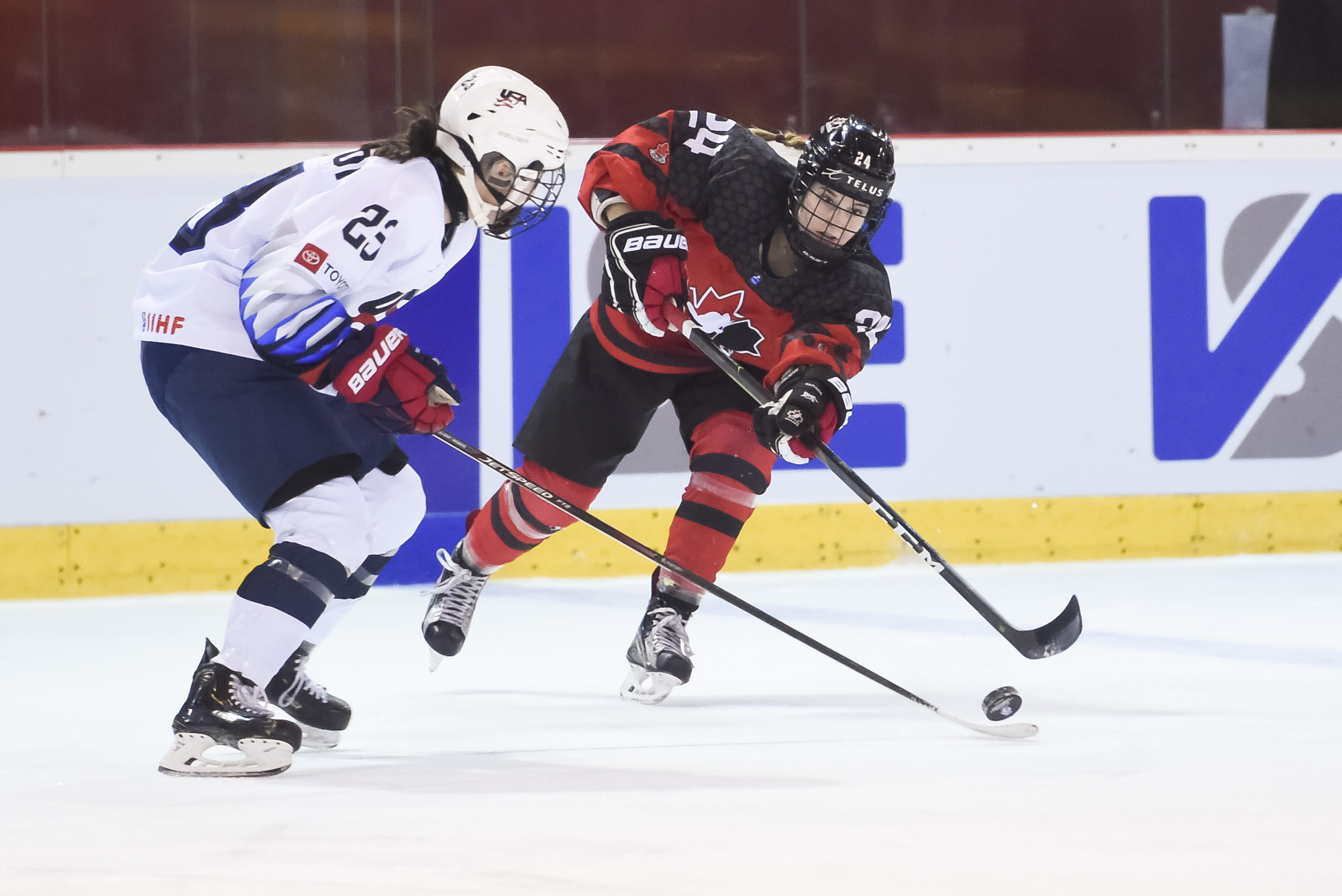
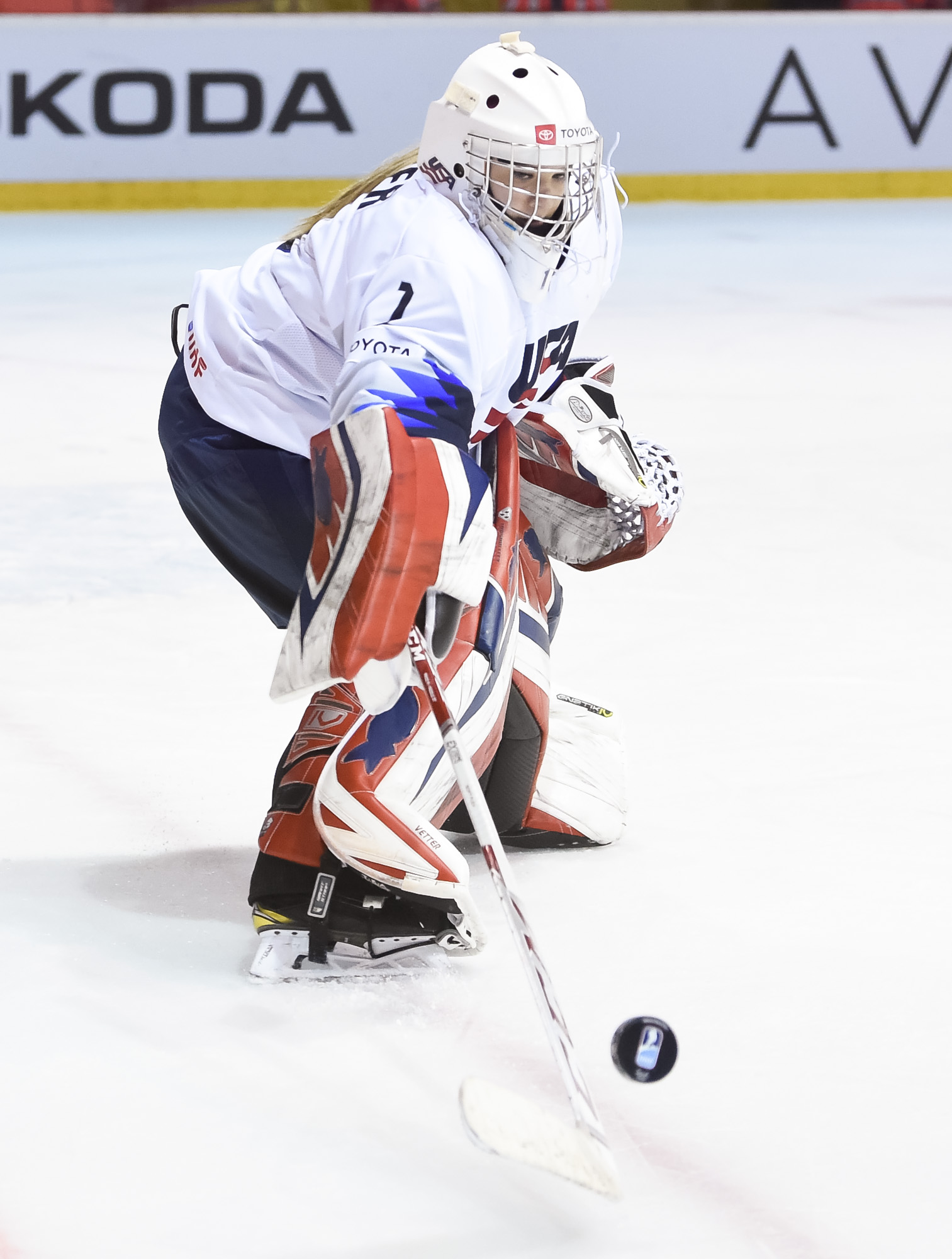
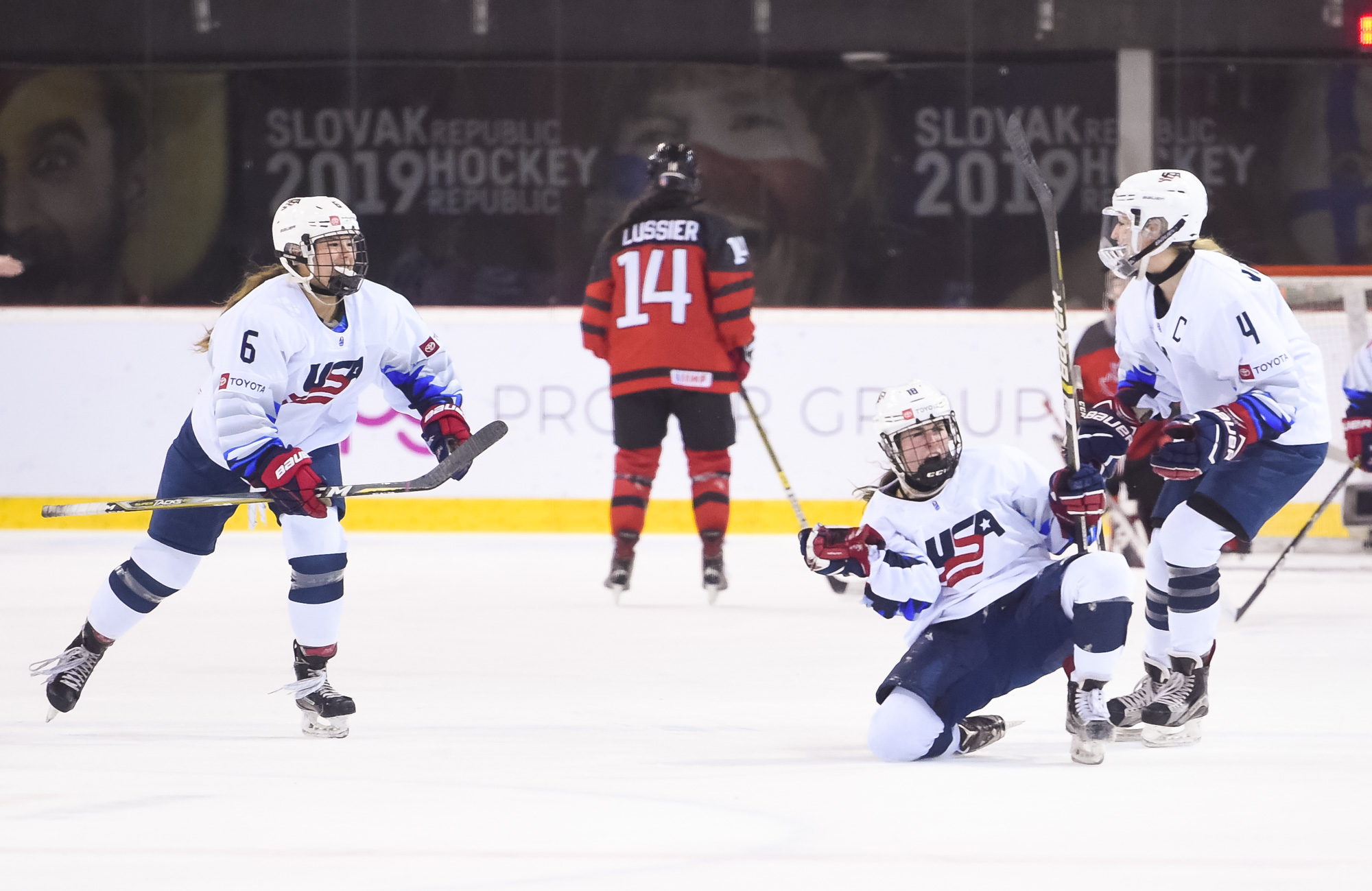
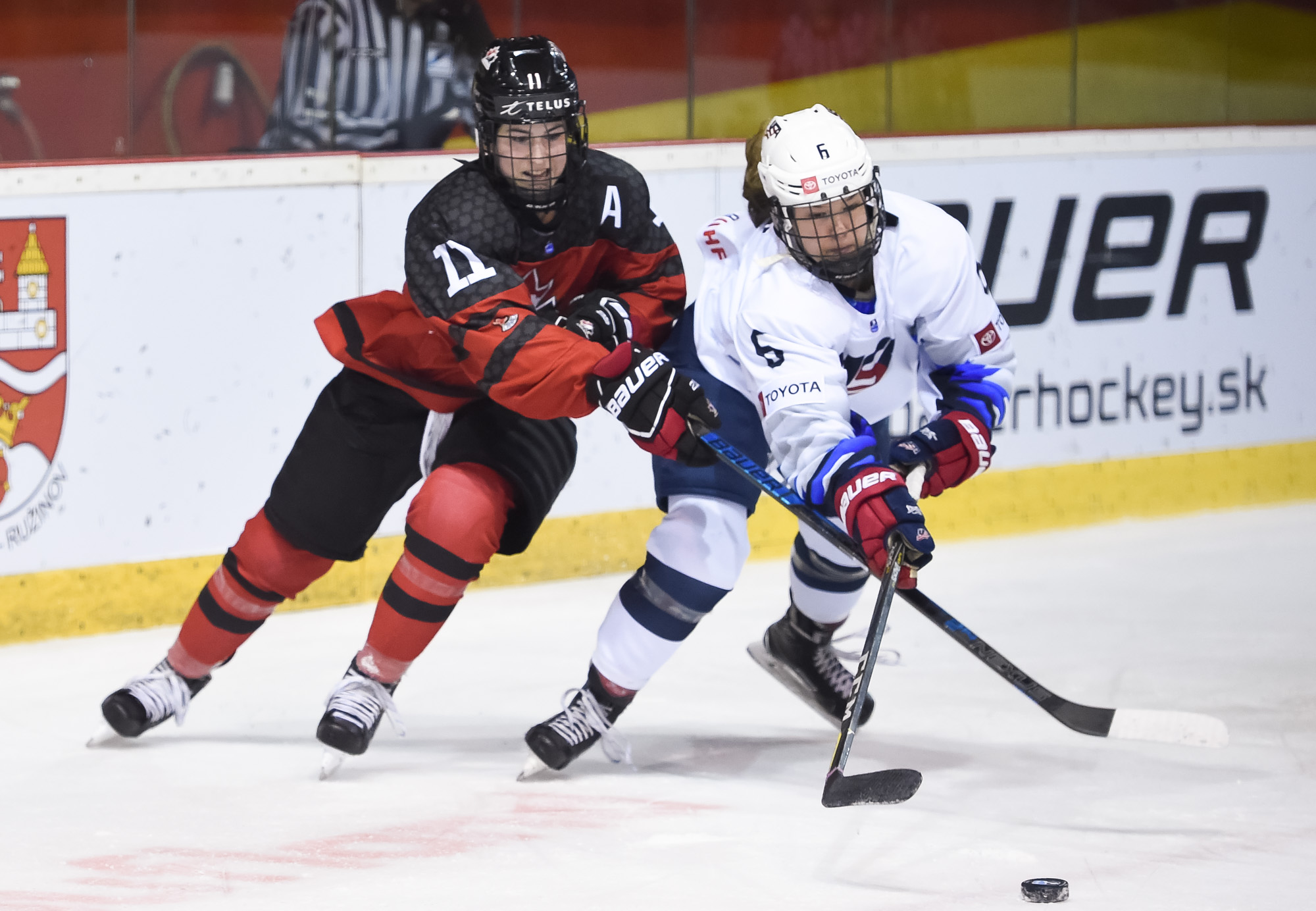
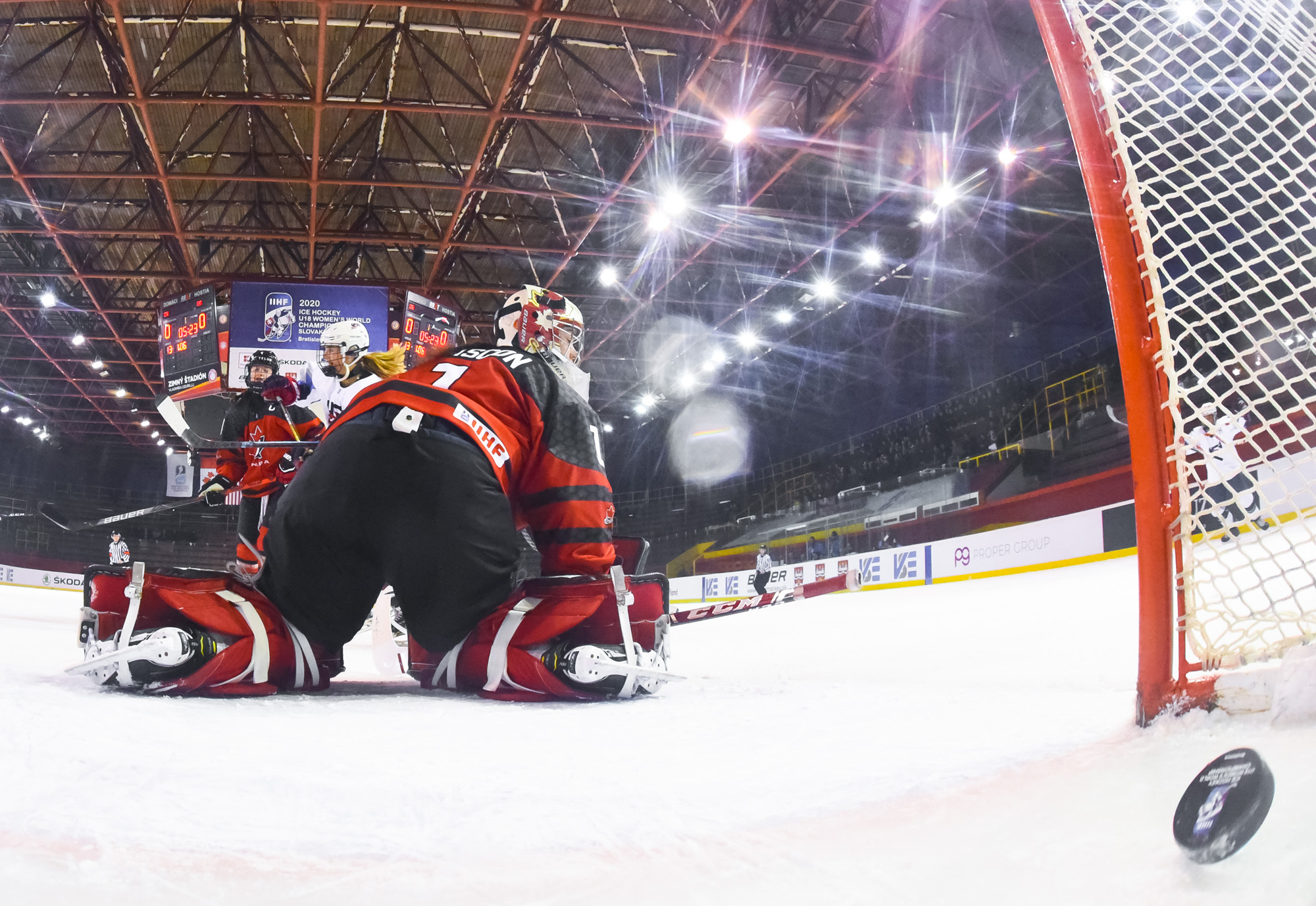
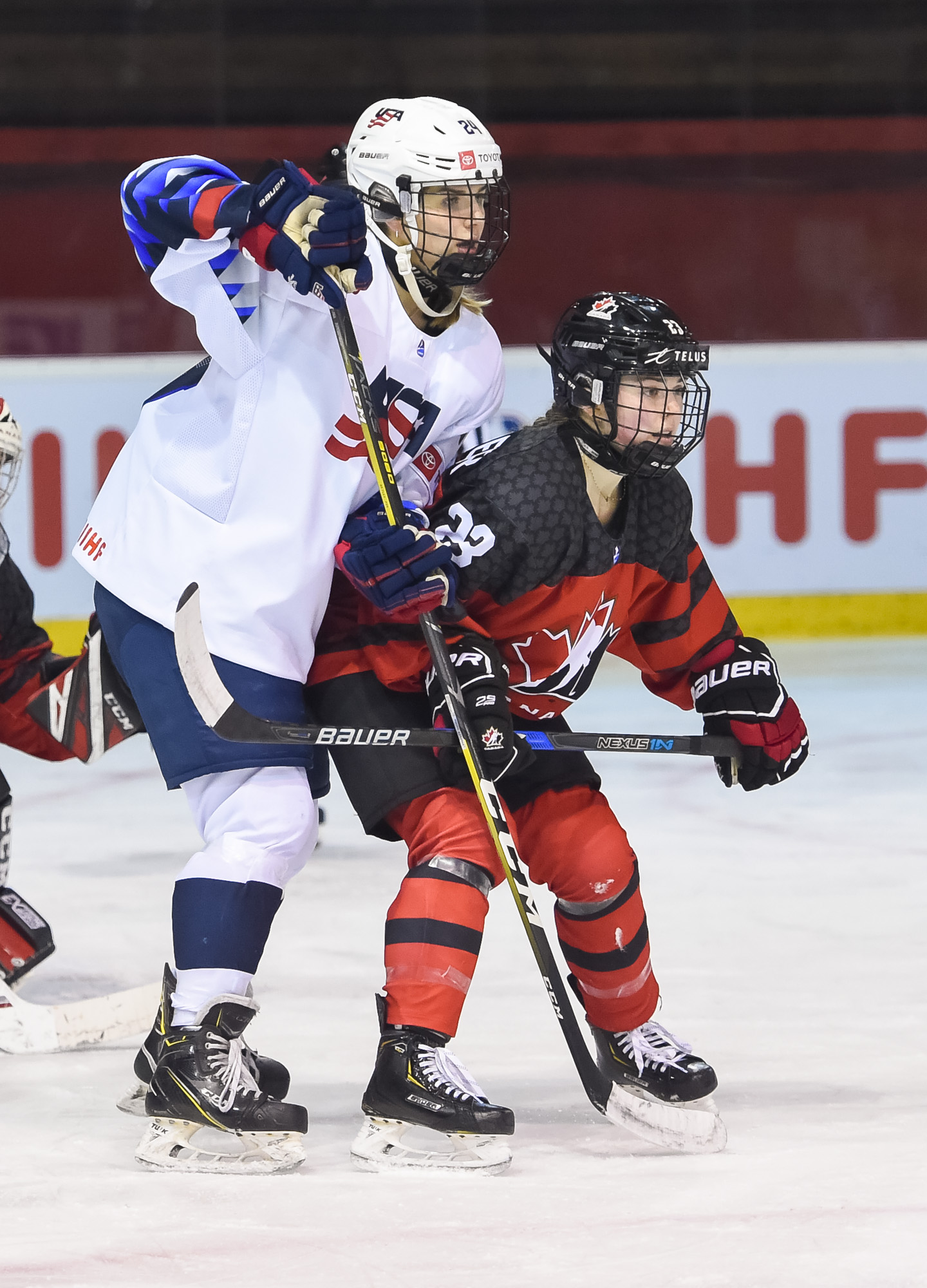
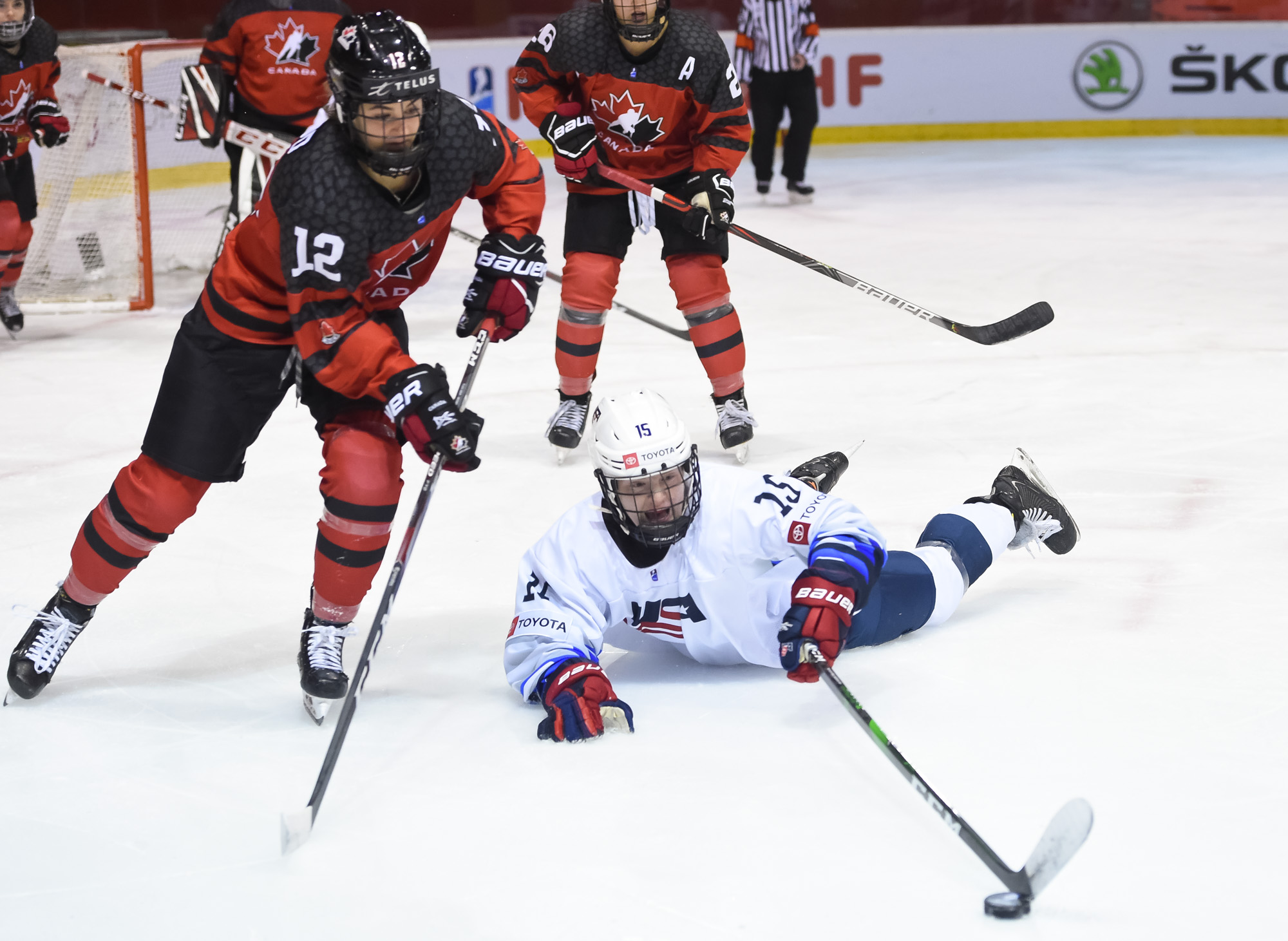
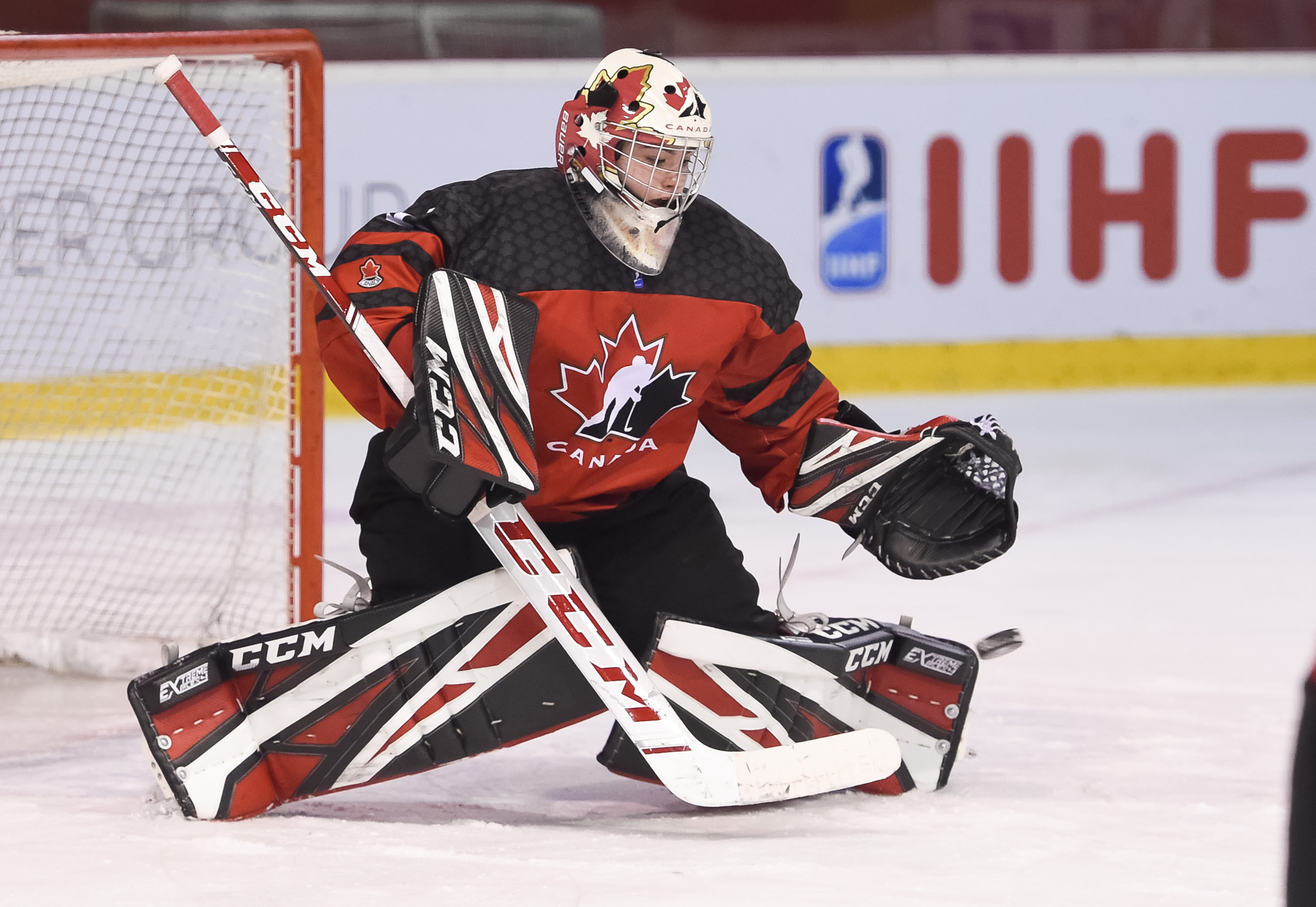
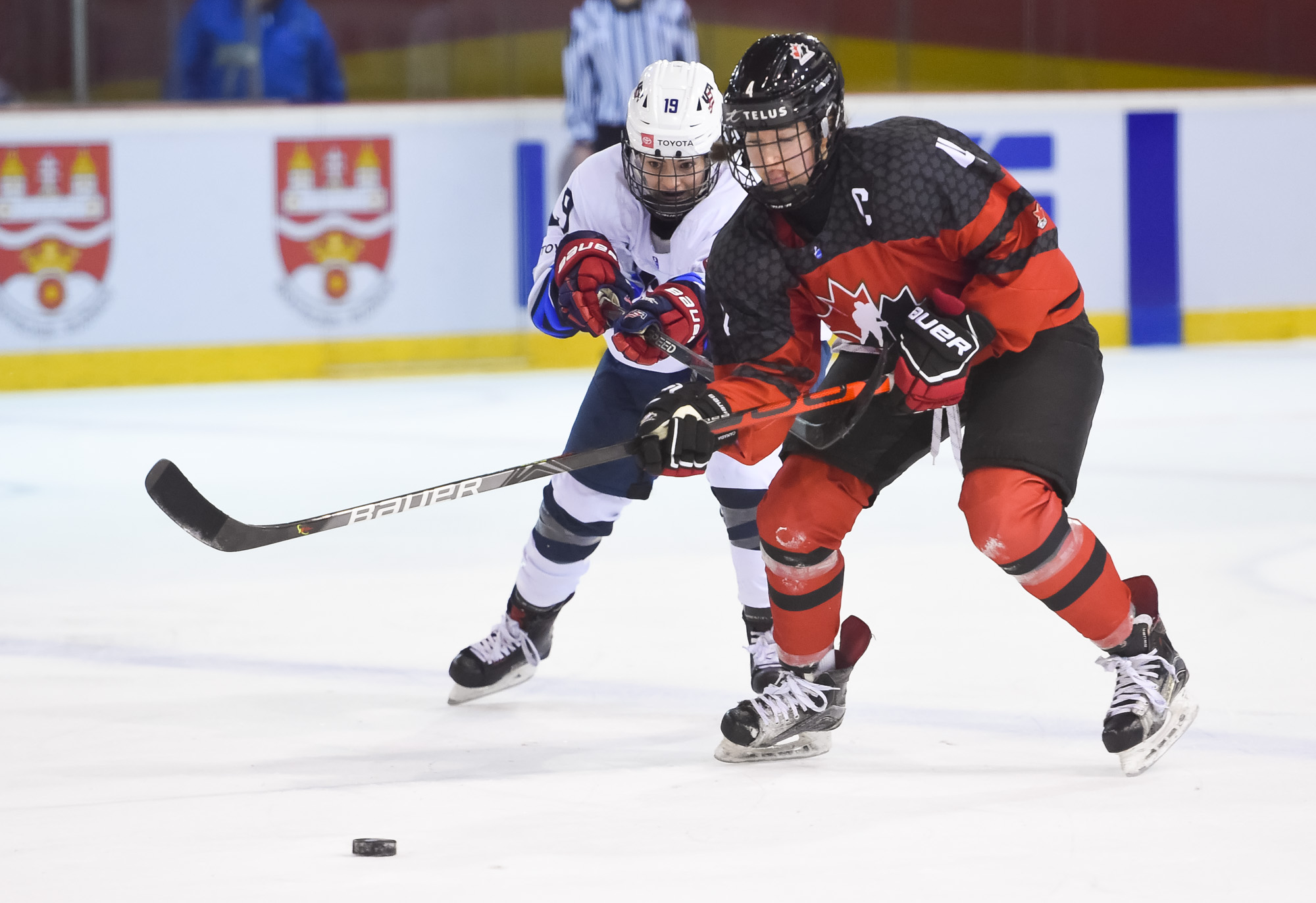
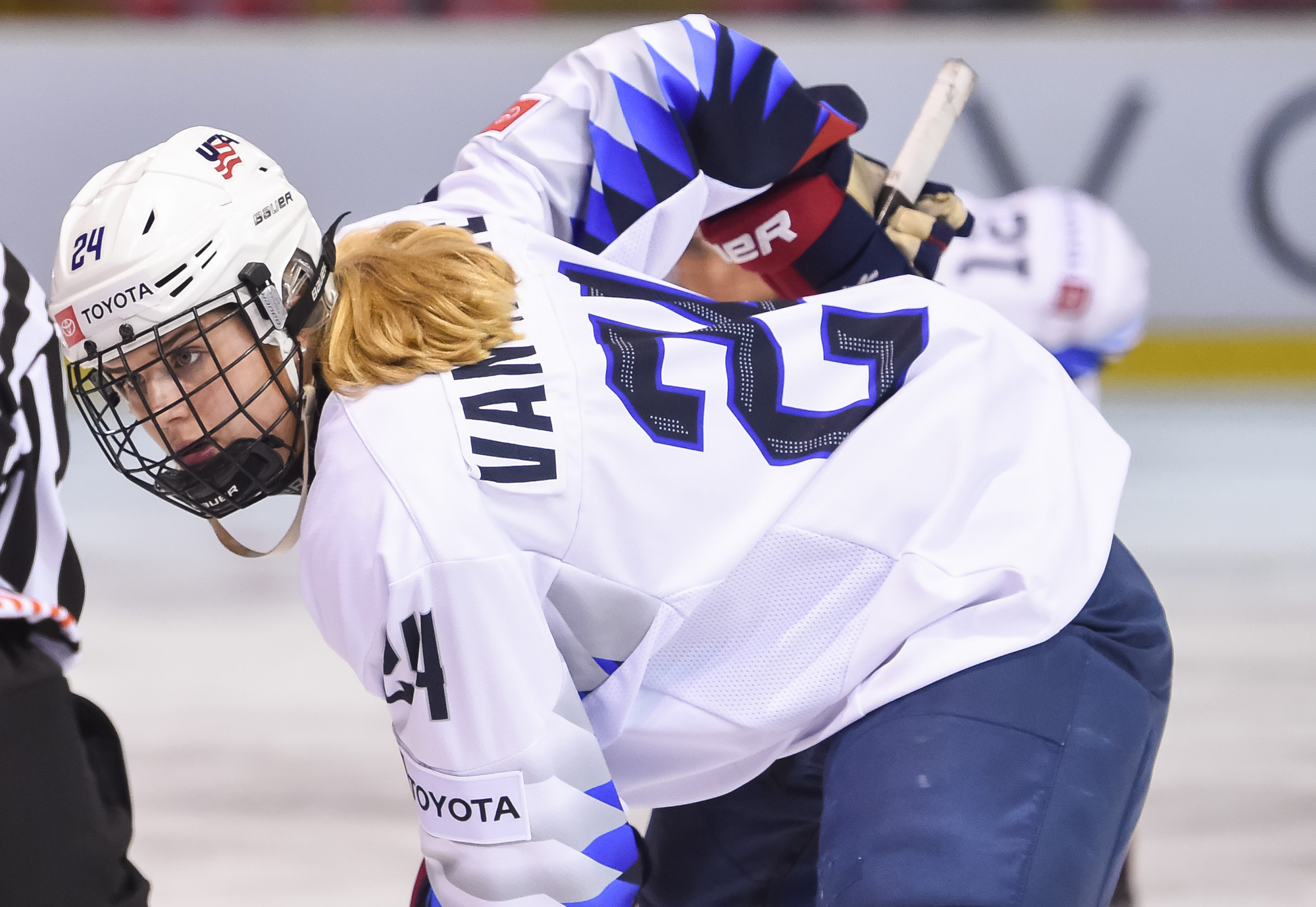
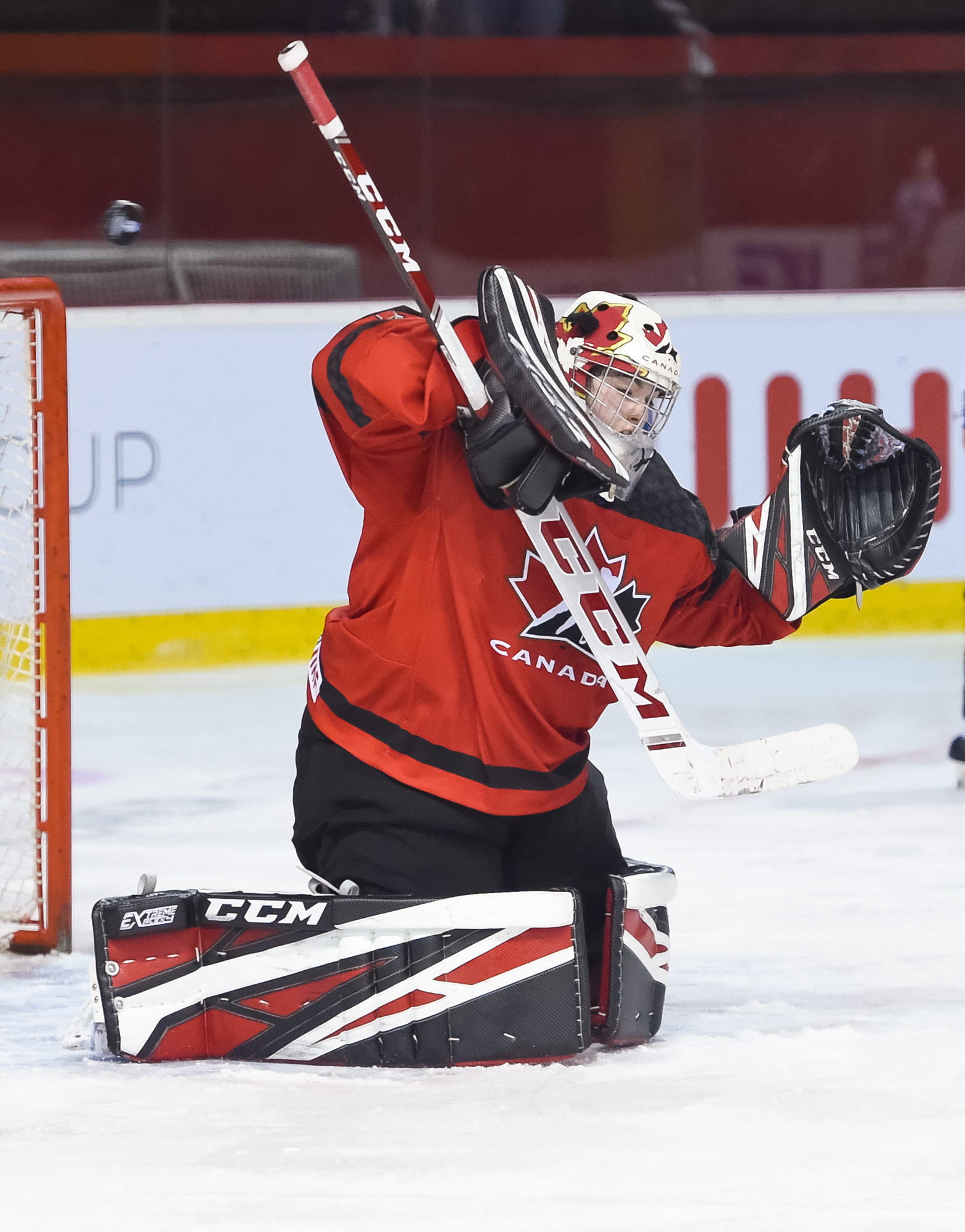
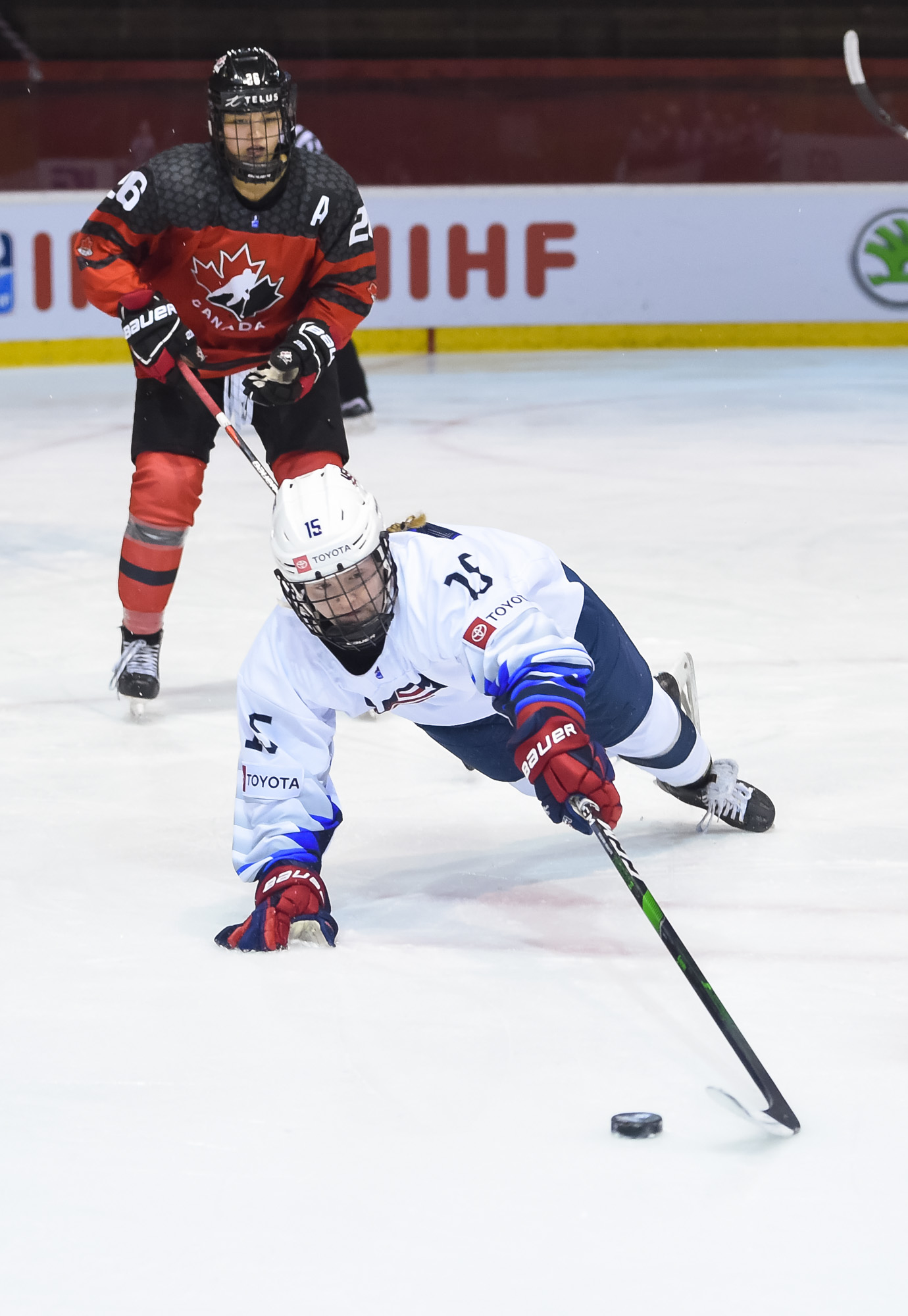
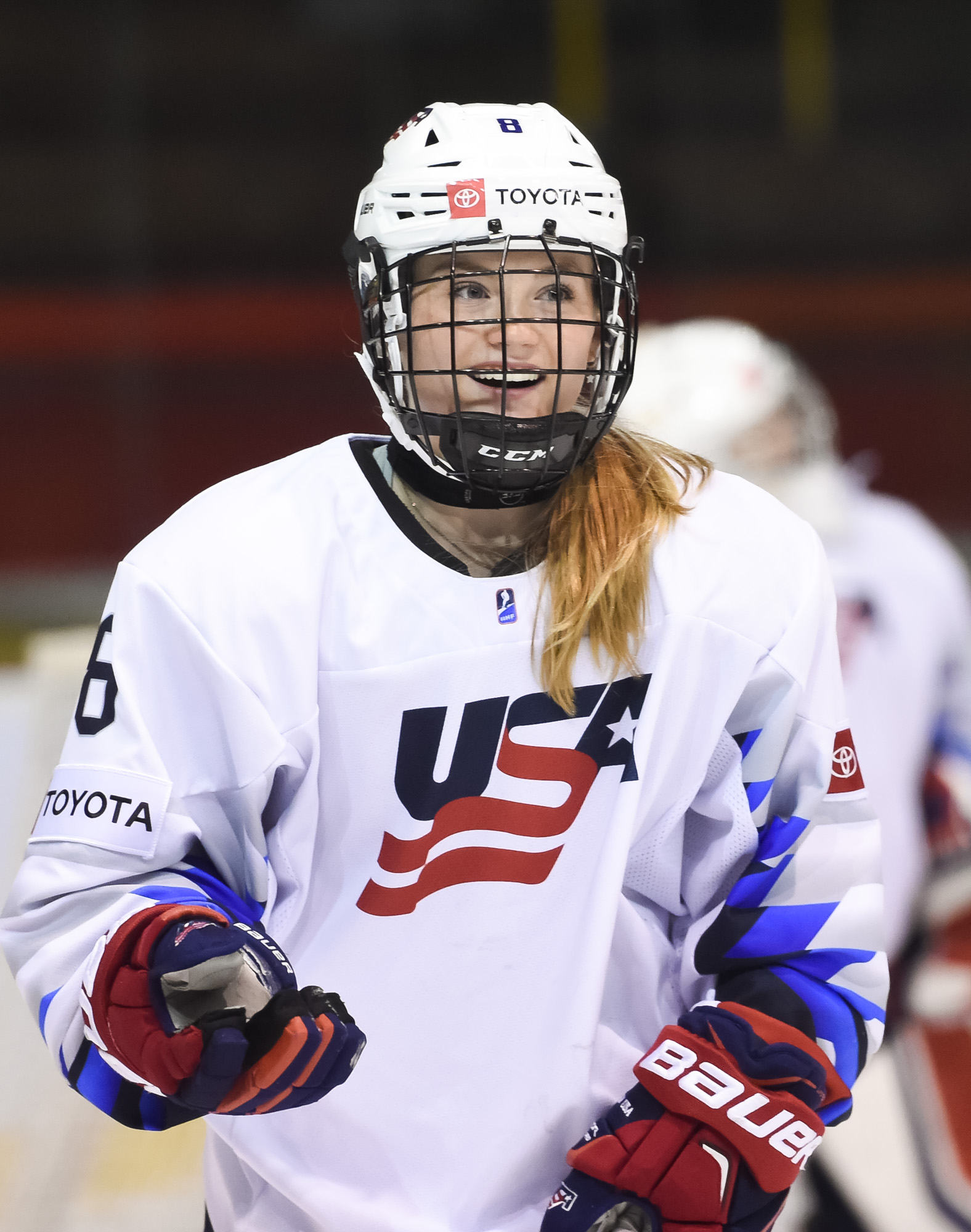
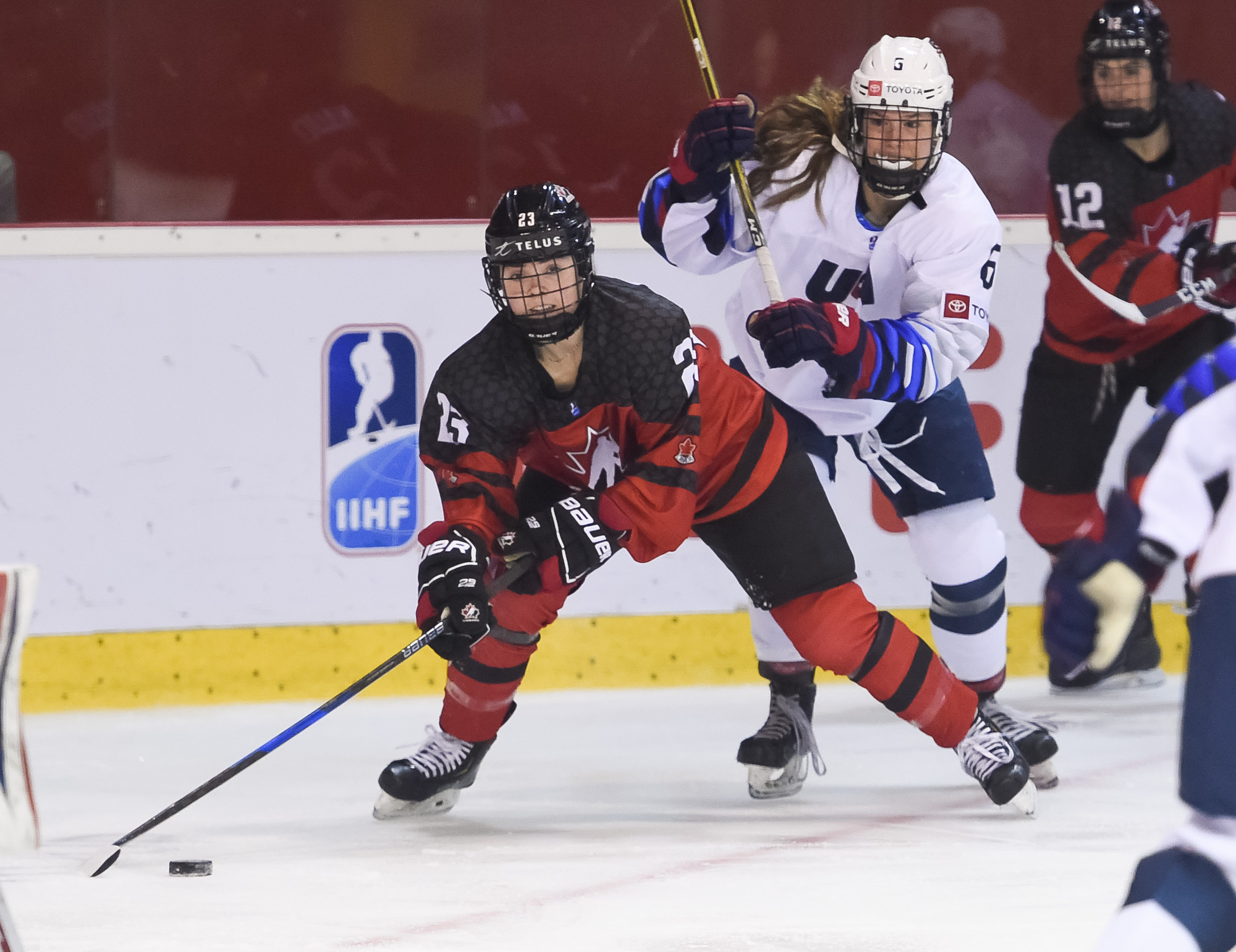
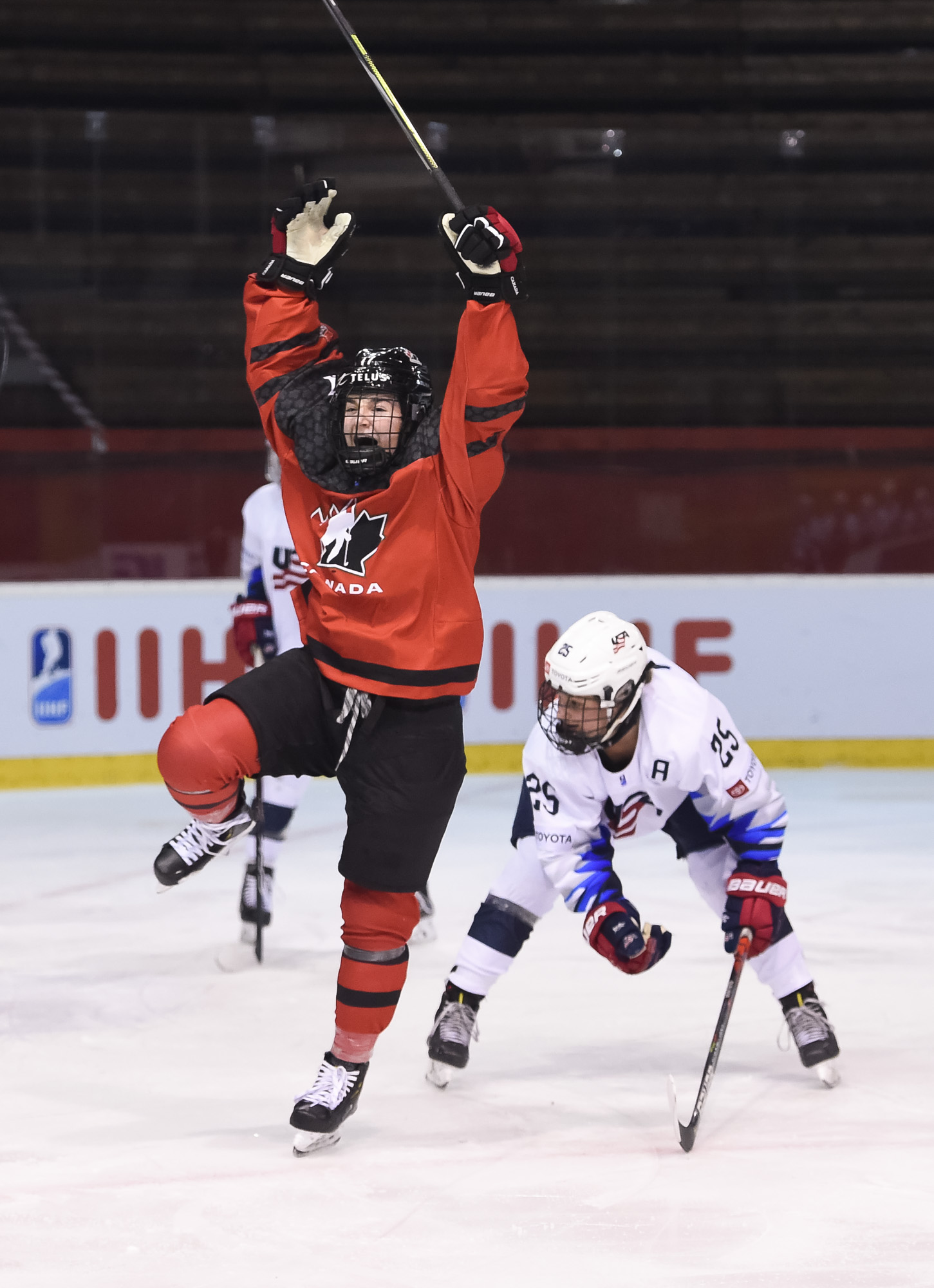
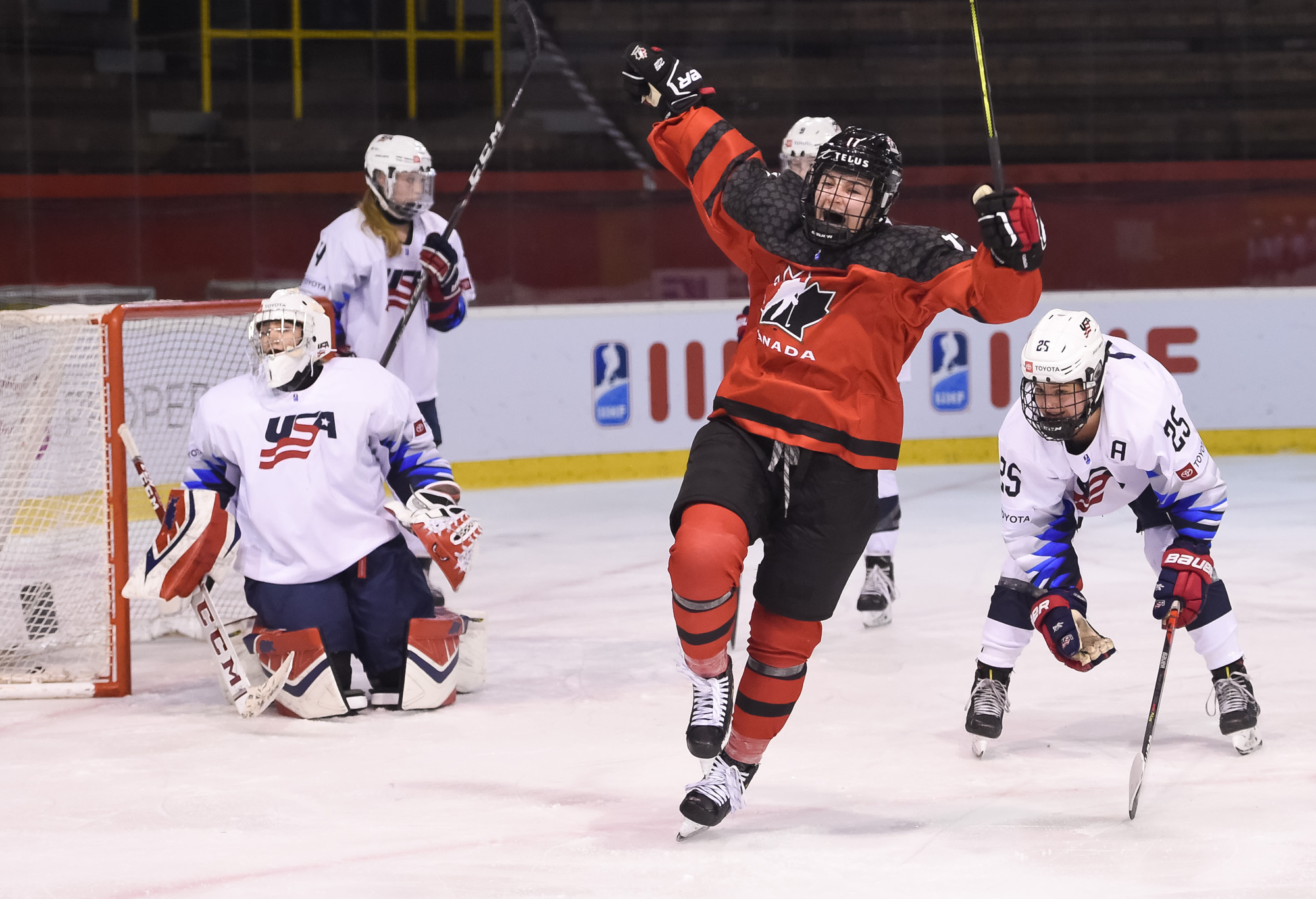
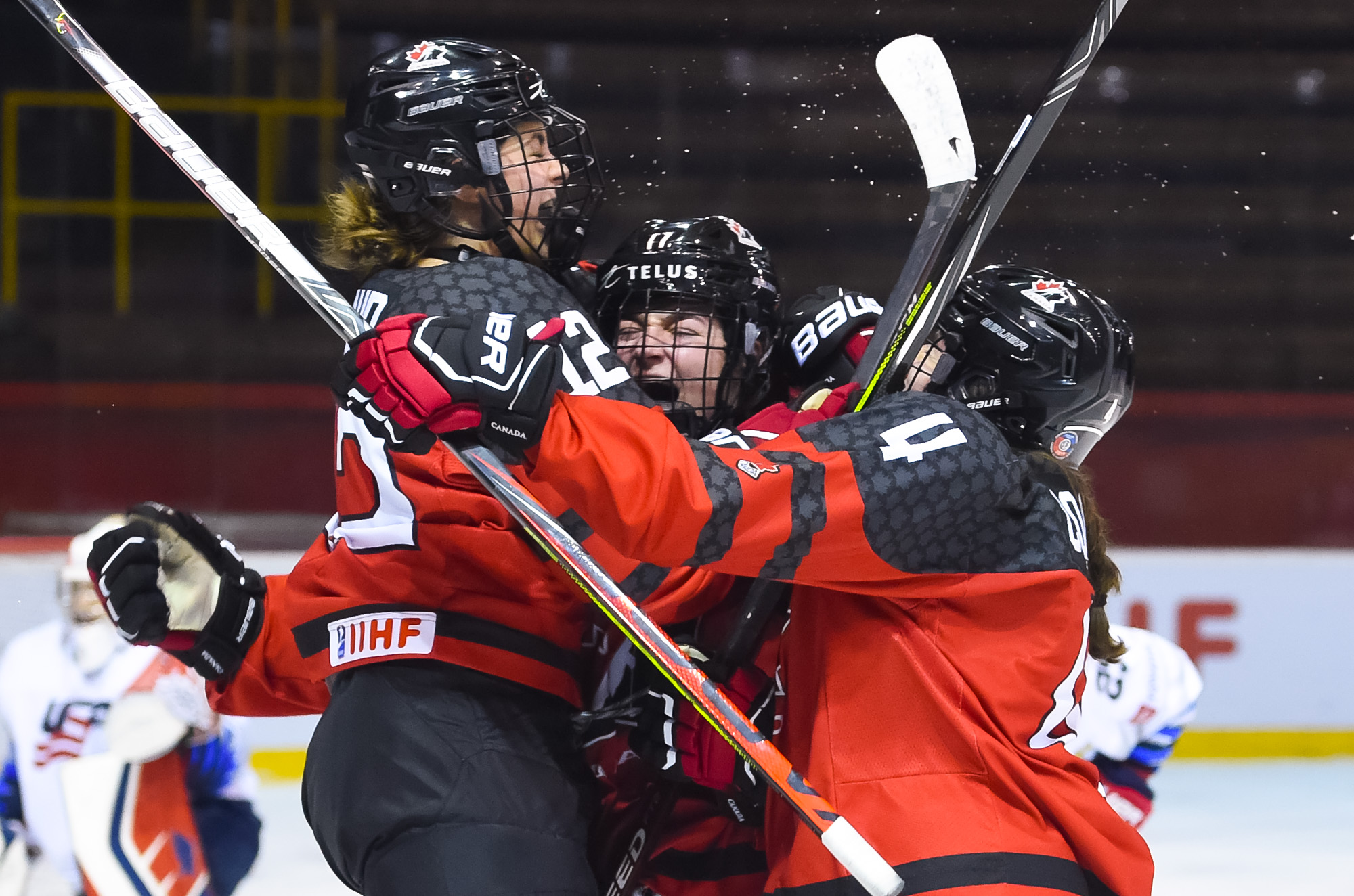
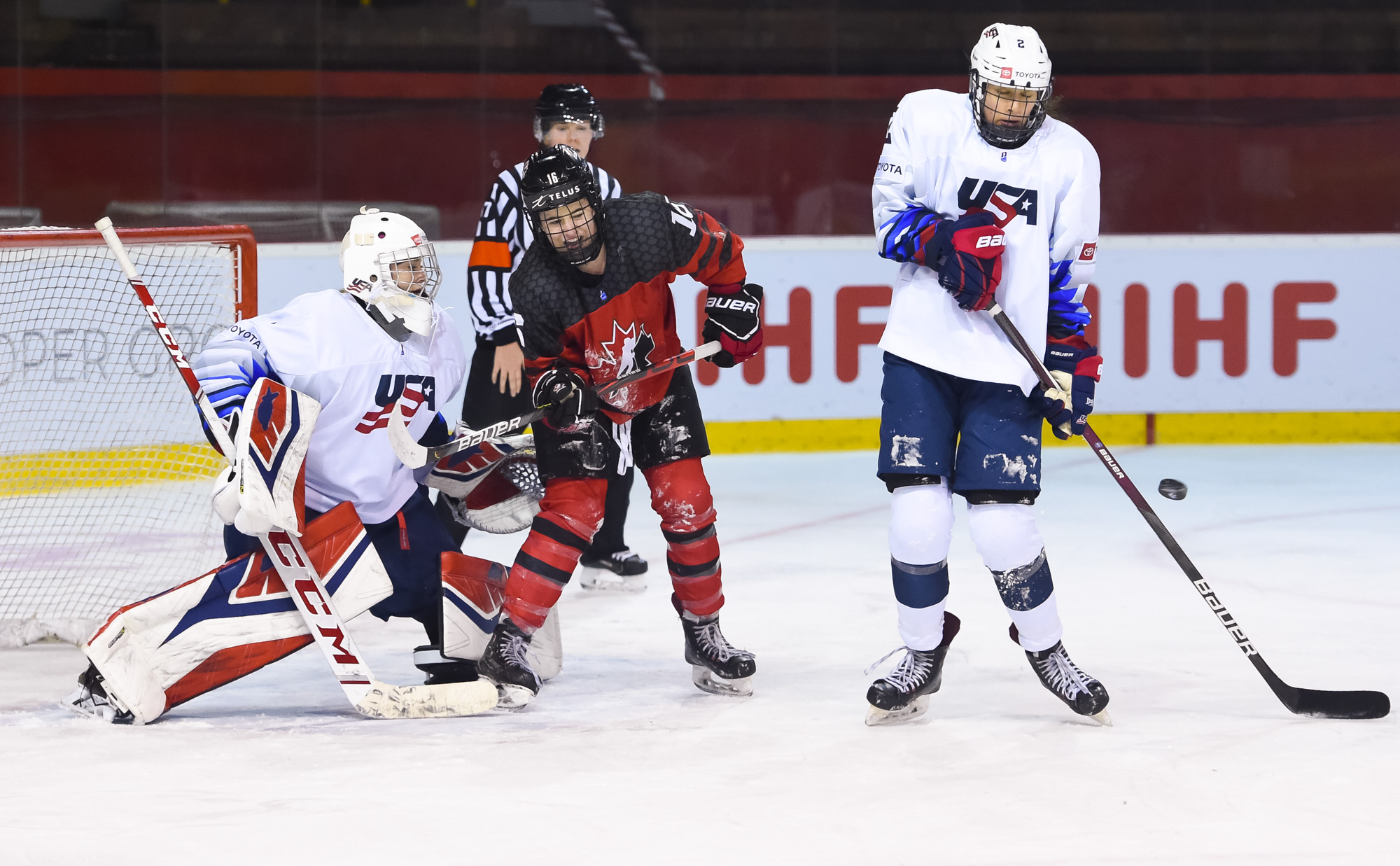
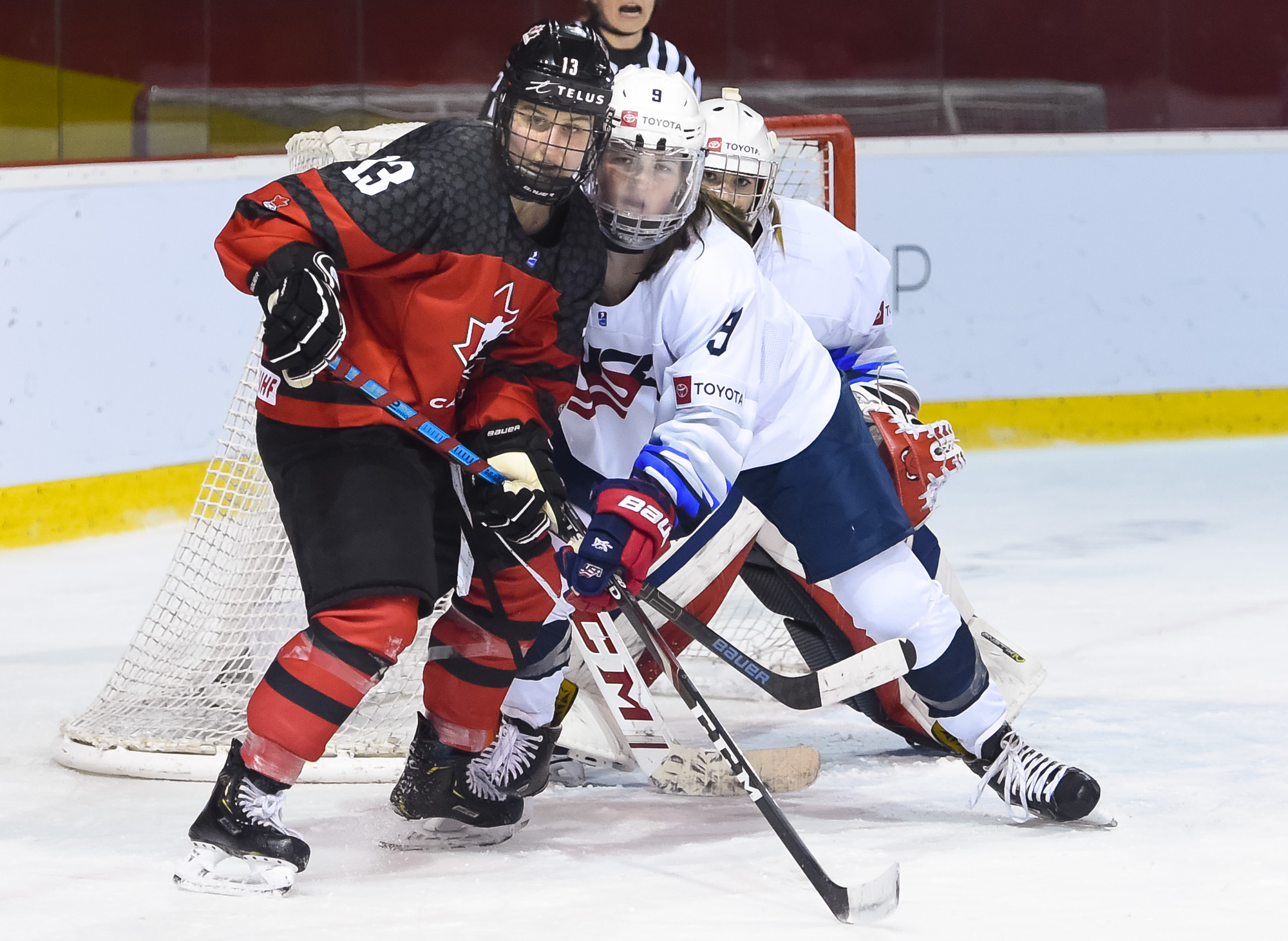
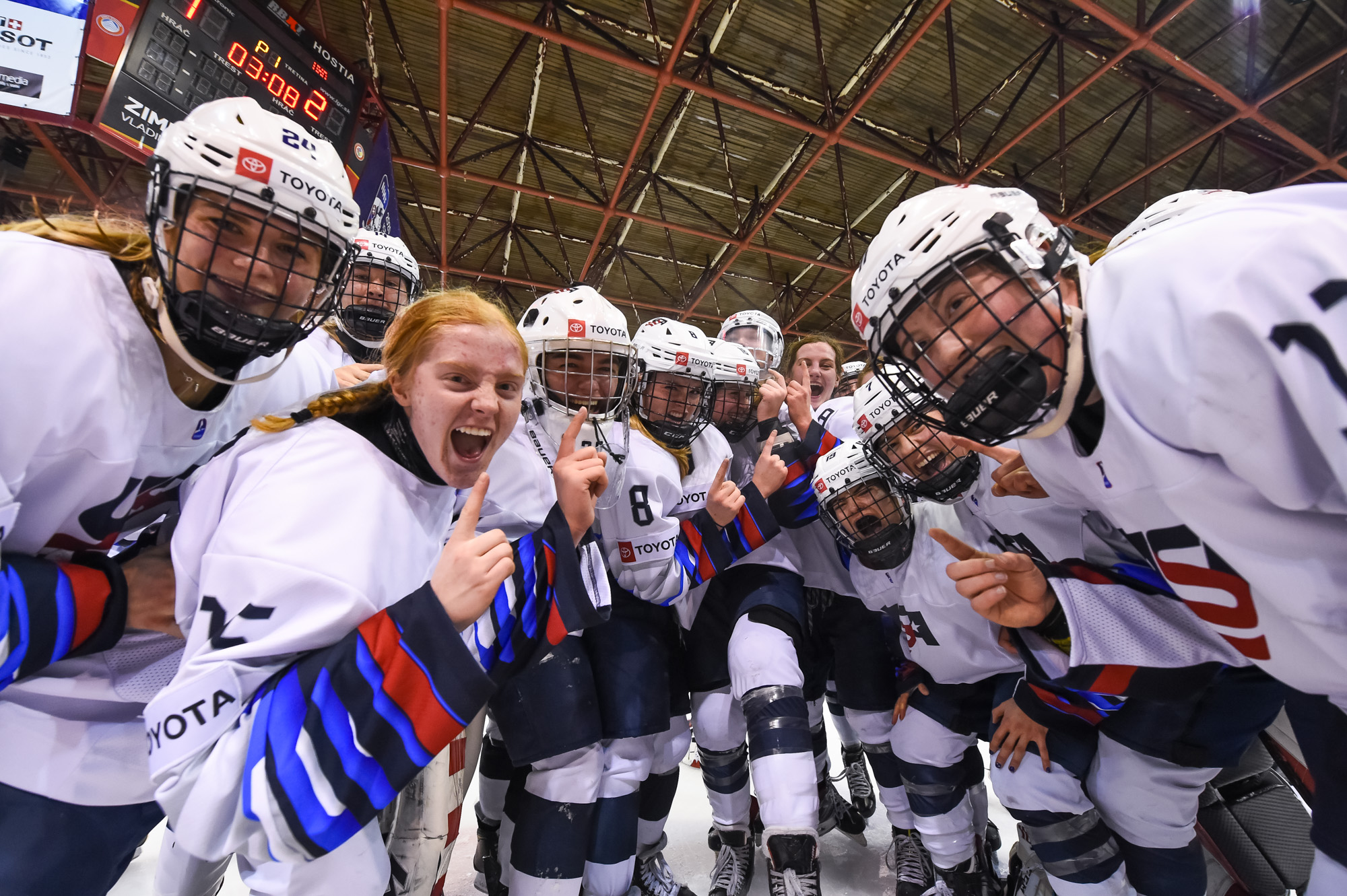
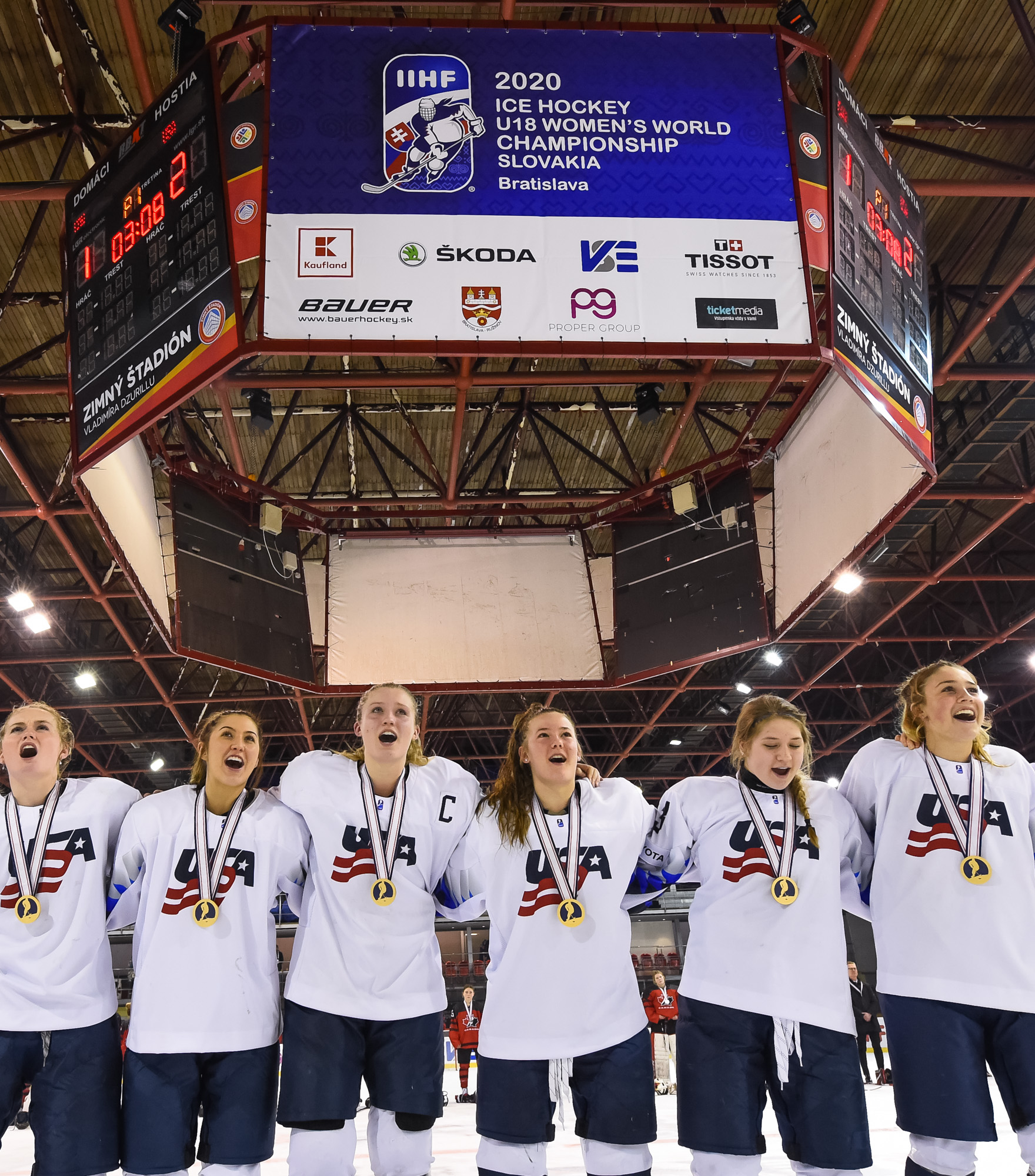
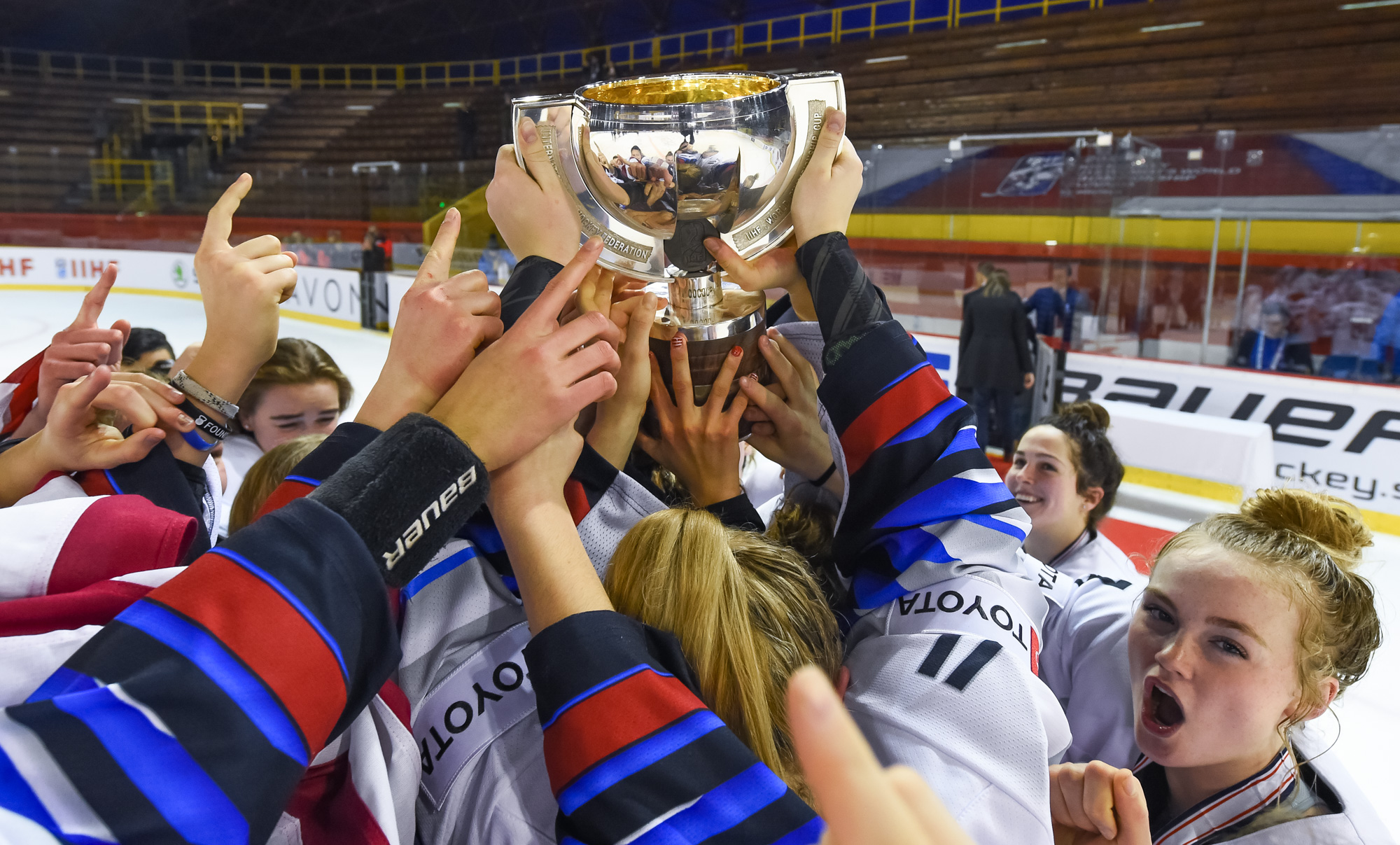
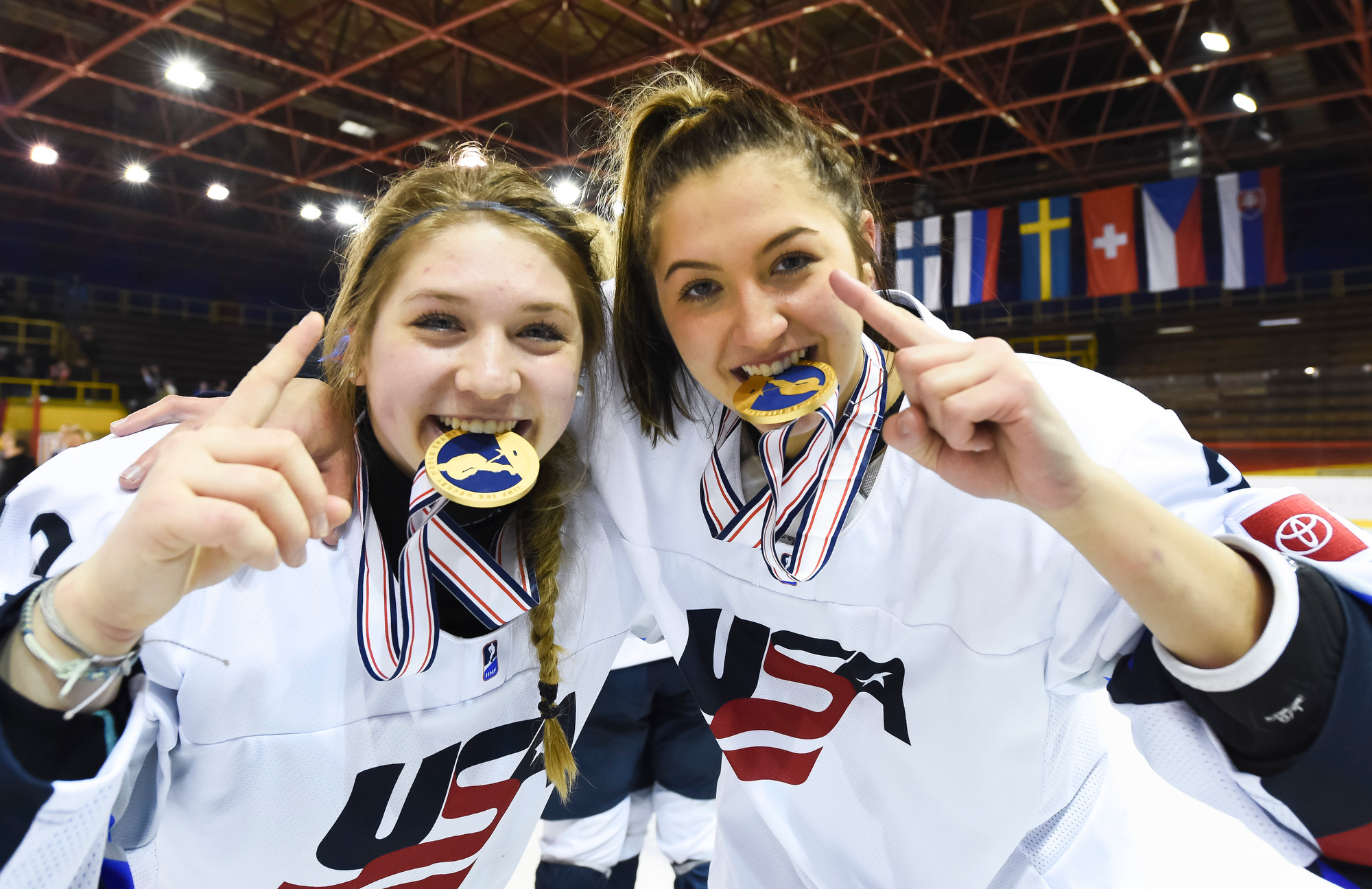
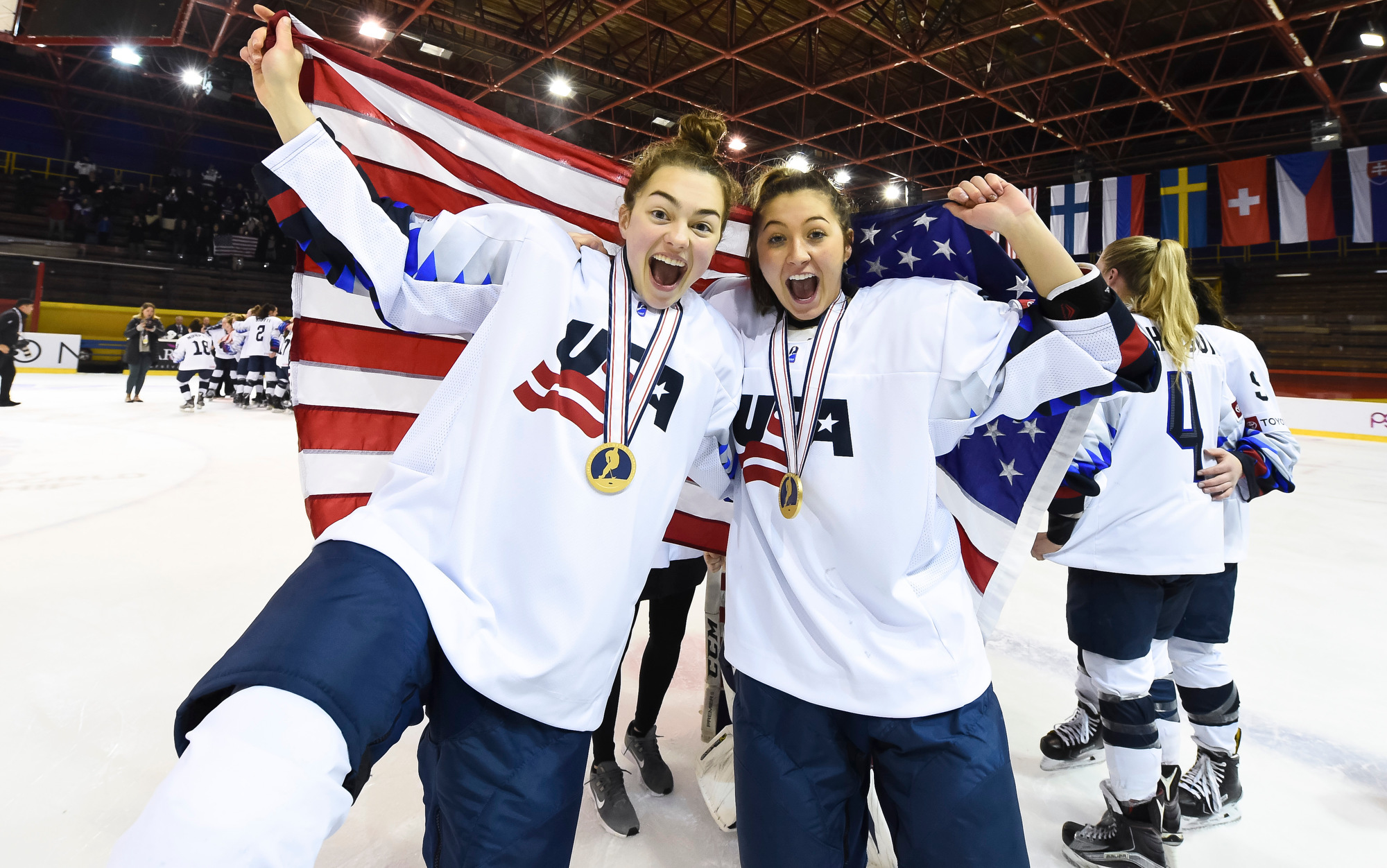
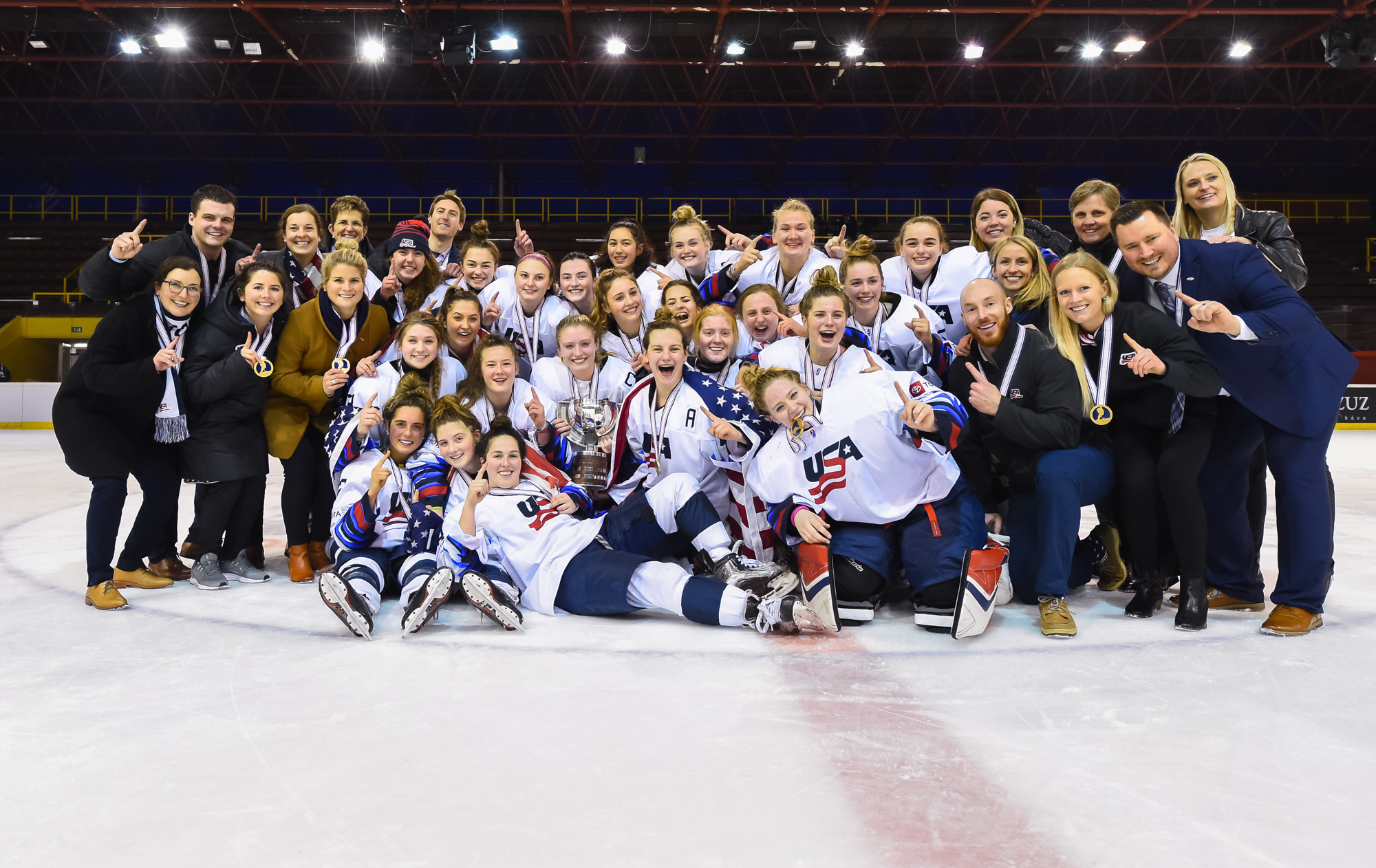
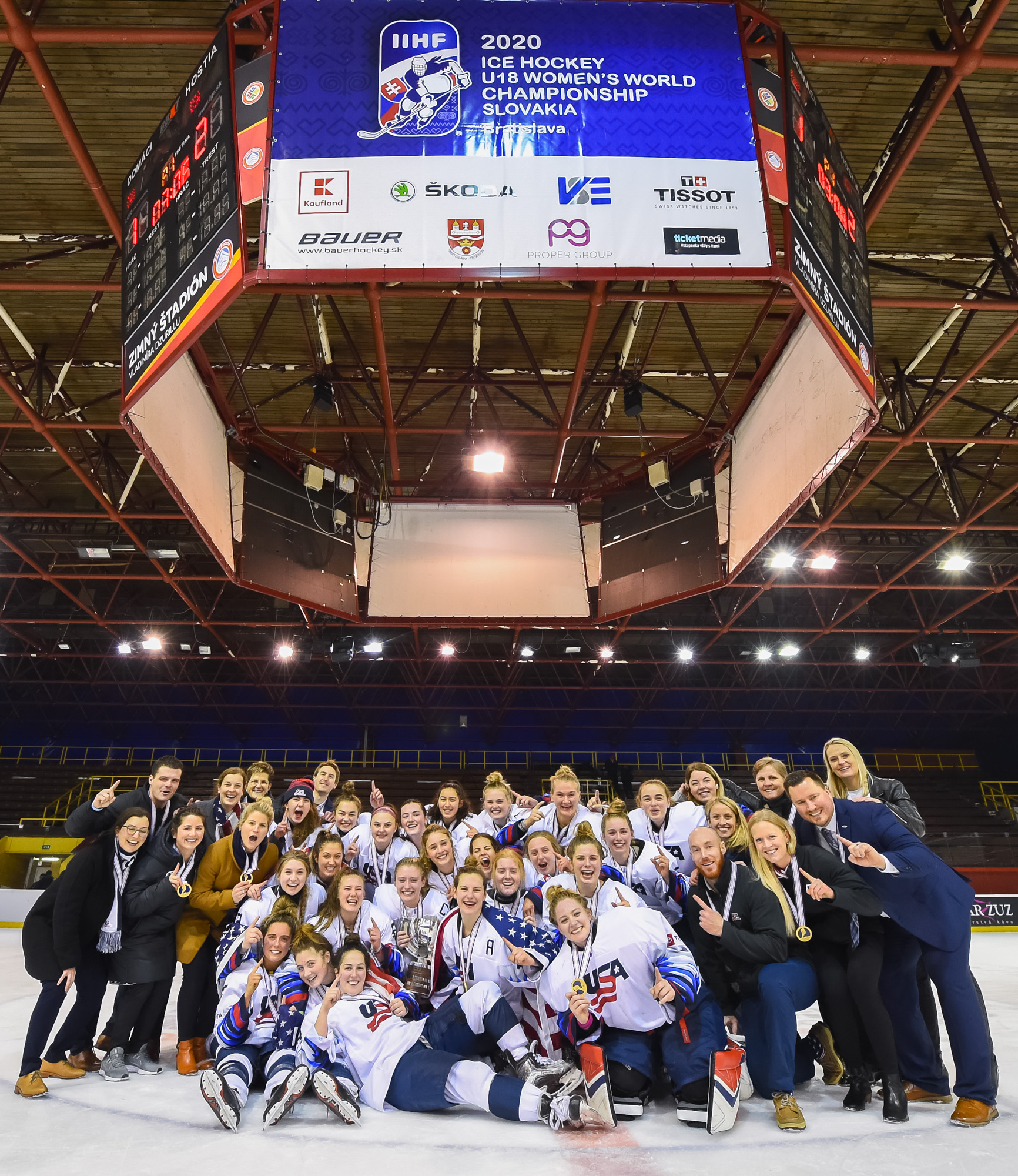
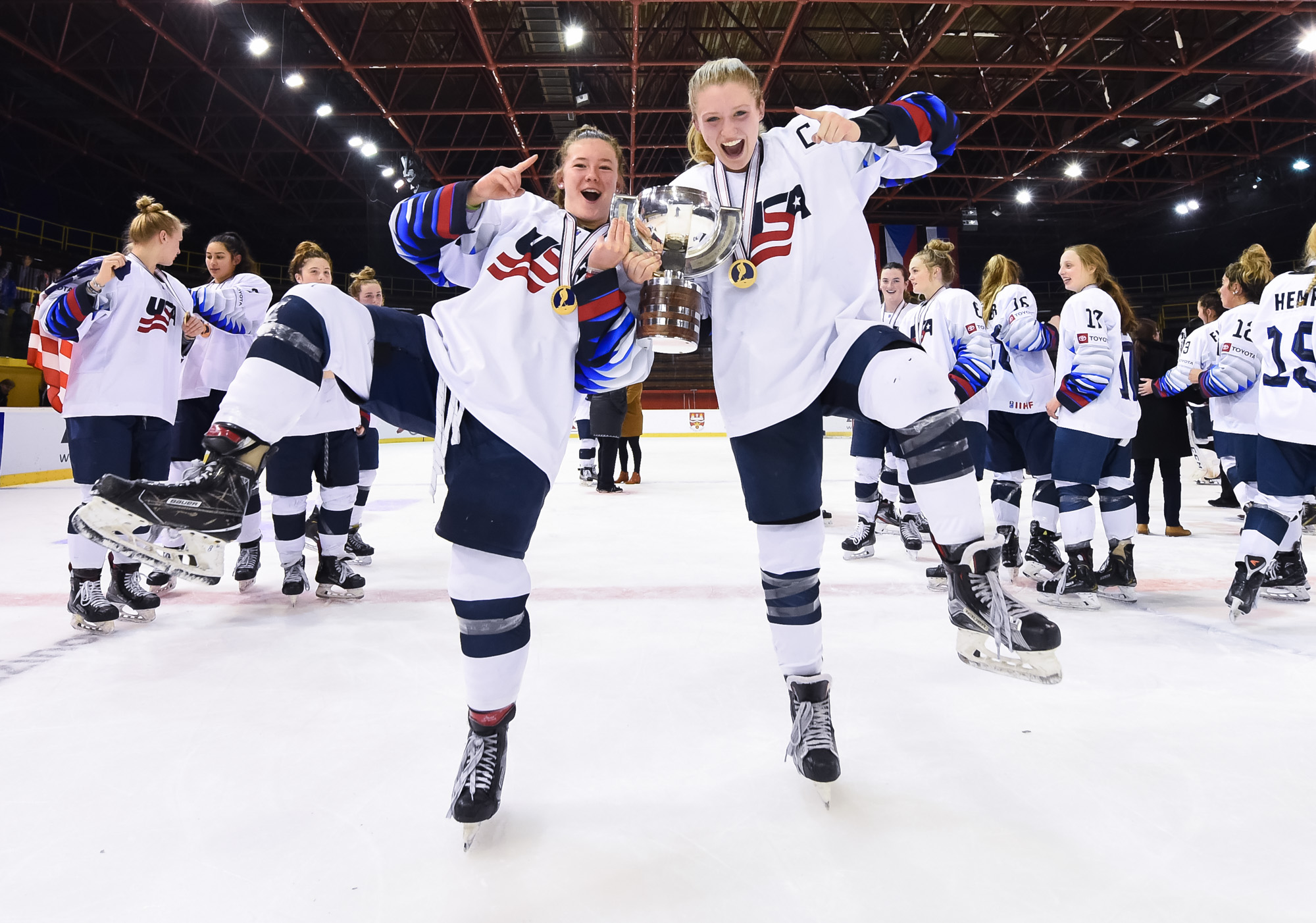
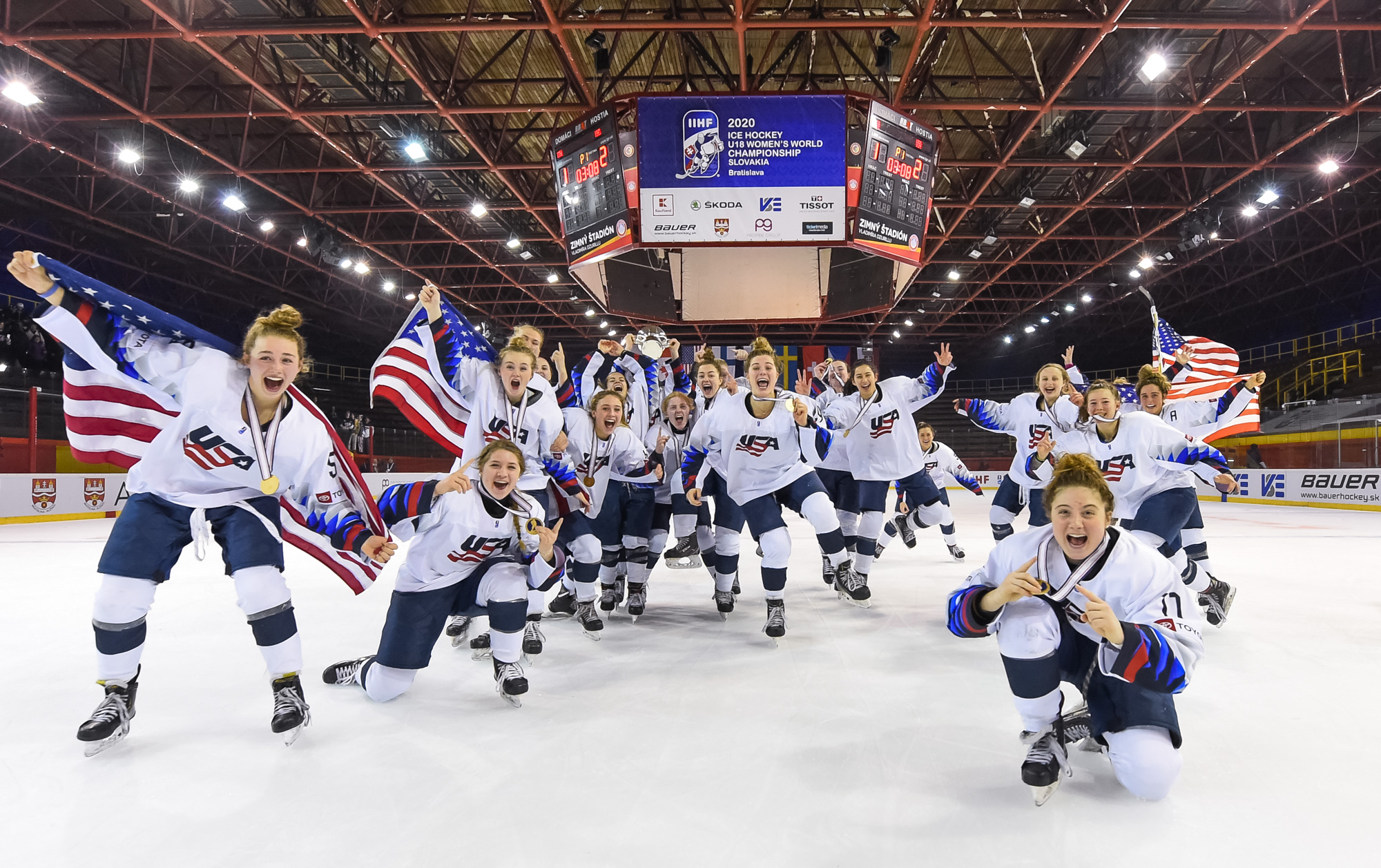
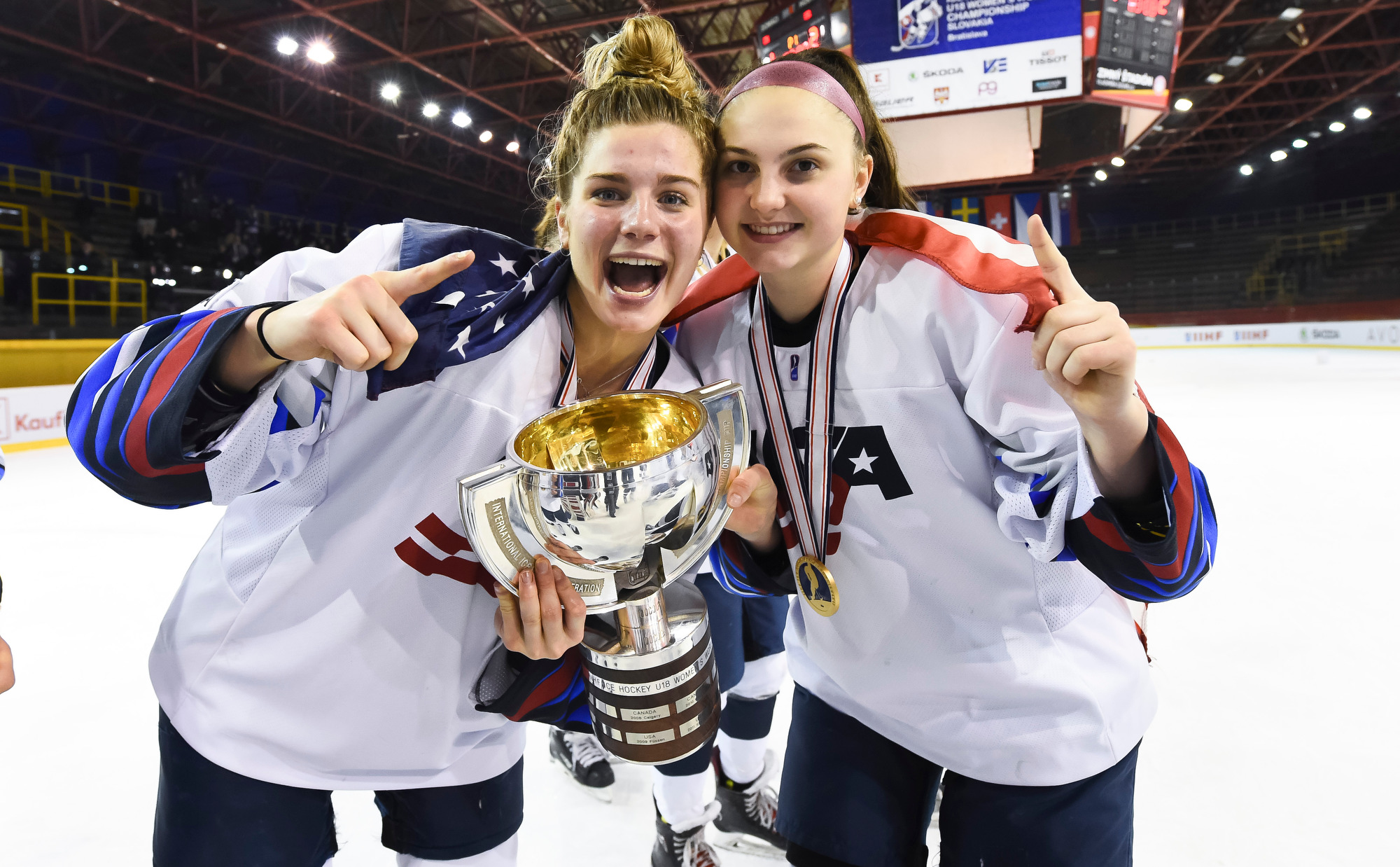
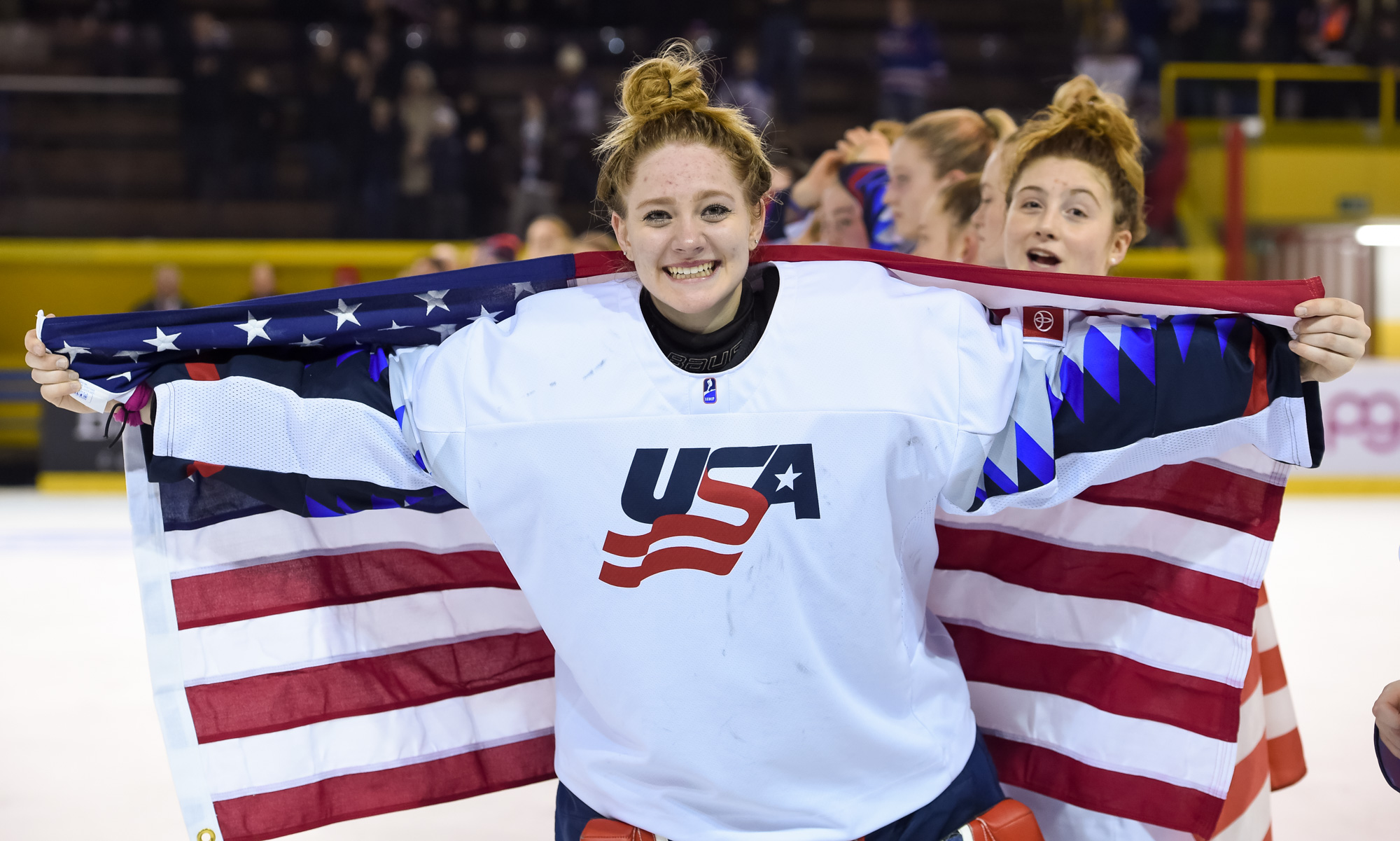

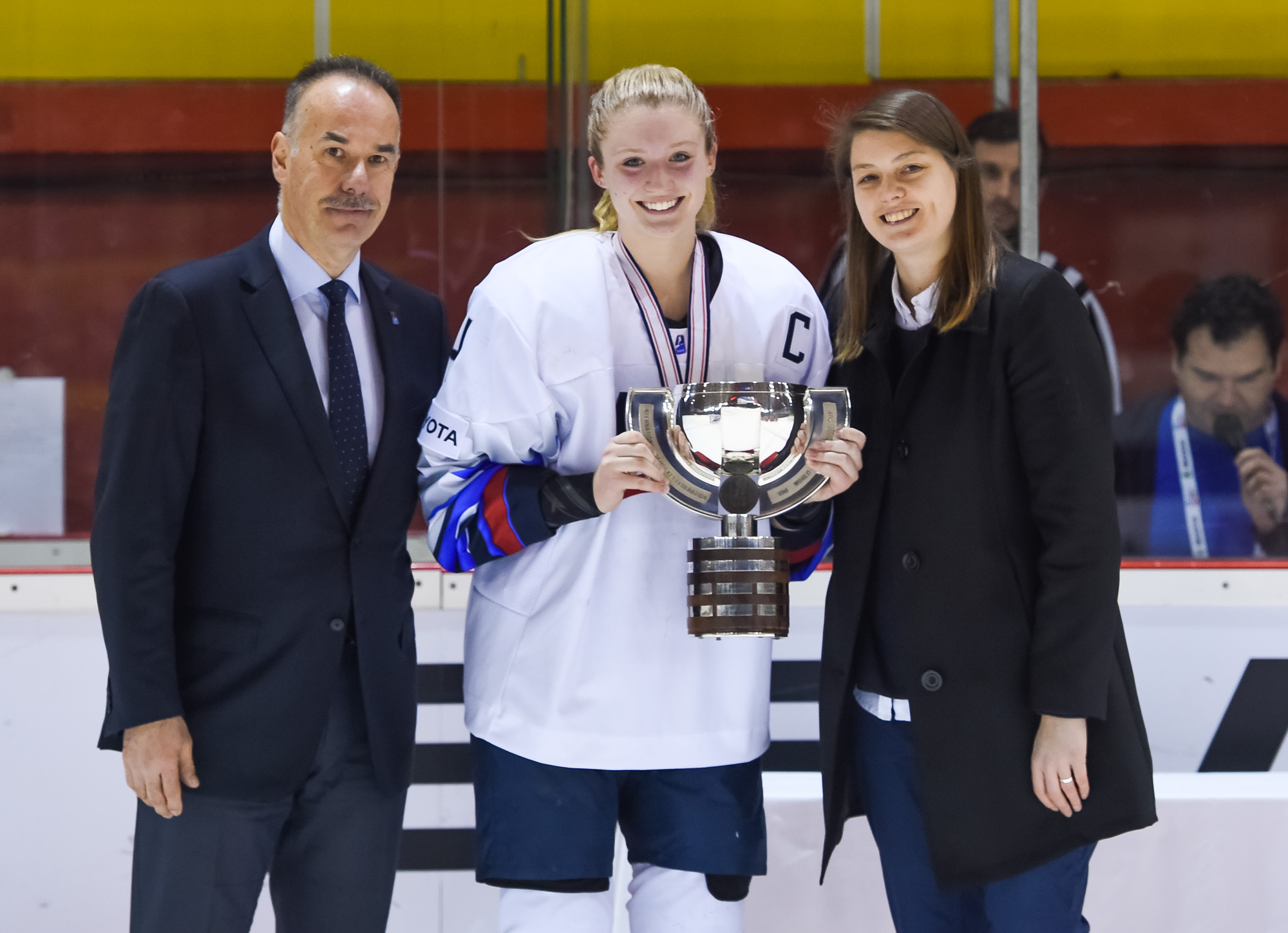
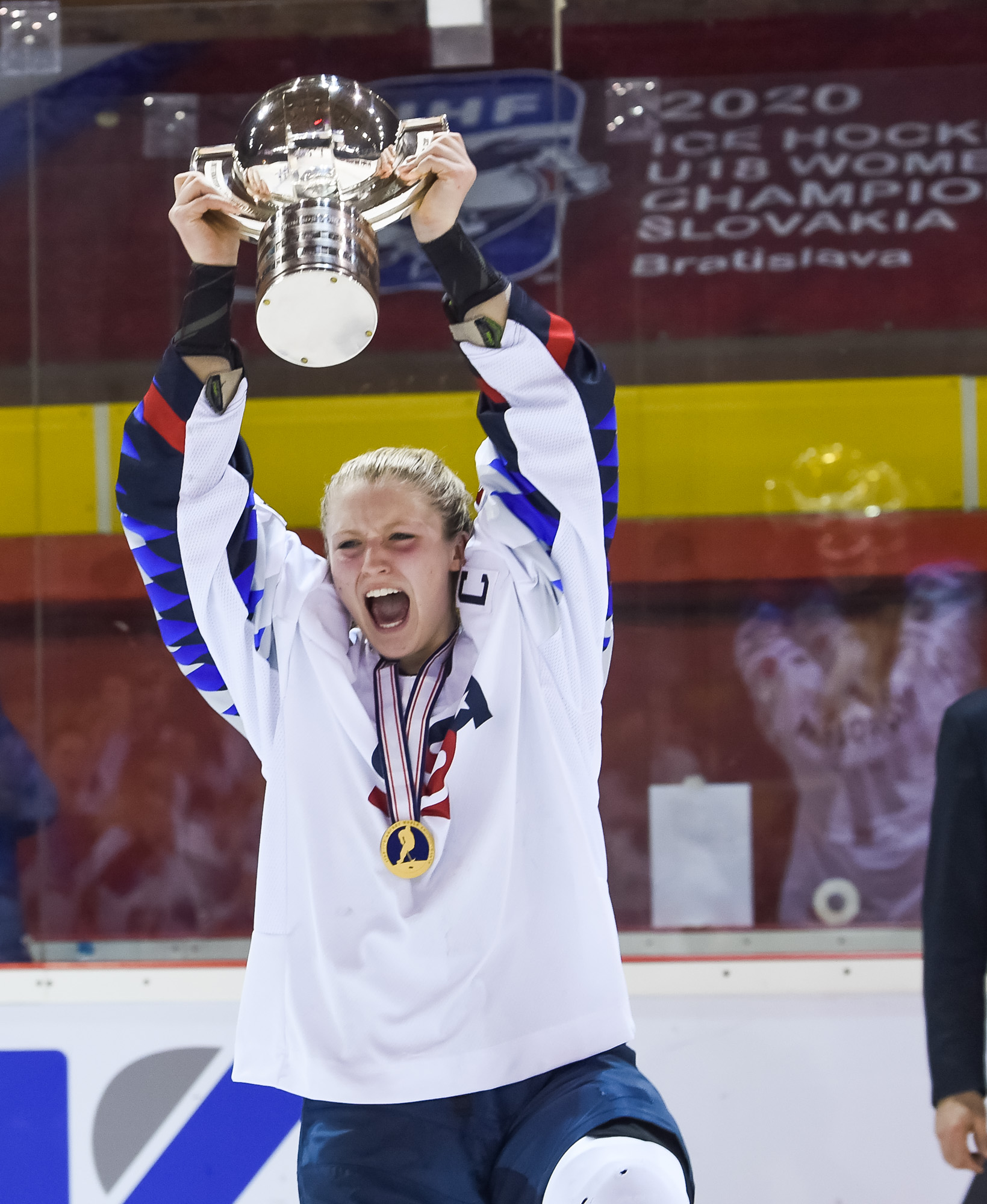
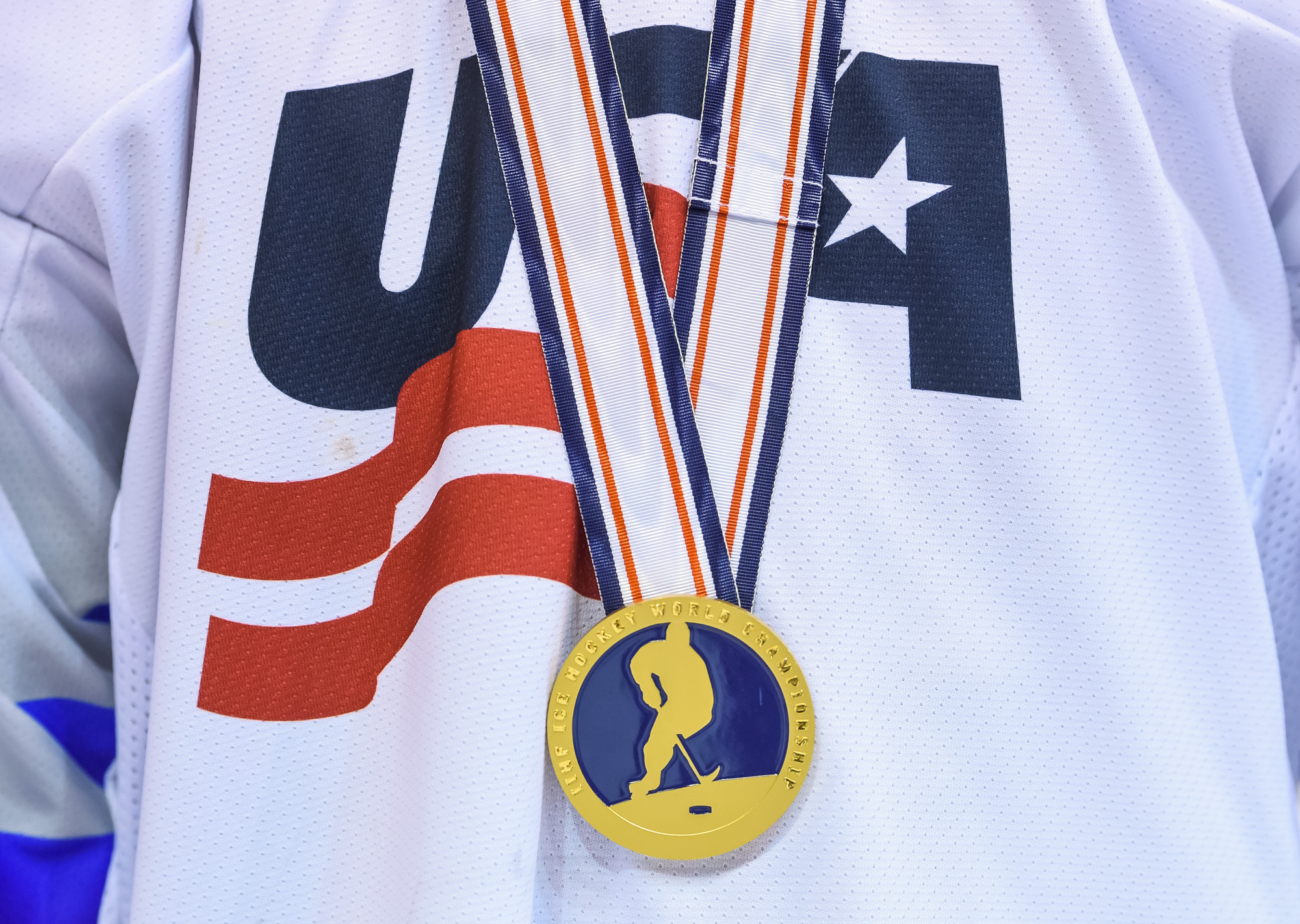
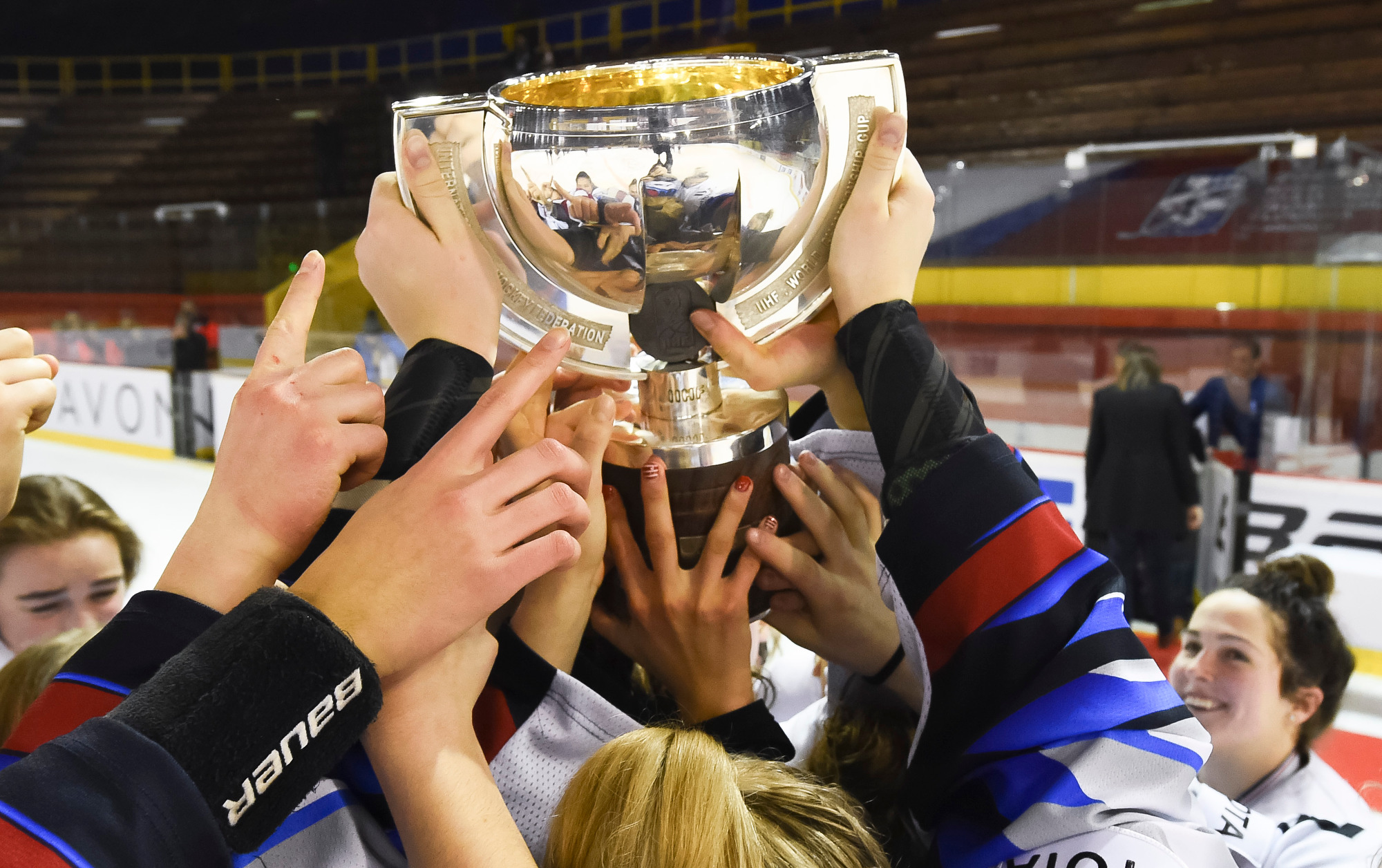
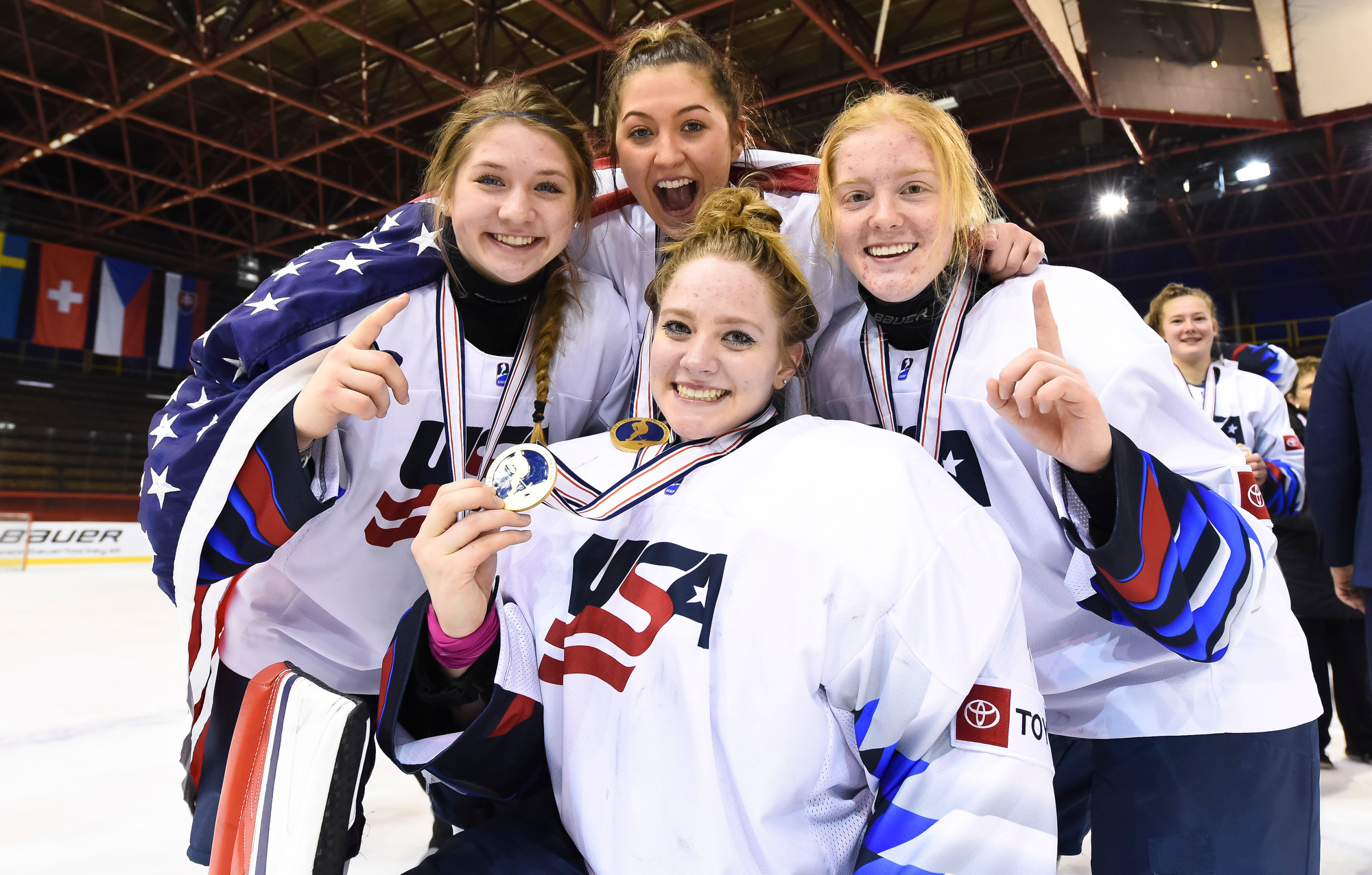
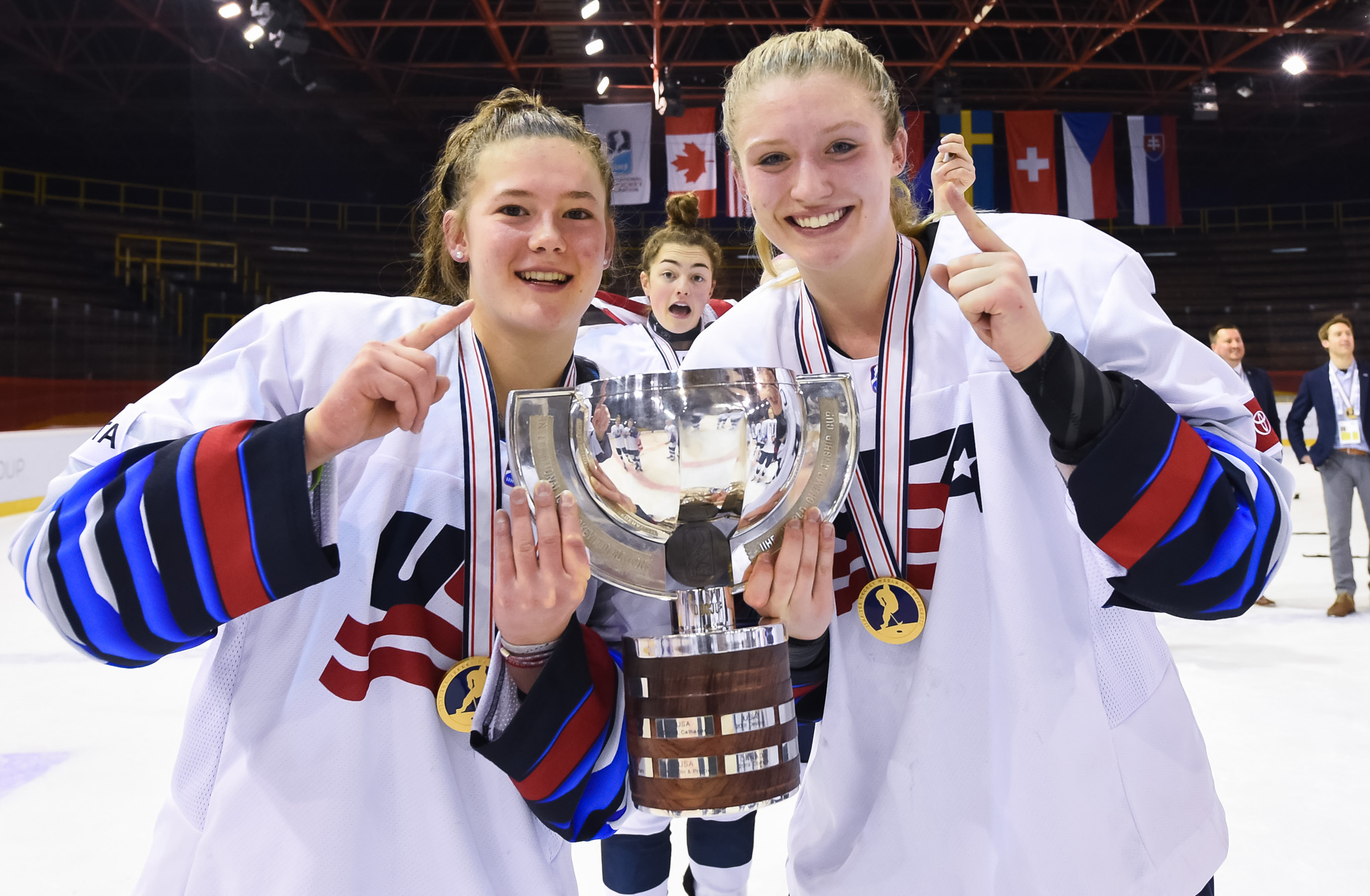
_1.jpg)
